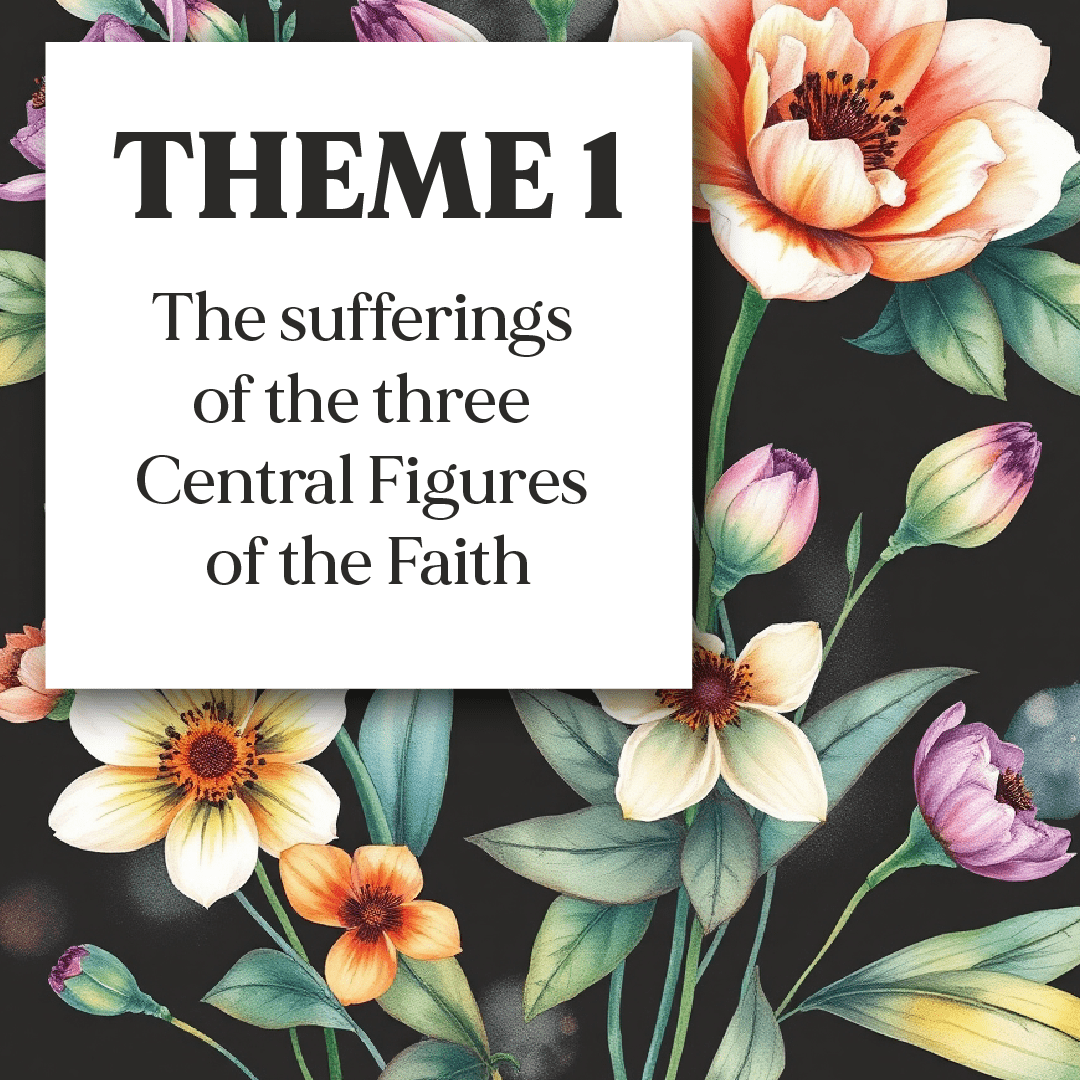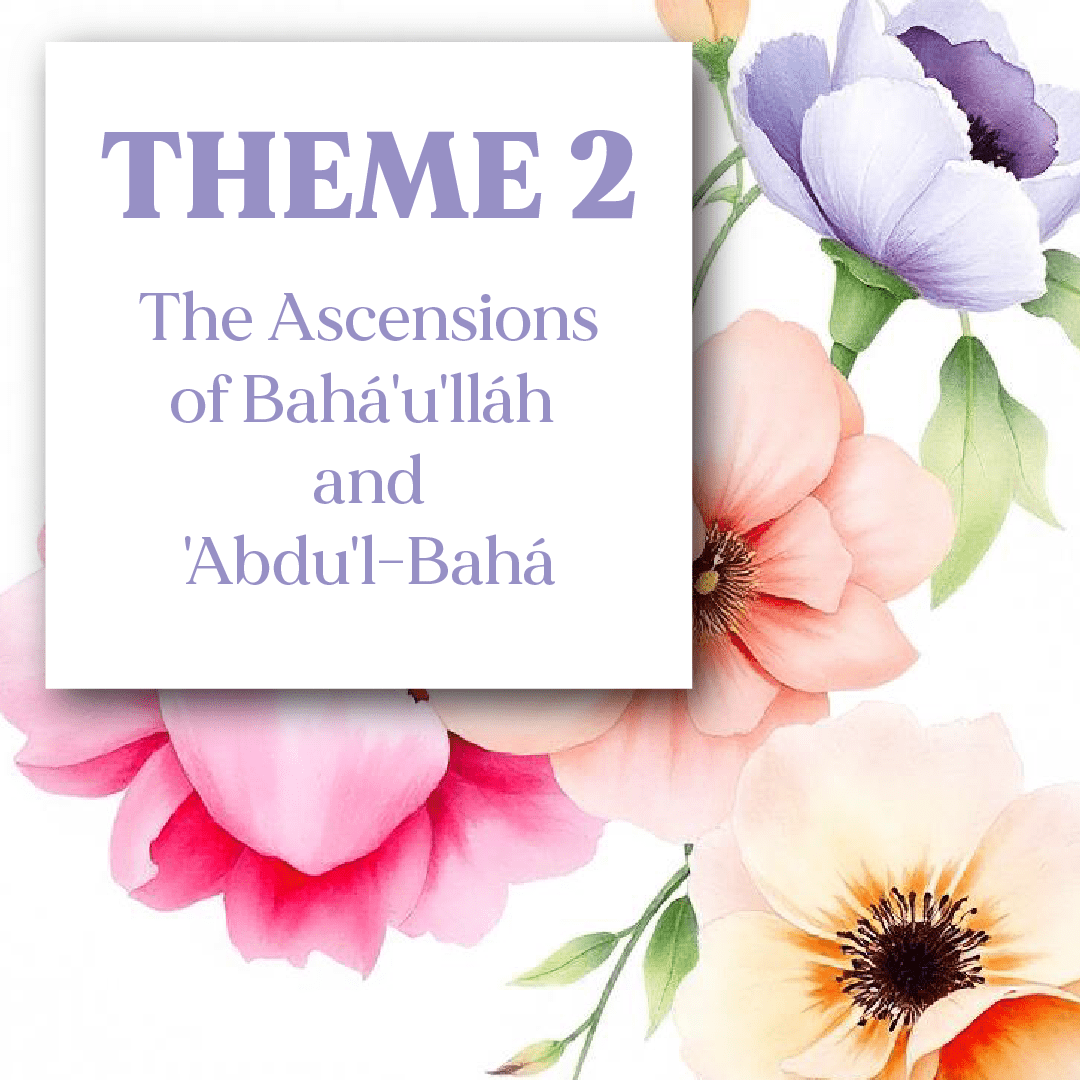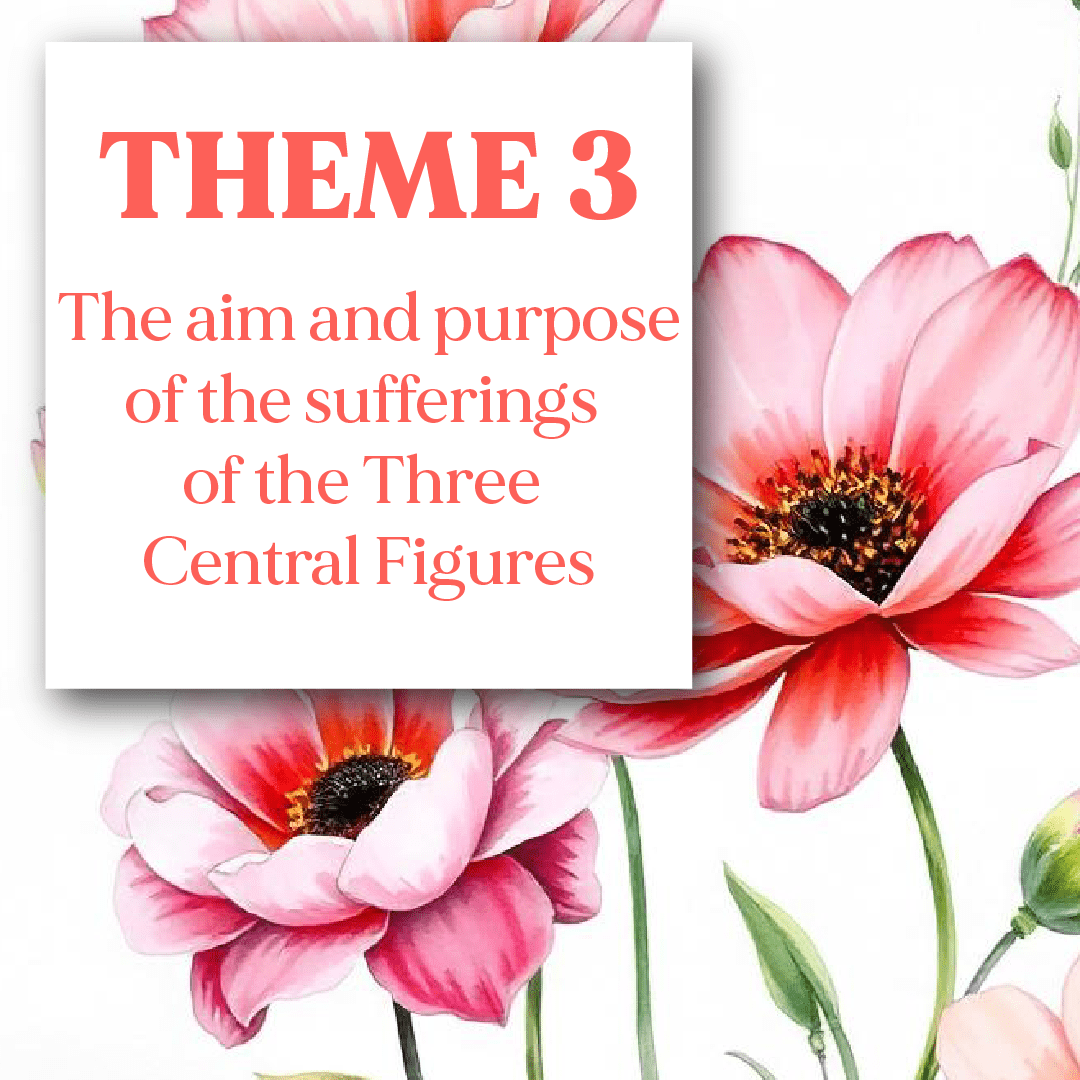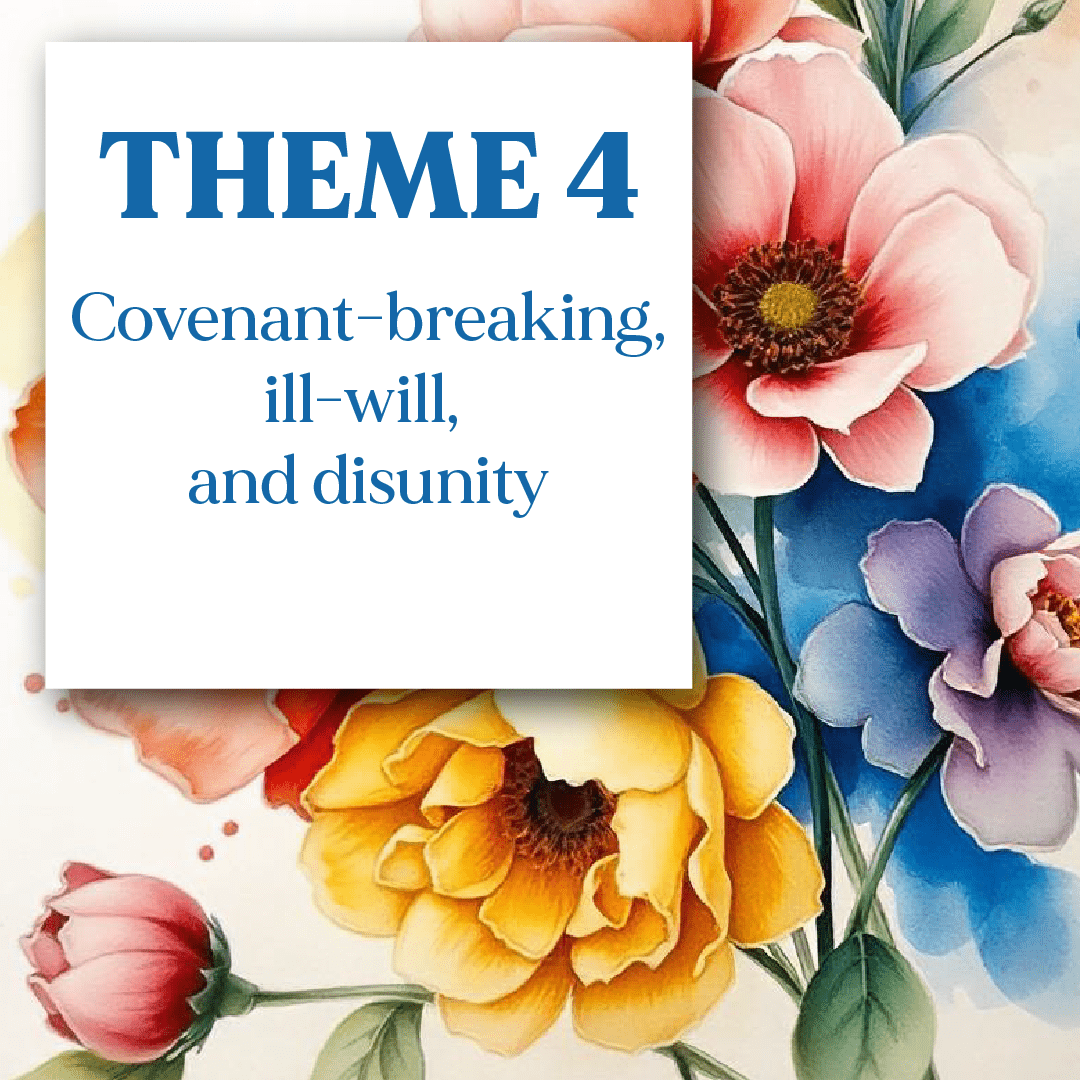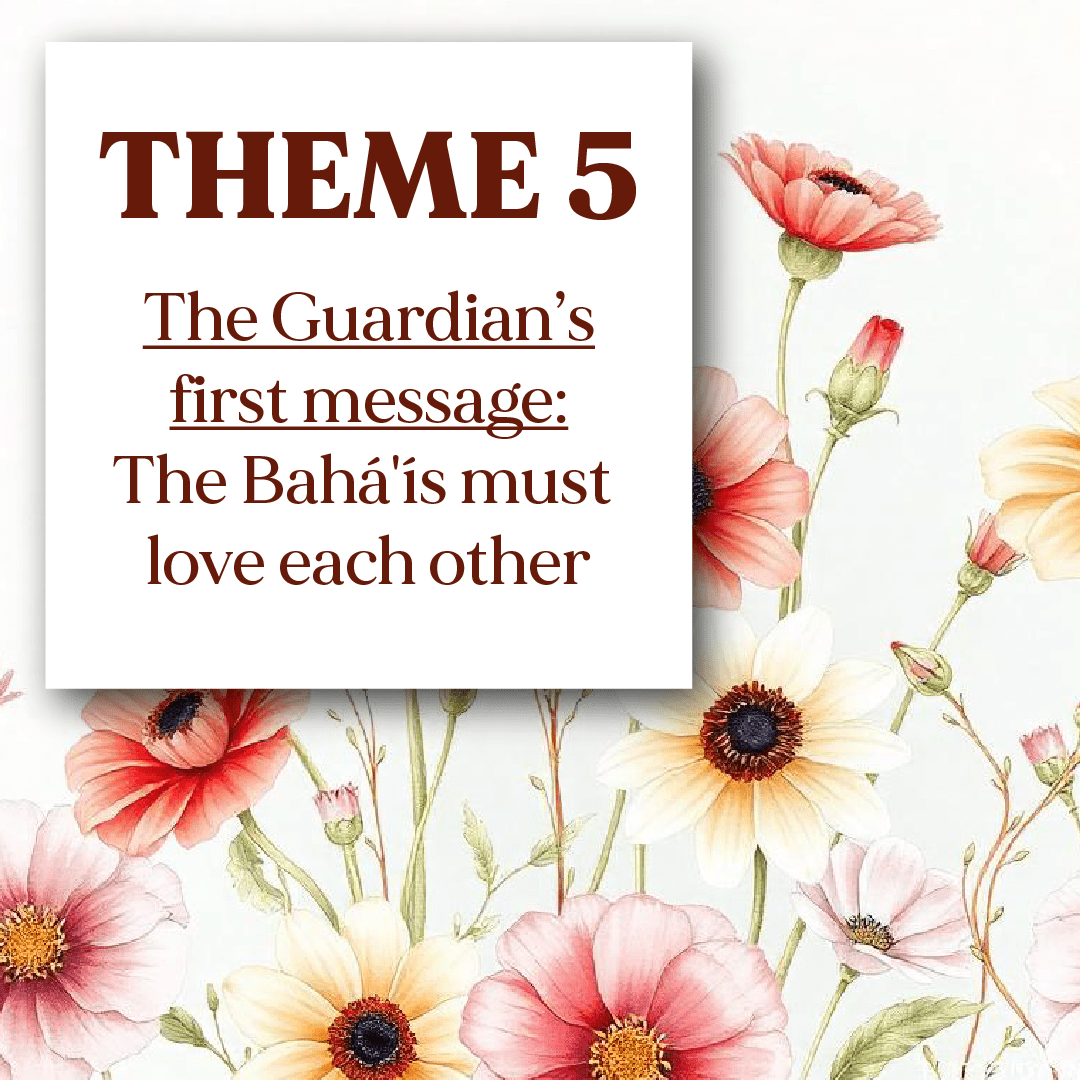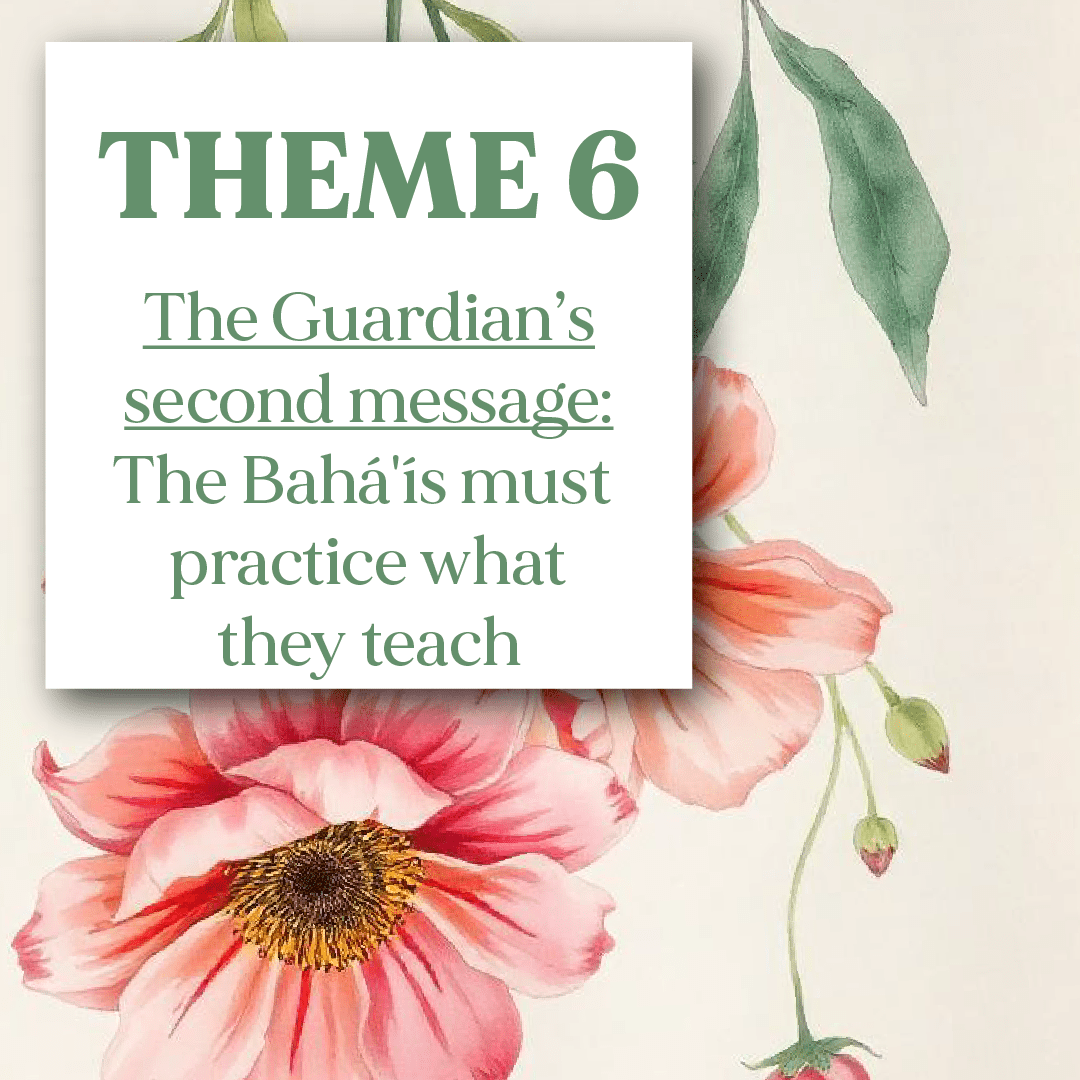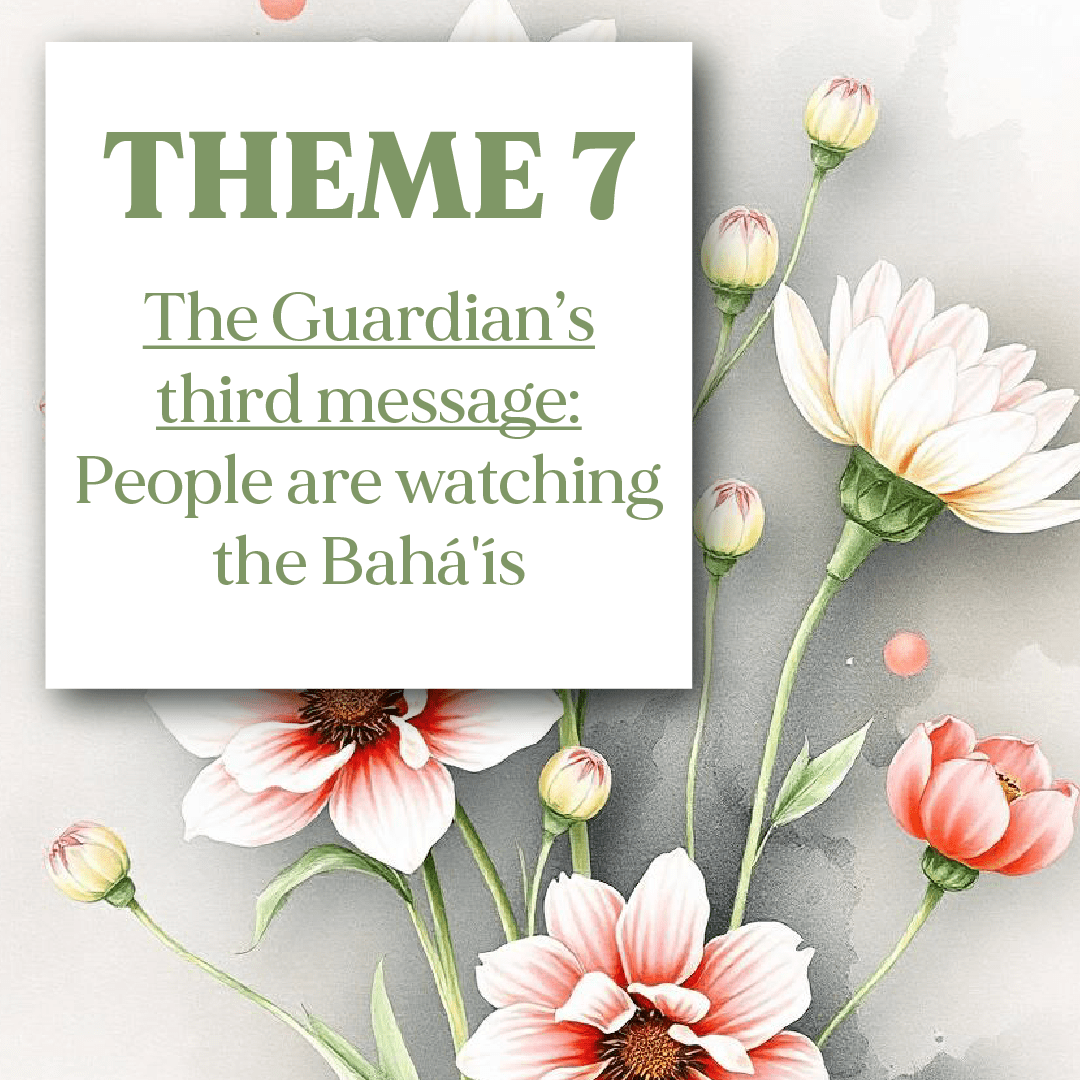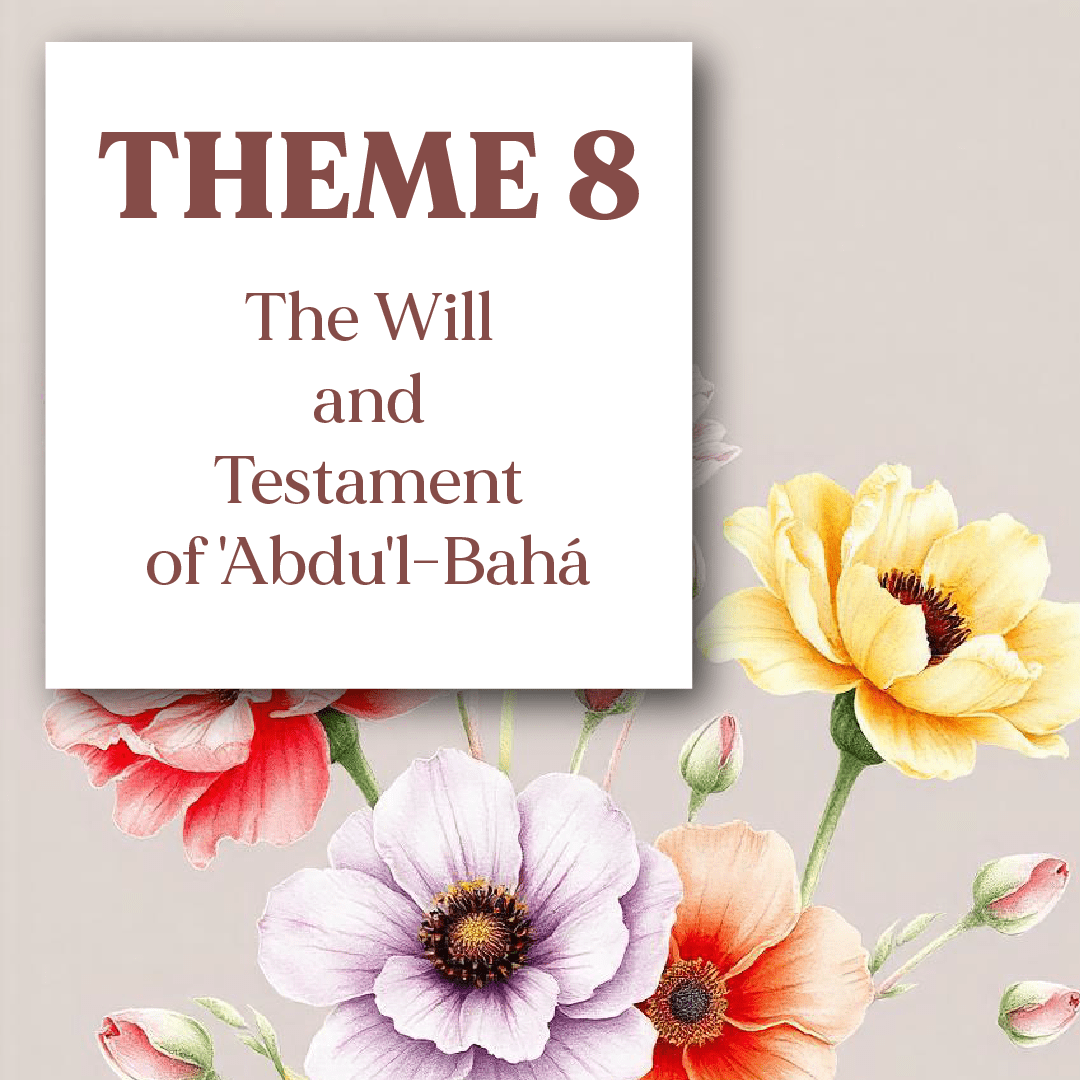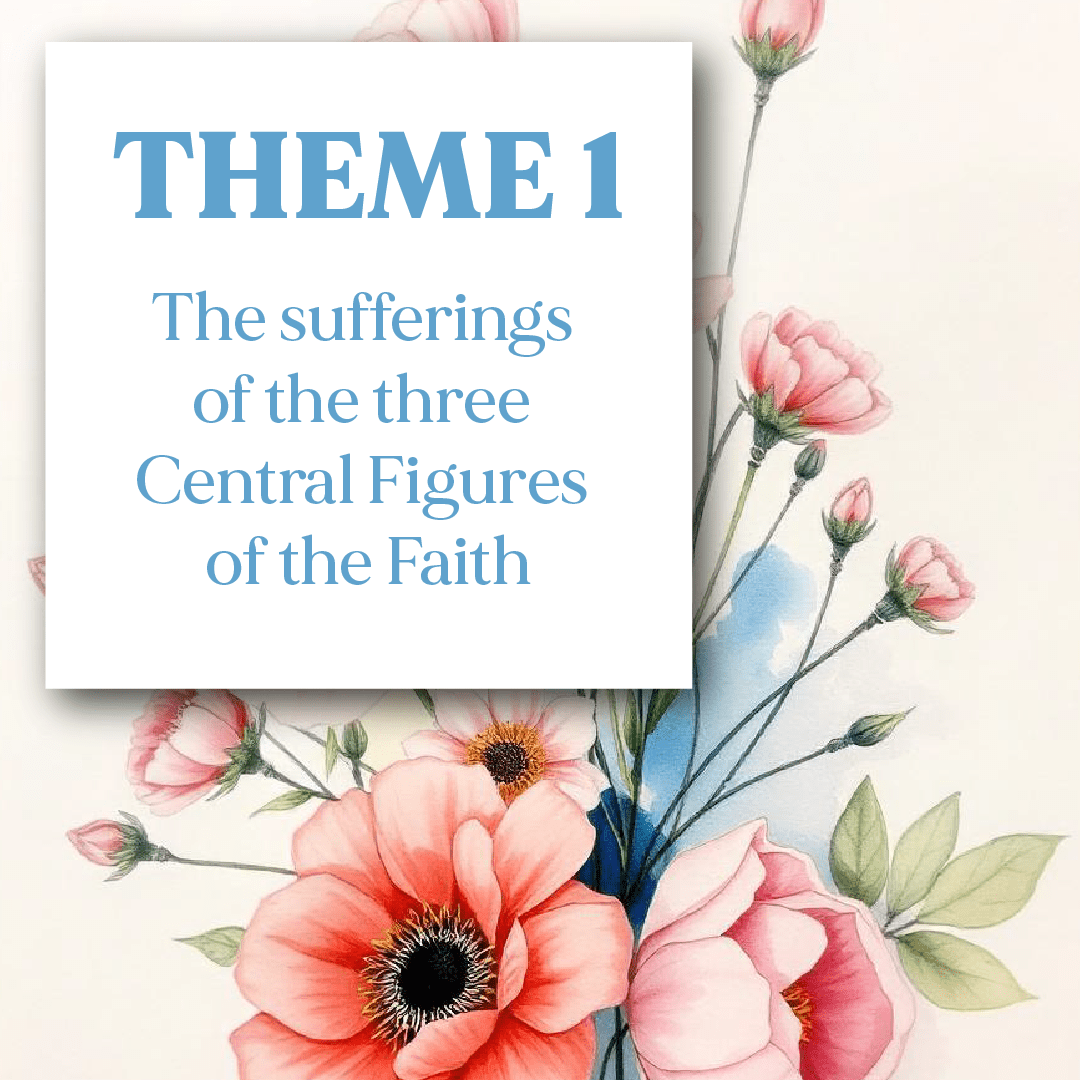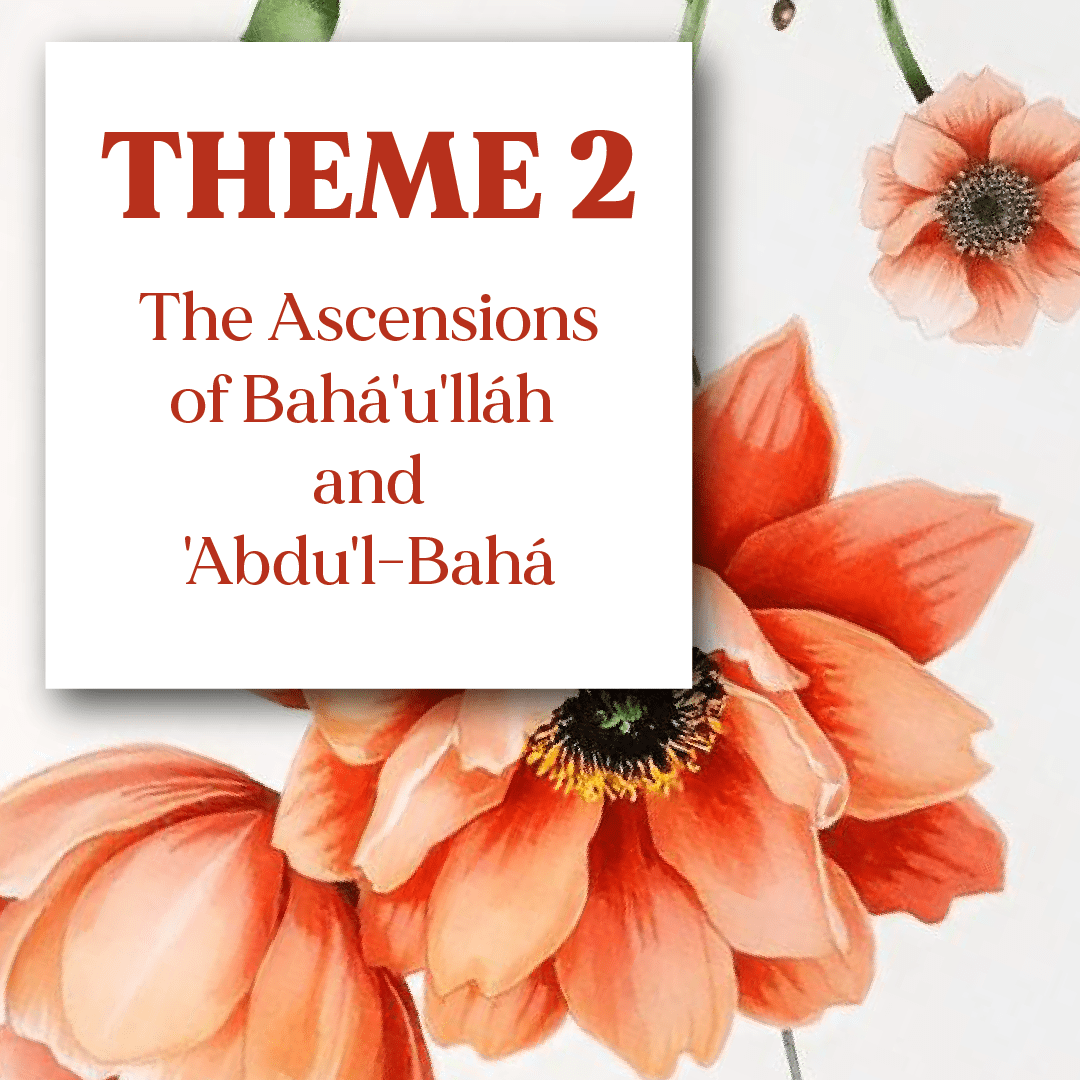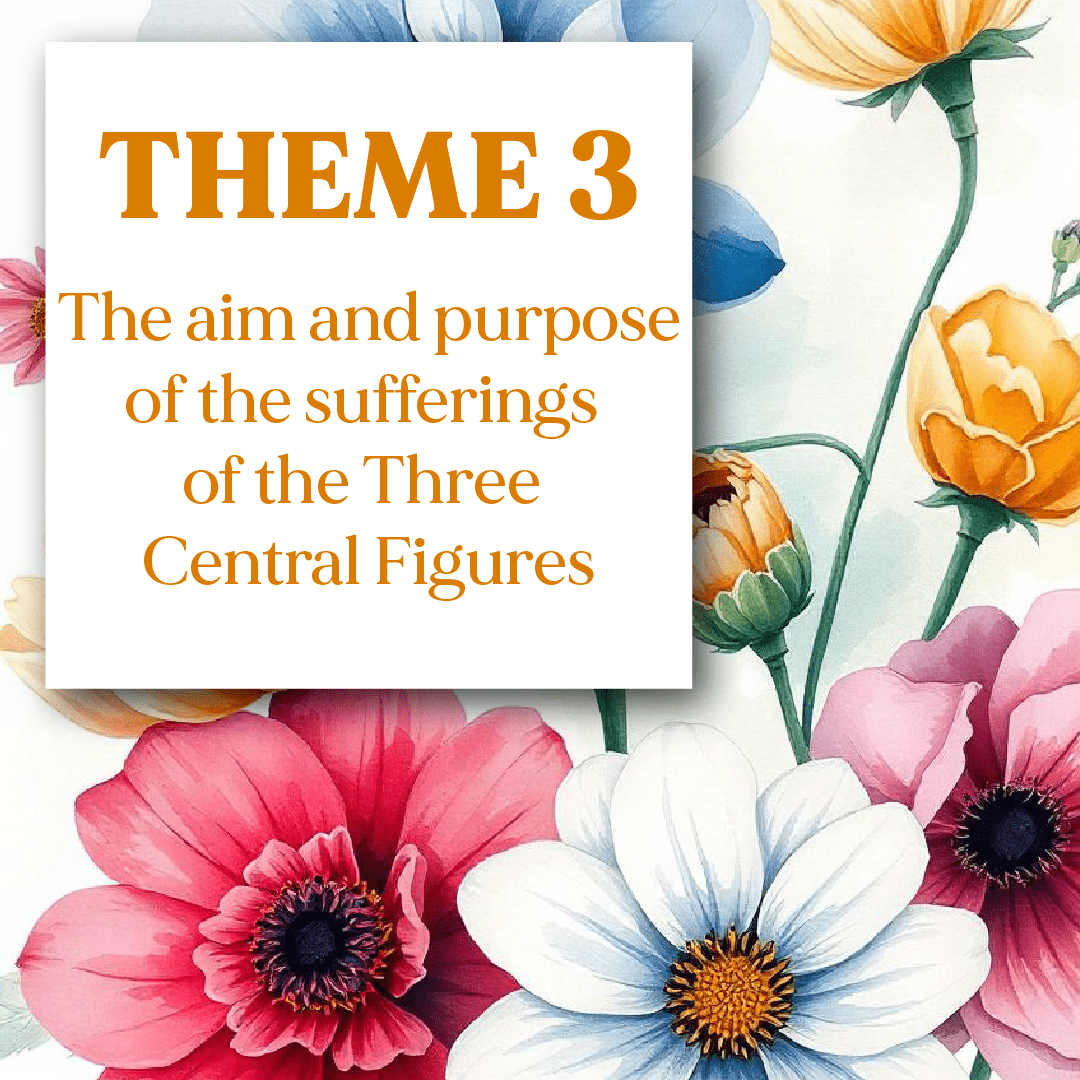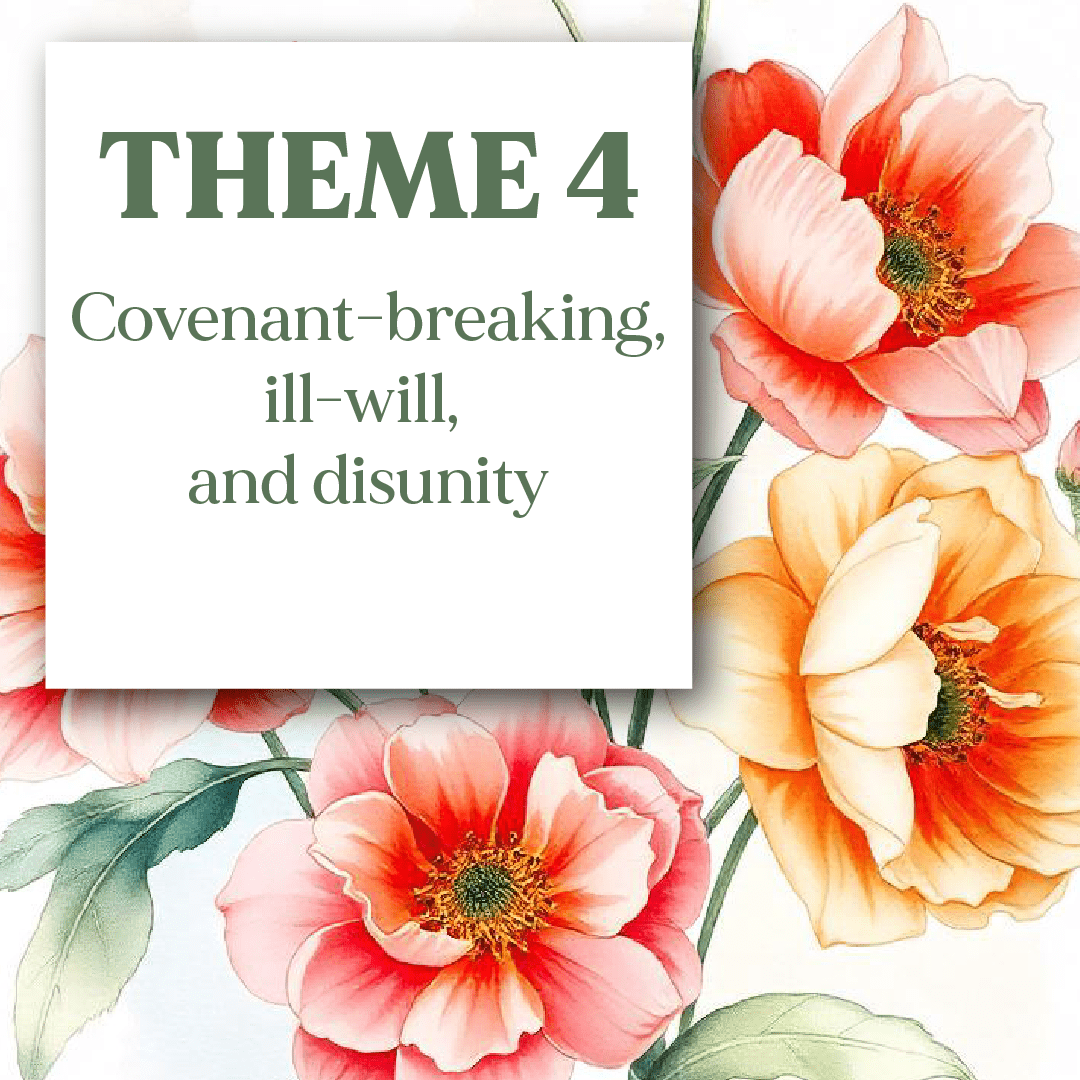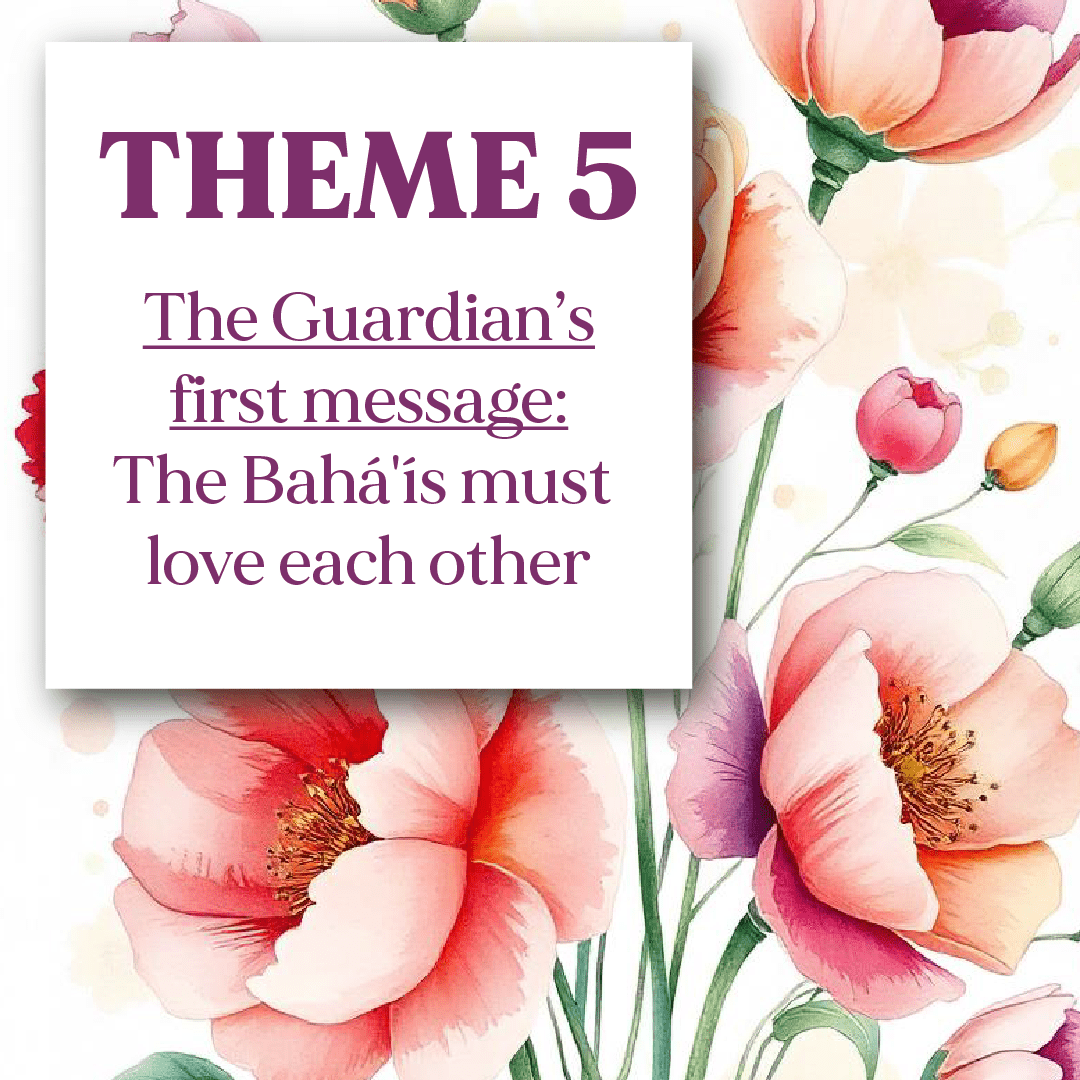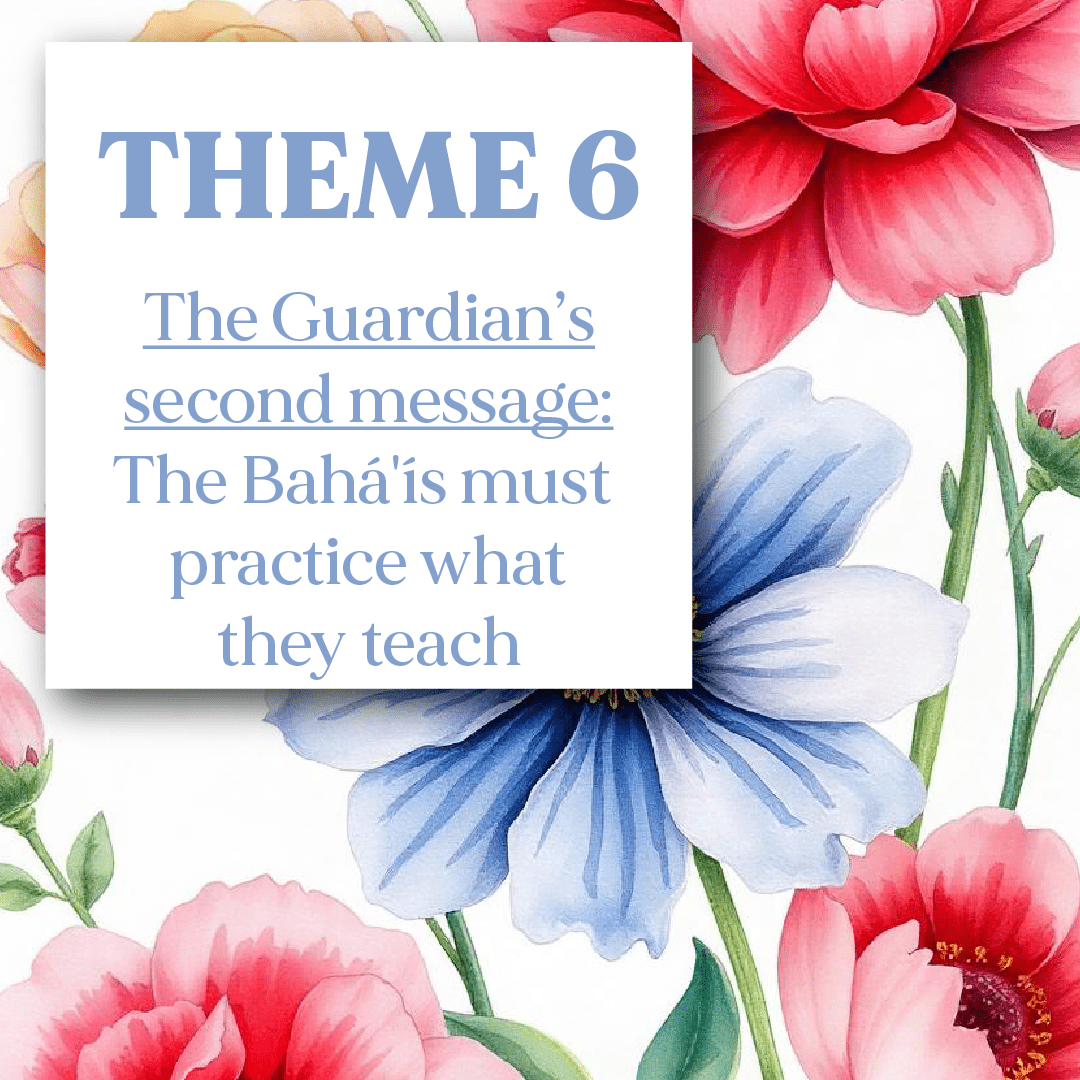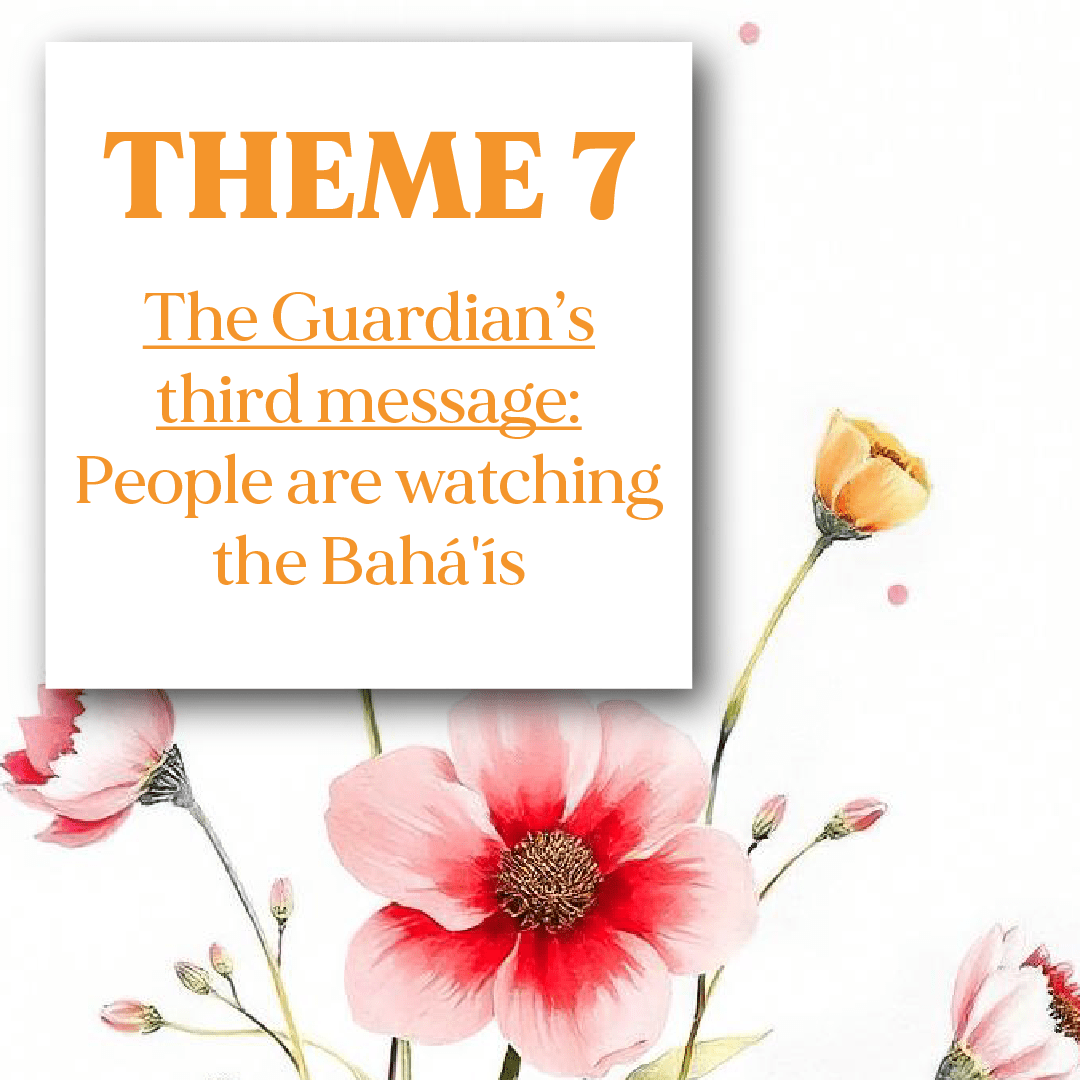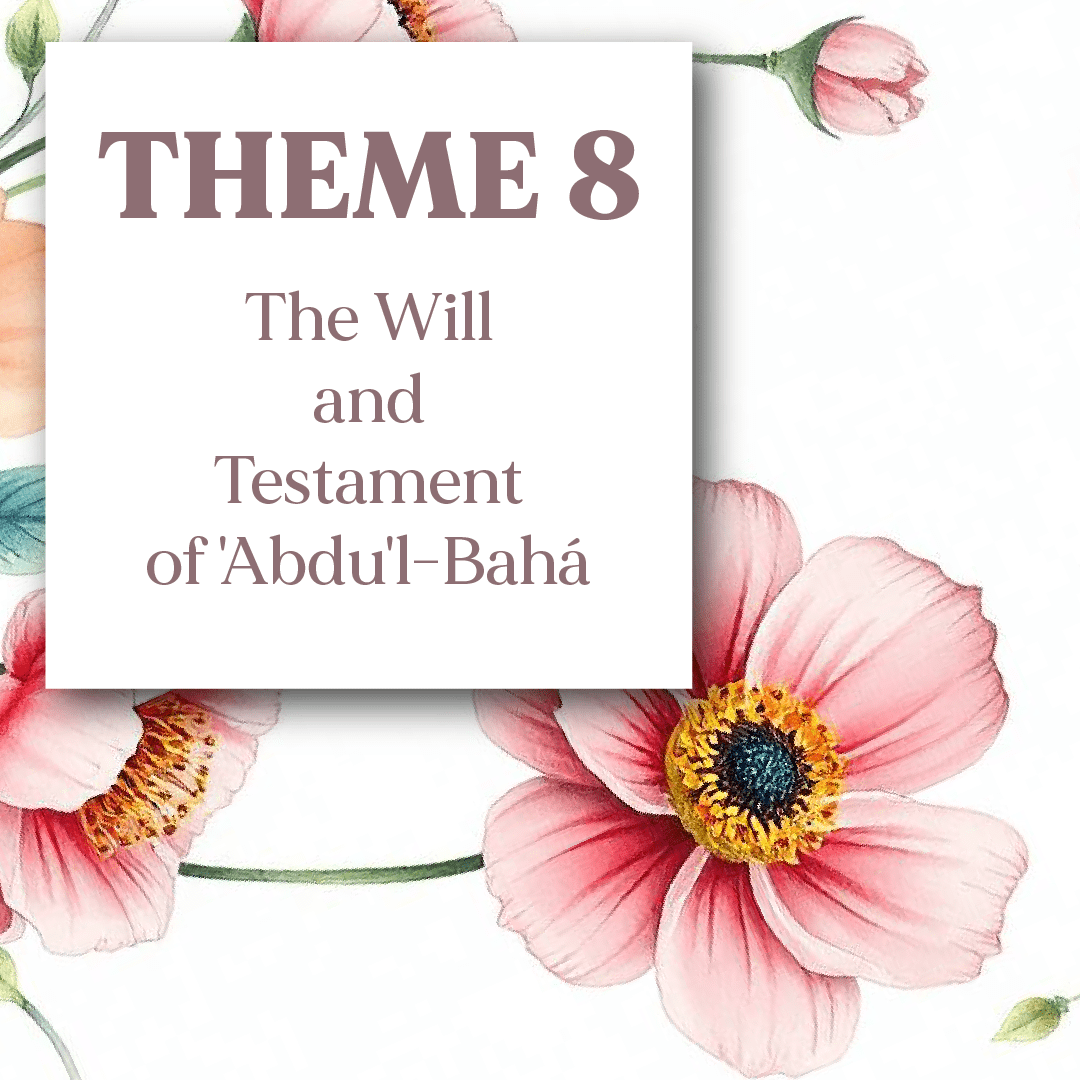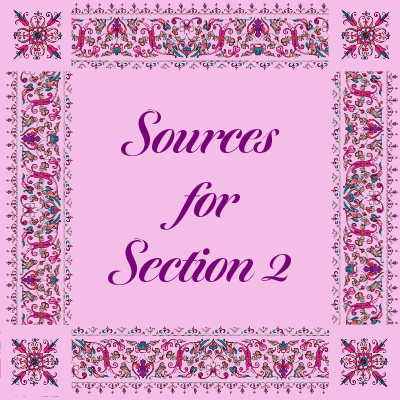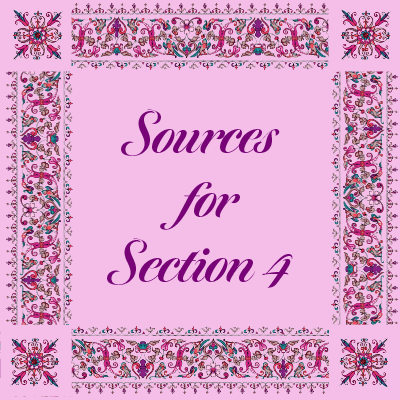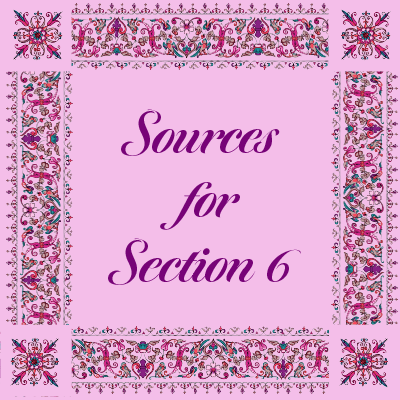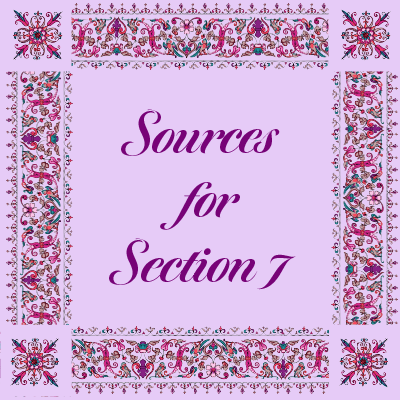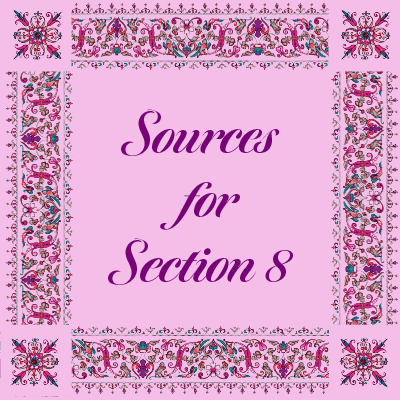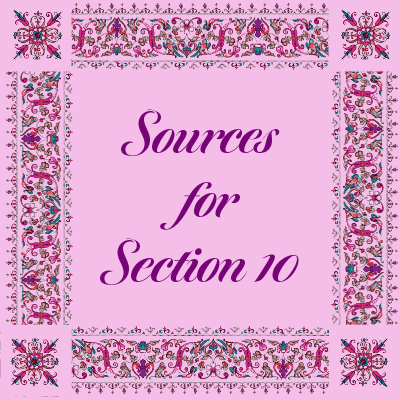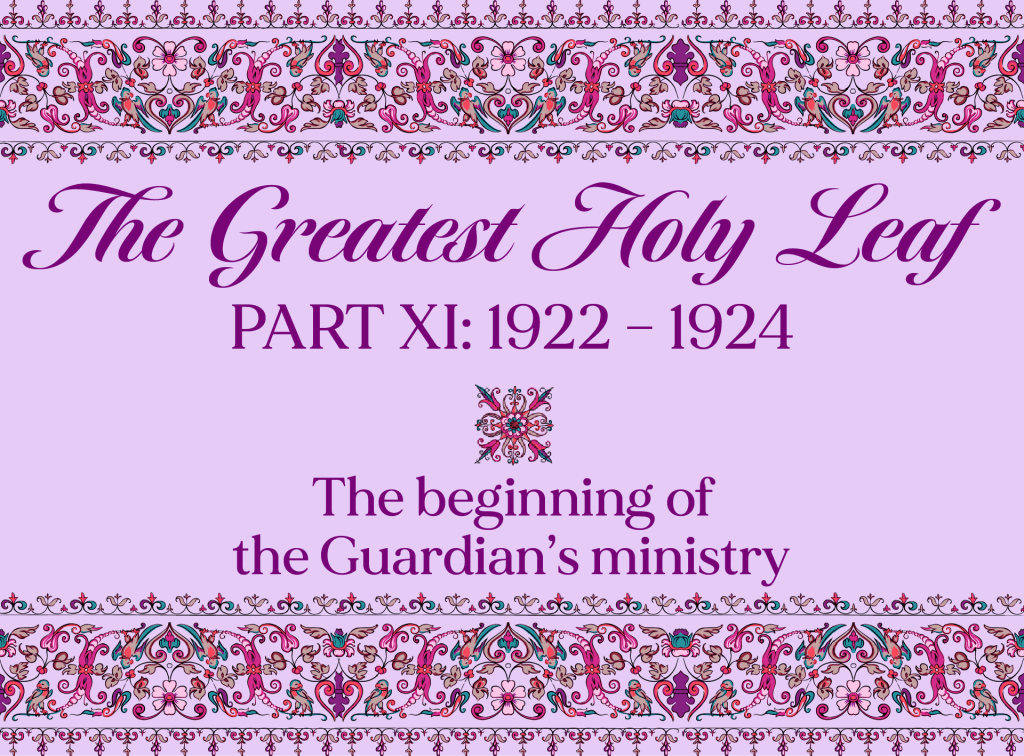
Written and illustrated by Violetta Zein
This part covers the life of the Greatest Holy Leaf from the age of 76 in 1922 to the age of 78 in 1924.

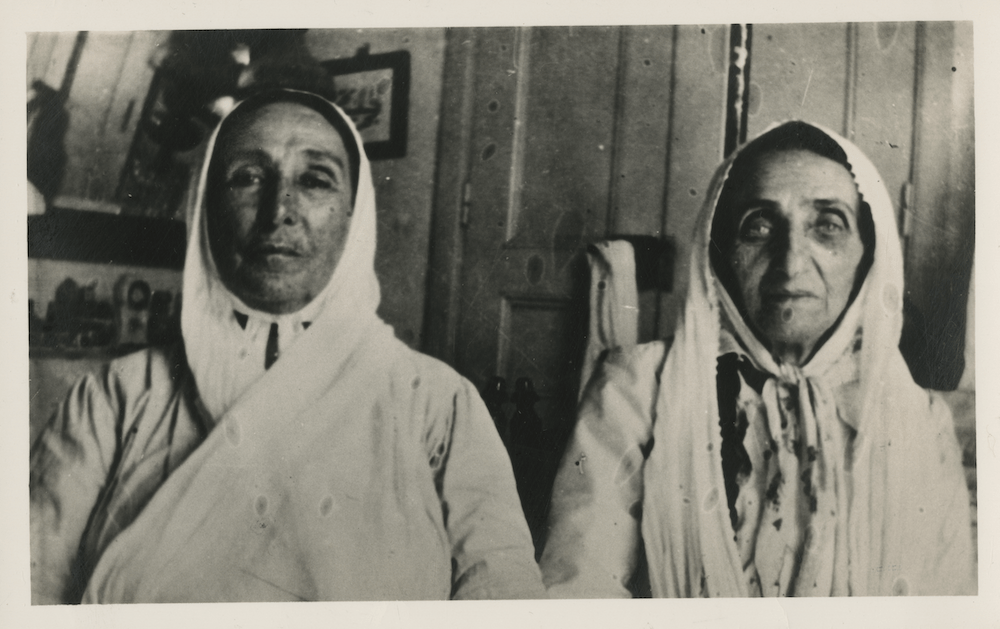
Photograph of Munírih Khánum and the Greatest Holy Leaf. © United States National Bahá'í Archives, used with permission.
Initially, when Shoghi Effendi left for Europe on 5 April 1922, Bahíyyih Khánum, the Holy Family, and the resident Bahá'ís all hoped he would return soon.
Everyone had gravely underestimated the emotional toll, or rather the emotional devastation, that the sudden and unexpected passing of 'Abdu'l-Bahá had on Shoghi Effendi.
The longer Shoghi Effendi was absent, month after month, week after week, and day after day, the more Bahíyyih Khánum’s anxiety and concern deepened and worsened.
The Guardian’s absence turned from days and weeks to 8 months.
Munírih Khánum—the widow of 'Abdu'l-Bahá and Shoghi Effendi’s grandmother—would write that Shoghi Effendi’s absence had completely sapped Bahíyyih Khánum’s strength.
Finally, sometime in the Fall of 1922, when Shoghi Effendi still had not returned after more than 8 months away, Bahíyyih Khánum took action.
She dispatched Shoghi Effendi’s mother, Ḍíyá‘íyyih Khánum and some other family members to Switzerland to plead with him to return to the Holy Land.
One night—most probably sometime in early to mid-December 1922—Shoghi Effendi was returning from one of his all-day hikes in the Bernese Alps and was stunned to find his mother and a relative looking for him in the street of a small mountain village.
Ḍíyá‘íyyih Khánum tearfully told Shoghi Effendi about Bahíyyih Khánum’s distress at his prolonged absence and convinced him to return to Haifa.
It was time to go home.
Finally, at long last, after an 8-month absence, Shoghi Effendi returned to Haifa on 15 December 1922, refreshed, with renewed vigor and in excellent health.

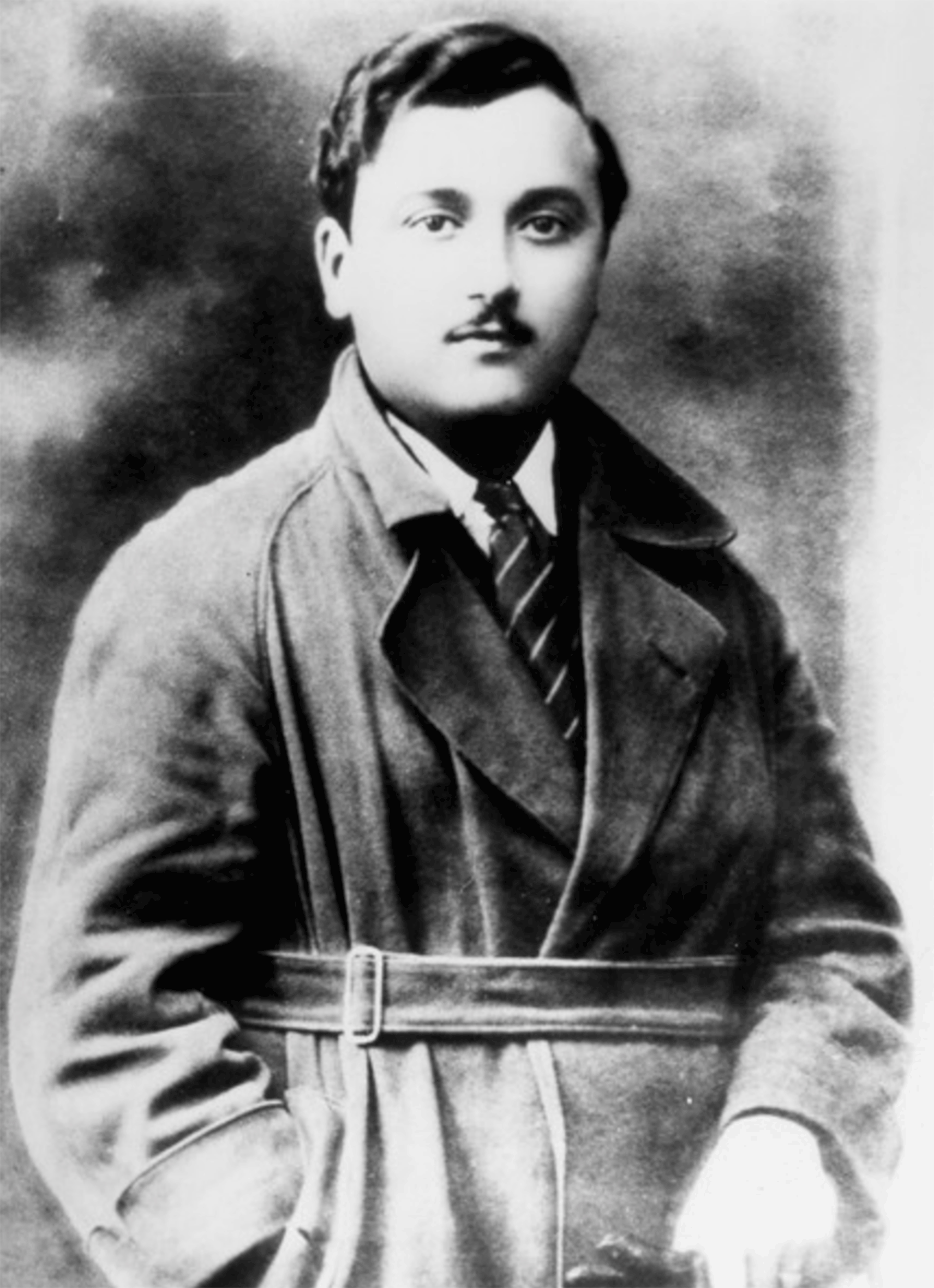
Shoghi Effendi in his 20s. Source: Bahaimedia.
After the passing of 'Abdu'l-Bahá, Shoghi Effendi became the very center of the Greatest Holy Leaf’s life and in the first ten years of his Guardianship, she was with him every step of the way.
The Greatest Holy Leaf had seven decades of experience standing firmly in support of the Head of the Faith. She had done it for 39 years for Bahá'u'lláh and for 29 year for 'Abdu'l-Bahá. The Greatest Holy Leaf had been created for the most arduous task in Bahá'í history, and there was no one better suited to help the Guardian navigate the internal and external crises and celebrate the victories of the first 11 years of his ministry.
From 1921 to 1932, the Greatest Holy Leaf would be the Guardian’s only solace, only companion, his only refuge, his only comfort. She would be his everything, he could trust her completely, and she alone—having lived through the ministries of Bahá'u'lláh and 'Abdu'l-Bahá and supported them—knew the true weight that rested on his shoulders.
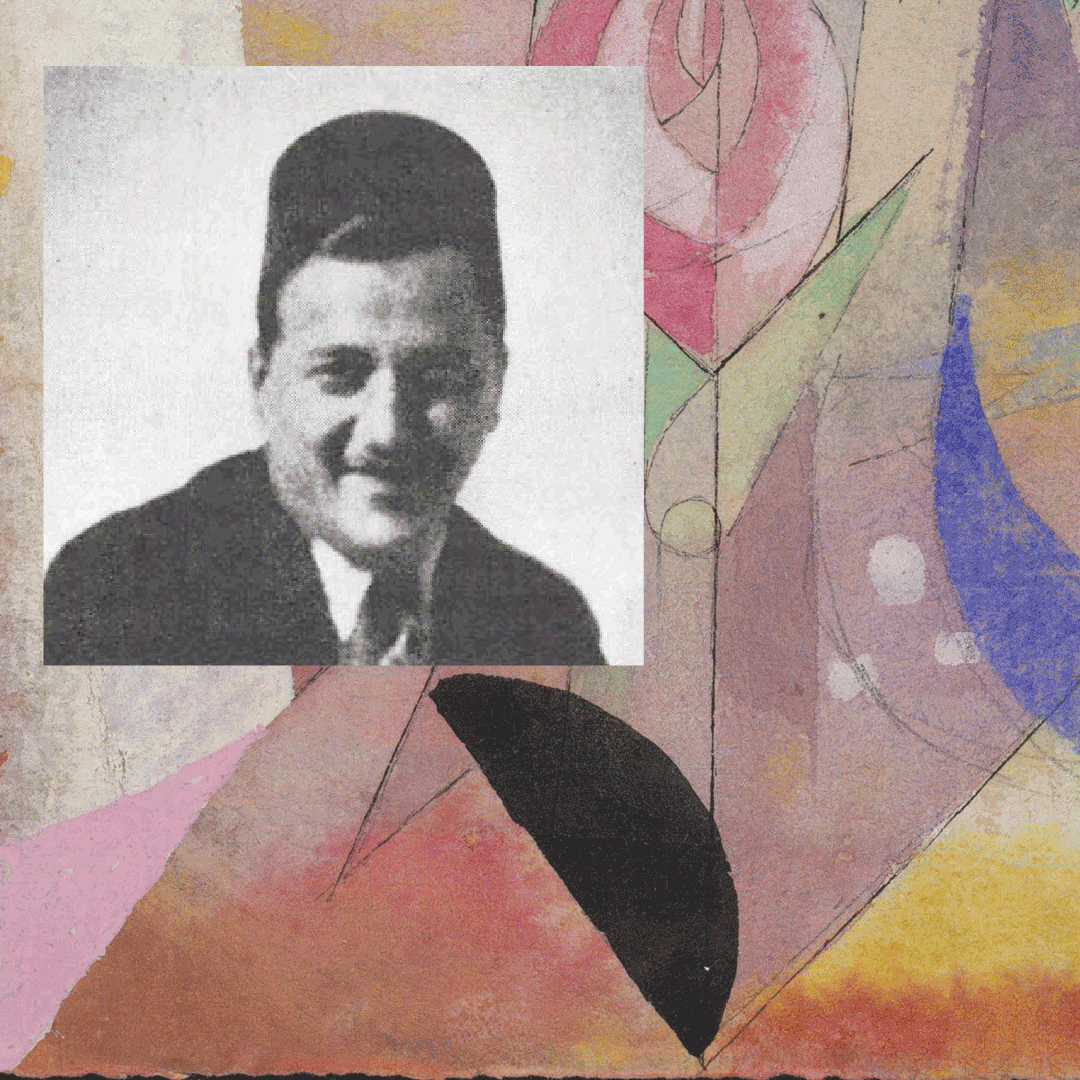
Photograph of a smiling Shoghi Effendi previous attributed in this chronology. Background image: Persische Nachtigallen (Persian Nightingales), 1917 by Paul. Klee, Gift of Catherine Gamble Curran and Family, in Honor of the 50th Anniversary of the National Gallery of Art. Source: The National Gallery.
Shoghi Effendi had an intimate bond of closeness with the Greatest Holy Leaf and in the first two years of his ministry, Shoghi Effendi didn’t close his letters and cables the way we are familiar with—Your true brother—but rather he often included Bahíyyih Khánum with phrases like these:
In this fervent plea joins me the Greatest Holy Leaf…
the Greatest Holy Leaf and I…
The numerous communications which your distinguished Secretary has lately addressed on your behalf to the Greatest Holy Leaf and myself…
The Greatest Holy Leaf desires me to convey in her name to the esteemed members of the Green Acre Fellowship the expression of her cordial thanks…
The Greatest Holy Leaf joins me in requesting delegates assembled under Mashriqu’l-Adhkár’s sacred dome convey all American believers expression our heartfelt congratulations…
Greatest Holy Leaf joins me...expression our heartfelt congratulations boundless joy profound gratitude practical completion superstructure glorious edifice…
In 1931, Shoghi Effendi sent a cable and signed it:
Bahíyyih Shoghi
But Shoghi Effendi did not just add the Greatest Holy Leaf’s name to his letters, he included her as his intimate collaborator, as is evident in this letter in which he joins her plea to his:
I entreat you, dear friends, to continue, nay, to redouble your efforts, to keep your vision clear, your hopes undimmed, your determination unshaken, so that the power of God within us may fill the world with all its glory. In this fervent plea joins me the Greatest Holy Leaf. Though chagrined in the evening of her life at the sorrowful tales of repression in Persia, she still turns with the deepest longings of her heart to your land where freedom reigns, eager and expectant to behold, ere she is called away, the signs of the universal triumph of the Cause she loves so dearly.
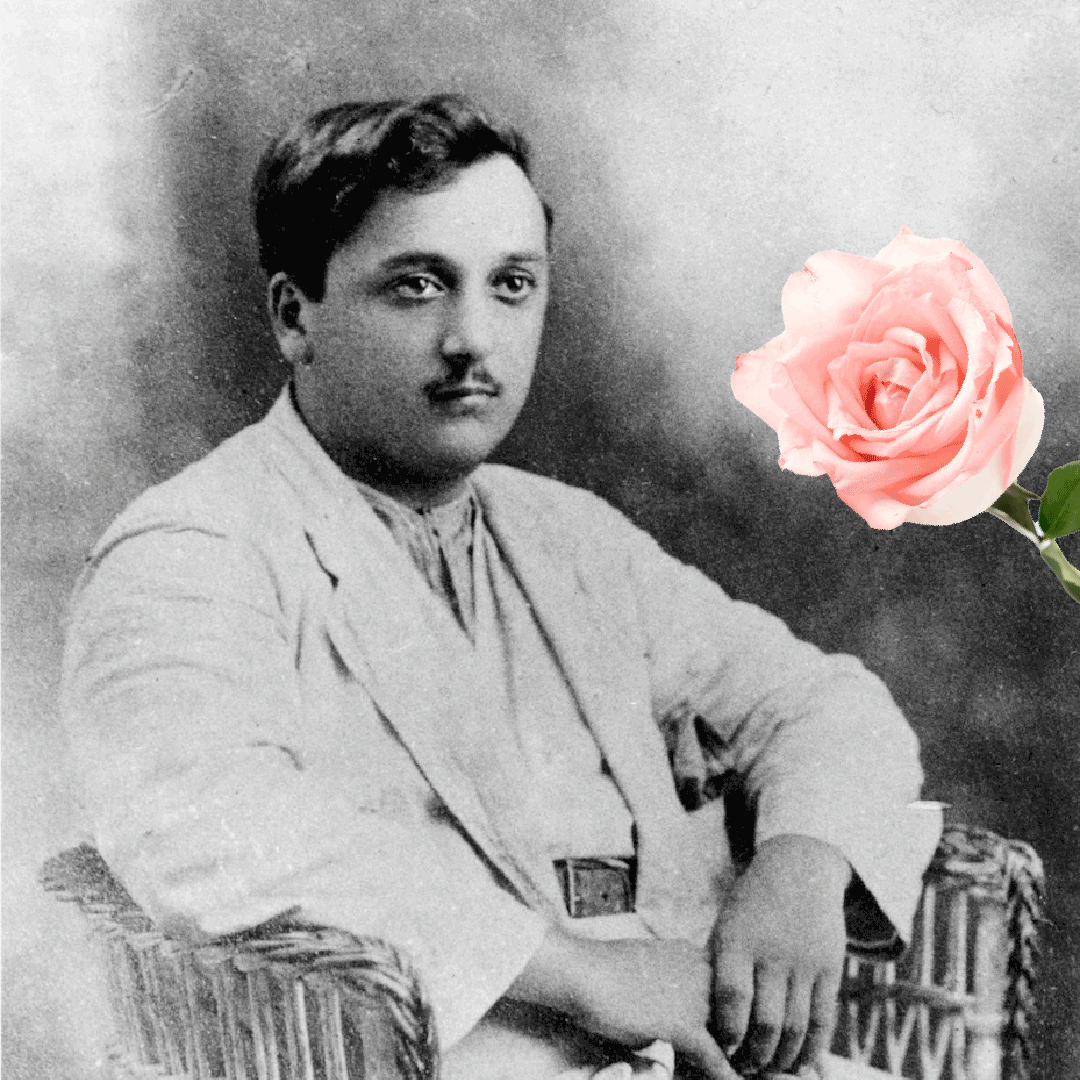
Photo of Shoghi Effendi in 1919 from Bahá'í Media Bank, © Bahá'í International Community 2024. Rose photograph by TopNTP26 on Freepik.
The Greatest Holy Leaf had been an integral part of Shoghi Effendi’s childhood, teenage years, youth, and now, she was still the most important person in not only his adulthood, but in his Guardianship.
Shoghi Effendi considered Bahíyyih Khánum as a close companion and the consolation of his heart, his one great solace in life. The extent of her immense love for the Guardian is so touchingly palpable in an excerpt here from a letter written on behalf of Shoghi Effendi by one of his secretaries, and it gives the scope of the Greatest Holy Leaf’s love for and devotion to the Guardian:
That gem of immortality, that precious and exalted being, was the one consolation, the one companion of the Guardian in his sorrow-filled life; and she, with her sweet encouragement, her gentle words, her never-ceasing, soothing care of him, her smiles that came like fair winds from heavenly gardens, could always gladden and refresh his spirit.
The attachment of Shoghi Effendi to the Greatest Holy Leaf was deeply rooted in spiritual feelings, and the strength of their bond truly defied any human’s understanding. It was a secret shared by the both of them, and this letter, also written on behalf of Shoghi Effendi sheds some light on the nature of their powerful and mysterious connection:
For the subtle and spiritual attachment that the Guardian felt for her, and the heavenly tenderness and affection between that lovely fruit of the divine Lote-Tree [Bahá'u'lláh] and himself, was a bond so strong as to defy description, nor can the mind encompass that exalted state. That secret is a secret well-concealed, a treasured mystery unplumbed, and to a plane such as this, the minds of the believers can never find their way.
The Guardian was the head of the Faith.
He had no opportunities to develop deep bonds of love and friendship with Bahá'ís. He was the leader of the Faith. The Greatest Holy Leaf—and later in life his wife Rúḥíyyih Khánum—were the only two exceptions.
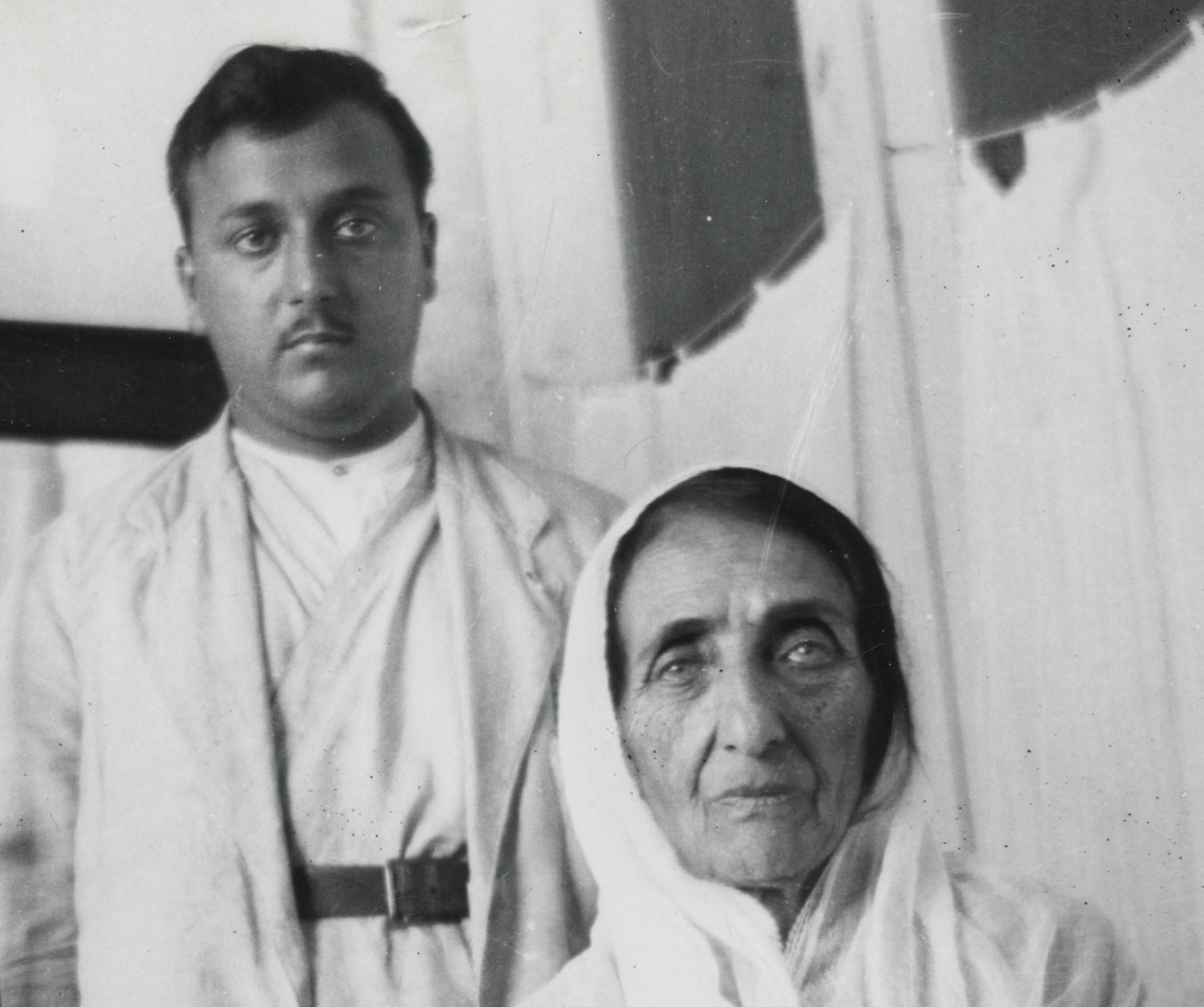
Closeup of a previously posted photograph of Shoghi Effendi and the Greatest Holy Leaf, a photograph most likely taken between 1918 and 1920 when Shoghi Effendi was the secretary of 'Abdu'l-Bahá in Haifa. © United States National Bahá'í Archives, used with permission.
The Greatest Holy Leaf was a stable, spiritual presence, a refuge of safety and a tower of strength for Shoghi Effendi from the time he was born.
When Shoghi Effendi returned to the Holy Land, after several weeks he moved into the house of 'Abdu'l-Bahá with the Greatest Holy Leaf. The Greatest Holy Leaf lived on the second floor, and Shoghi Effendi lived on the third floor in rooms which Bahíyyih Khánum had built for him, to offer him privacy.
Shoghi Effendi described his bond with his great-aunt with the most touching words:
No one has understood the tender, spiritual and celestial bond between the Guardian and her who was the Remnant of Bahá, nor can any mind conceive that plane of being, nor reckon its sublimity.
Bahíyyih Khánum was Shoghi Effendi’s sole support after the Ascension of 'Abdu'l-Bahá and he never forgot it.
He described in detail her attention, her patience, her love, her kindness in a very touching excerpt from a letter:
After the ascension of 'Abdu'l-Bahá to the realm of the All-Glorious, that Light of the Concourse on High enfolded me, helpless as I was, in the embrace of her love, and with incomparable pity and tenderness, persuaded, guided, and urged me on to the requirements of servitude. The very elements of this frail being were leavened with her love, refreshed by her companionship, sustained by her eternal spirit. Never for a moment will her kindnesses, her favours, pass from my memory, and as the months and the years go by, the effects of them on this mourning heart will never be diminished.
In just a single short sentence, Shoghi Effendi expressed everything Bahíyyih Khánum had ever meant to him, describing not only his gratitude and love to her but calling her the joy and inspiration of his life:
How can my lonely pen…recount the blessings she showered upon me since my earliest childhood—how can such a pen repay the great debt of gratitude and love that I owe her whom I regarded as my chief sustainer, my most affectionate comforter, the joy and inspiration of my life?

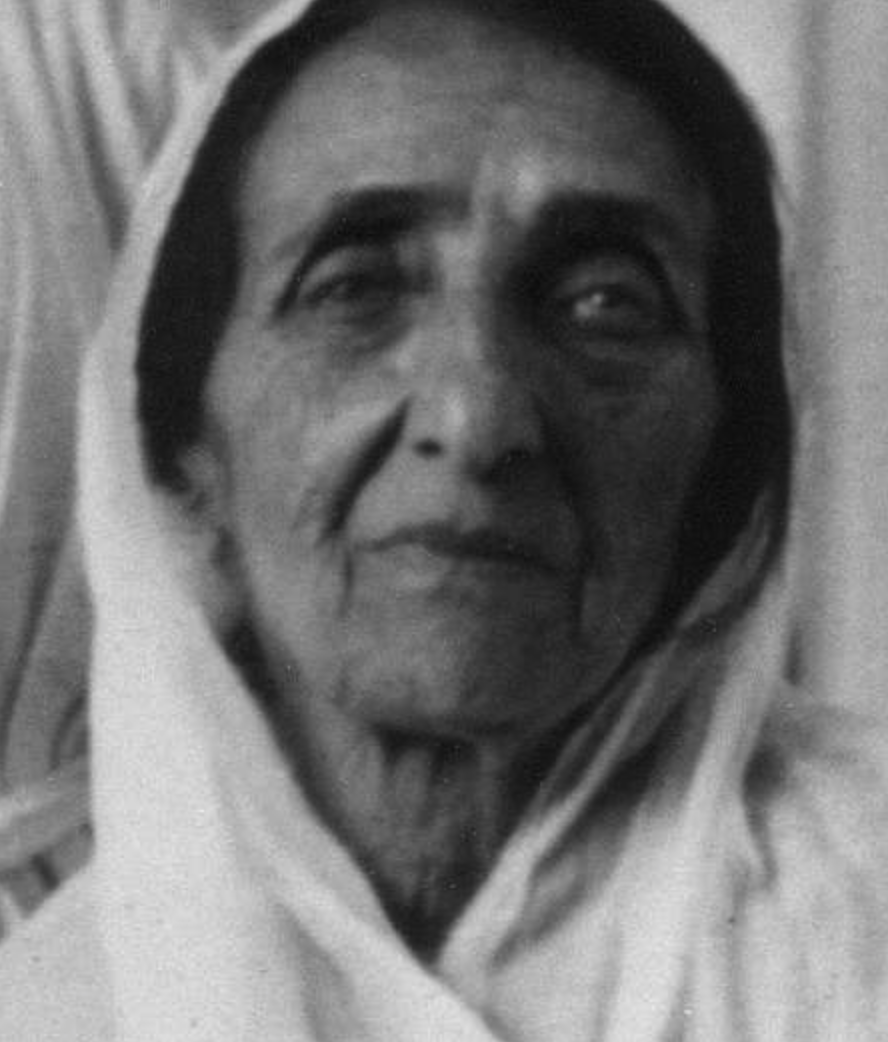
A portrait of the Greatest Holy Leaf. Source: Bahá'í Biblio.
The Greatest Holy Leaf’s perfection of spiritual qualities, and particularly her humility, impressed Shoghi Effendi, who had grown up in the embrace of that extraordinary amongst all woman, that outstanding heroine:
When, in the morning and the evening, I call her beloved face to mind, and let her smiles, that nourished the spirit, pass again before my eyes, and I think over all her bounty to me, all her unnumbered kindnesses, and remember that astonishing meekness she showed in her sufferings—then the flames of yearning love are kindled yet again…
Bahíyyih Khánum’s immovable connection to the Covenant and her boundless love for the Faith, for Bahá'u'lláh, 'Abdu'l-Bahá and for the Guardian were a source of awe for Shoghi Effendi, and he was thankful to have such an extraordinarily, superlative, great-aunt by his side at all time:
I can…feel in its calm intensity, the immense love thou didst bear for the Cause of thine Almighty Father, the attachment that bound thee to the most lowly and insignificant among its followers, the warm affection thou didst cherish for me in thine heart.”
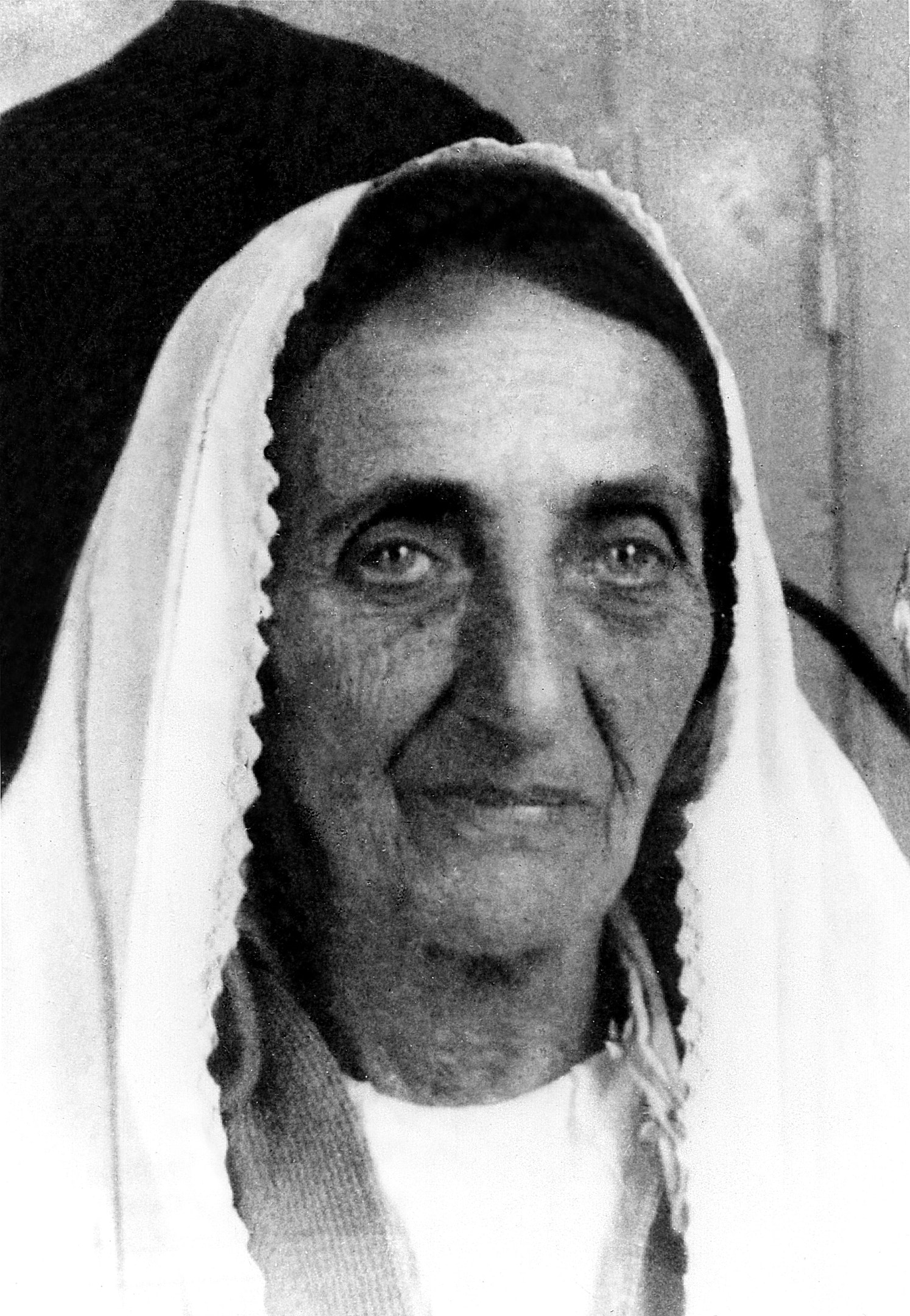
Greatest Holy Leaf, Bahíyyih Khánum with a faint smile on her beautiful face. Source: Bahá'í Media Bank, © Bahá'í International Community 2023.
But her qualities and virtues were far from the only thing that made a lifelong lasting impact on Shoghi Effendi. The Greatest Holy Leaf’s unnumbered services to the Cause, were a constant source of inspiration for him, particularly because Bahíyyih Khánum had spent a lifetime suffering from deprivations:
The memory of the ineffable beauty of thy smile shall ever continue to cheer and hearten me in the thorny path I am destined to pursue. The remembrance of the touch of thine hand shall spur me on to follow steadfastly in thy way. The sweet magic of thy voice shall remind me, when the hour of adversity is at its darkest, to hold fast to the rope thou didst seize so firmly all the days of thy life.
In this beautiful excerpt, Shoghi Effendi speaks of the Greatest Holy Leaf as his example, as he years to follow in her footsteps, something he had previous written in letters in his youth about His Grandfather 'Abdu'l-Bahá:
And at such times I strengthen my resolve to follow in thy footsteps, and to continue onward in the pathway of thy love; to take thee as my model, and to acquire the qualities, and to make manifest that which thou didst desire for the triumph of this exalted and exacting, this most resplendent, sacred, and wondrous Cause.
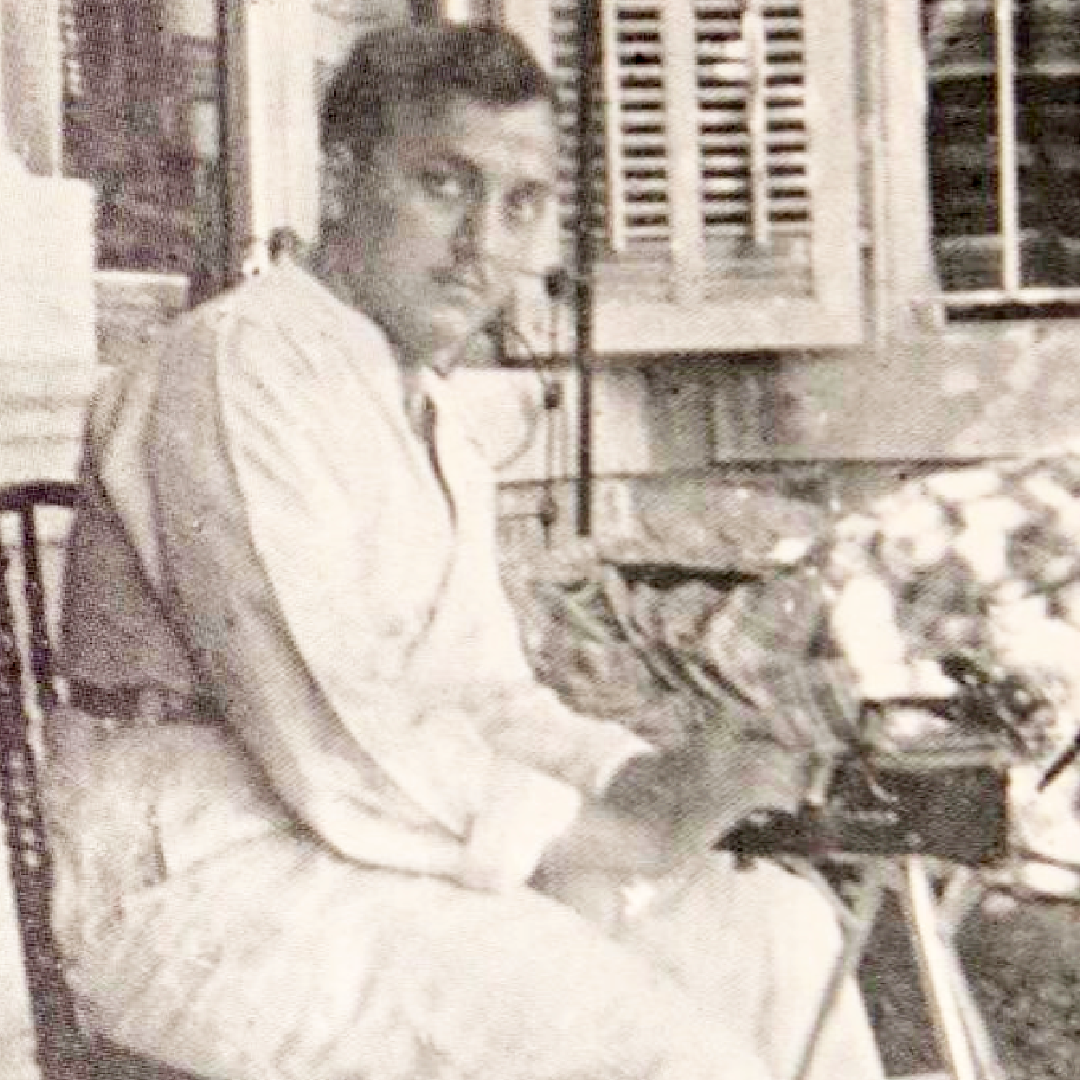
Closeup of Shoghi Effendi in the service of 'Abdu'l-Bahá, hard at work typing on his trusty Corona typewriter. Source: The Priceless Pearl, between pages 104 and 105.
Shoghi Effendi only ever ate one meal a day, and until he left Haifa in mid-May 1932, Shoghi Effendi ate that single daily meal on a small table in the Greatest Holy Leaf’s bedroom, alone with his beloved great-aunt. The Greatest Holy Leaf’s handmaid would knock on Shoghi Effendi’s door and tell him dinner was ready, then Shoghi Effendi would sit facing the Greatest Holy Leaf and first serve her plate before helping himself.
The Greatest Holy Leaf adored Shoghi Effendi and was devoted to her Guardian. She made every effort to bring everyone into the Covenant and advocated for him ceaselessly.
The Greatest Holy Leaf also worried constantly about every aspect of Shoghi Effendi’s life.
She worried hat he didn’t sleep enough.
She worried that he worked too much.
She worried about his immensely sensitive heart.
And she worried about Shoghi Effendi not eating enough.
Whenever she heard his footsteps, the Greatest Holy Leaf would come out of her room, take Shoghi Effendi’s hand and bring him into her room. She would give him whatever she had to eat, and ask him to rest for a few minutes.
The Greatest Holy Leaf loved Shoghi Effendi so much she enjoyed the little things about her adored grand-nephew: she loved to watch him eat, and she loved to watch him walk.
It was more than the love of a great-aunt for her nephew, it was an oceanic, all-encompassing motherly love.
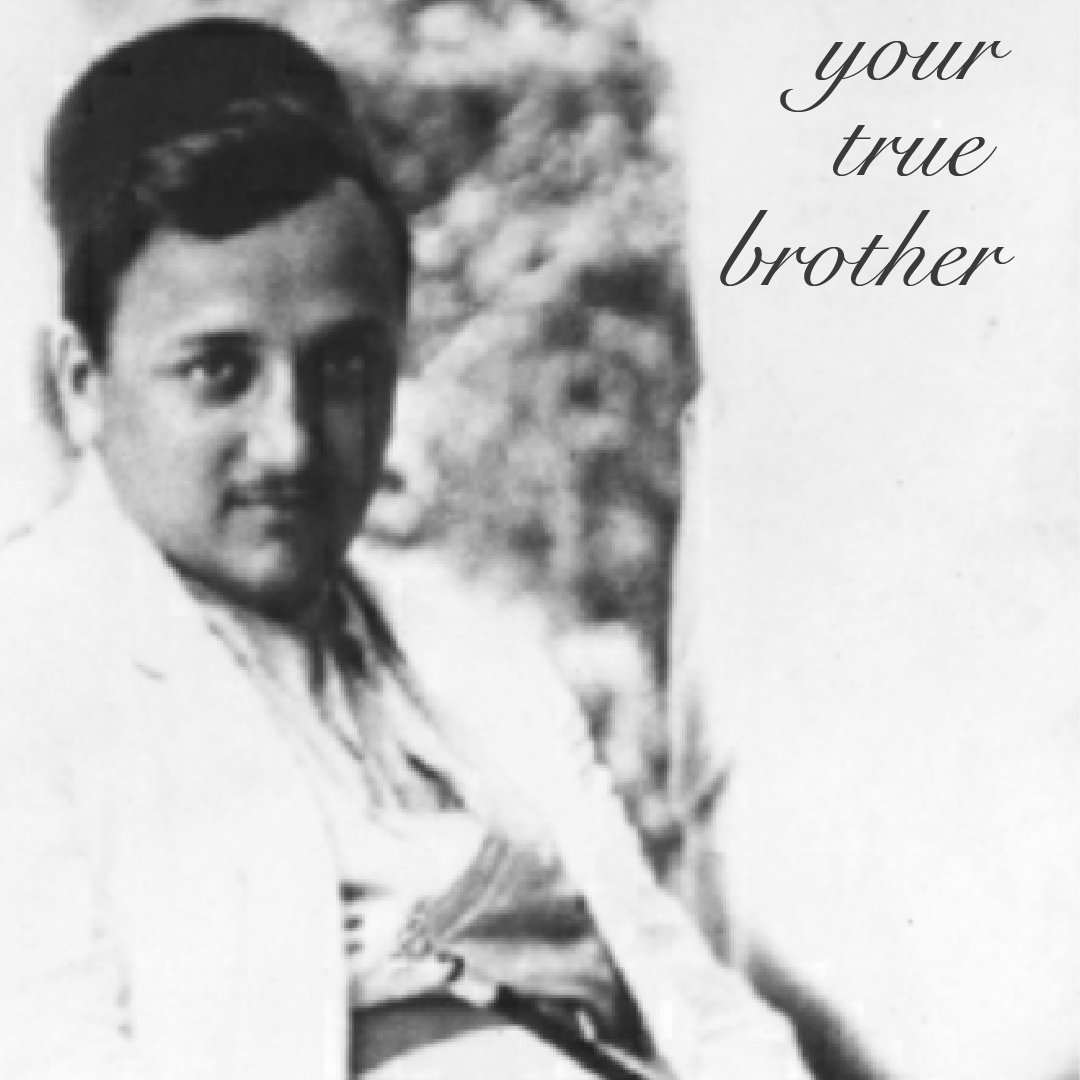
Shoghi Effendi at Syrian Protestant College. Source: The Priceless Pearl, between pages 56 and 57.
When he was ready to leave for his visit to the Shrine of the Báb, the Greatest Holy Leaf accompanied him to the door, her eyes following him, saying:
O ‘Abdu’l-Bahá! What a Guardian you have left behind! He has illumined the world and will continue to shed lustre upon it.
The Greatest Holy Leaf paced at the top of the stairs until the beloved Guardian returned from Mount Carmel, and as soon as she saw him, she would say:
He is coming. He is coming.
The Greatest Holy Leaf invited Shoghi Effendi to her room and would lock the door from the inside so they could speak privately.
The Guardian had the habit of visiting the Greatest Holy Leaf in her room once he had met with the pilgrims. He loved to sit and talk with her and share the news of the progress of the Faith.
One day, however, Bahíyyih Khánum was in bed when the Guardian approached her room, she tried to sit up, but although the distance was short between her bed and the door, Shoghi Effendi literally ran from the door to the bed and told her, In Persian, ‘Já’iz níst’ (it is not permissible). He did not want her to be disturbed.

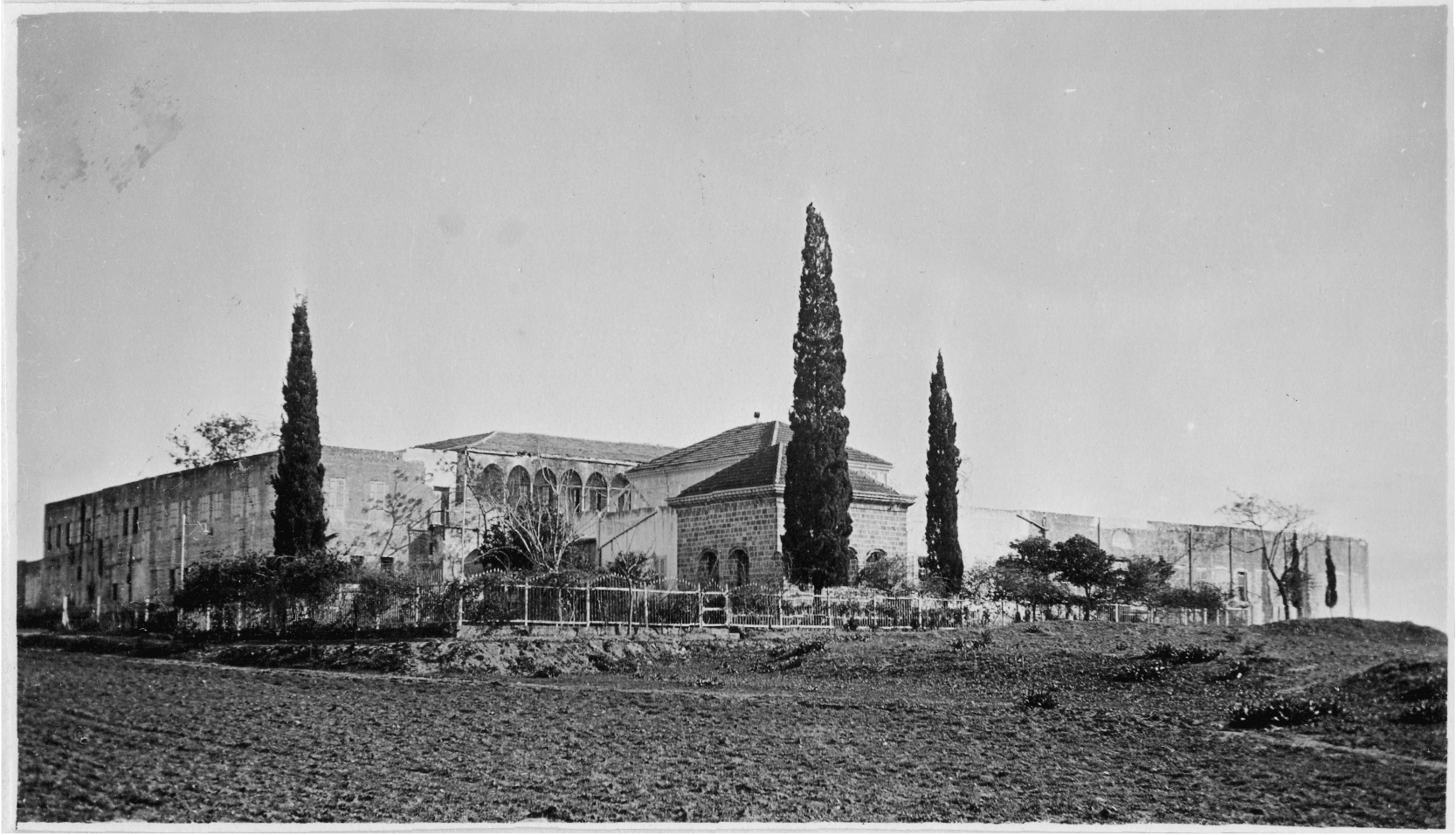
A rare early photograph of Bahjí showing the Shrine of Bahá'u'lláh, the Mansion of Bahjí, and the two-story house built by the Covenant-breakers, who stole the keys to the Shrine. © United States National Bahá'í Archives, used with permission.
In a profoundly despicable act, Mírzá Muḥammad-'Alí had seized the keys to the Shrine of Bahá'u'lláh on 30 January 1922, and for an entire year, the Guardian fought to get the keys rightfully returned to him.
On 13 June 1922, the dispute over custody of the Shrine of Bahá'u'lláh was reported to Winston Churchill, stating a number of telegrams from around the world supported Shoghi Effendi’s’ claim.
By 23 June 1922, the government of the British Mandate in Palestine was forced to intervene and a temporary arrangement that the keys of the Shrine of Bahá'u'lláh should be held by the Sub-Governor of 'Akká and be made available to Bahá'í pilgrims and visitors and posted a guard at the entrance, but a decision as to who had the custodianship of the Shrine would not be reached for several months.
In early 1923, the keys were finally, at long last, and forevermore returned to Shoghi Effendi.
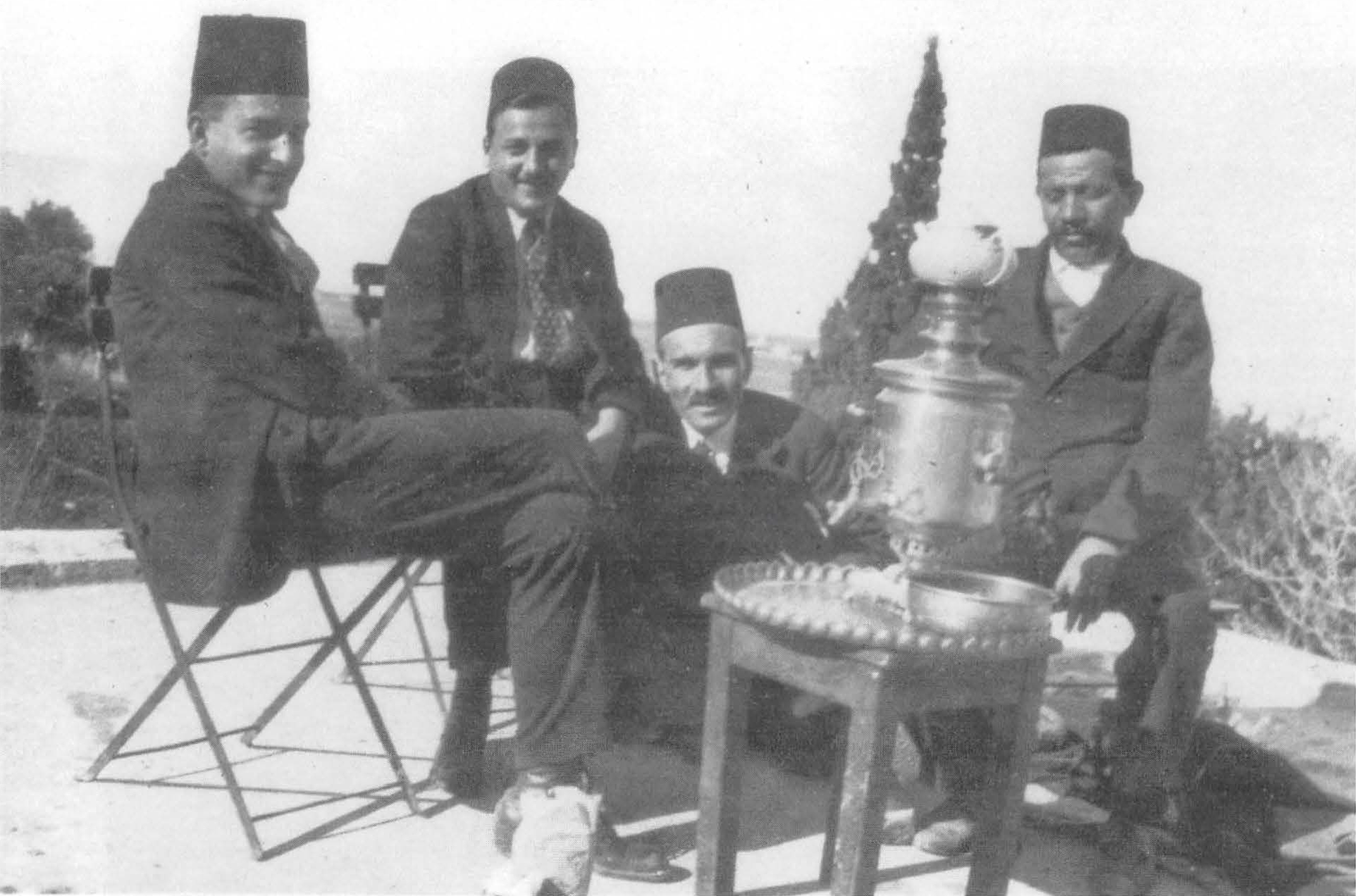
Shoghi Effendi on the roof of the barn at ‘Abdu’l-Bahá's home. Source: Bahaimedia.
During May and Mary Maxwell’s pilgrimage sometime in April 1923, Mary witnessed an event that not only showed her the depth of the Greatest Holy Leaf’s love for the Guardian and her deep anxiety about his safety.
The event stayed with Mary for decades afterwards.
One day while they were in Haifa, there was a large meeting for Bahá'í men in the downstairs central hall of 'Abdu'l-Bahá’s home.
Mary had gone to rejoin the women and Bahíyyih Khánum in an adjoining room that opened onto the hall.
They were sitting in the dark so they could leave the door open and hear what was happening, since it was the custom at the time, that men and women attended different meetings.
A Persian Bahá'í, utterly overcome with emotion had apparently gotten up and thrown himself at Shoghi Effendi’s feet.
The Greatest Holy Leaf could not see what had happened, but she heard a great commotion in the next room.
At 77 years old, Bahíyyih Khánum was already elderly and frail, but she jumped out of her chair with a loud cry her heart screaming out in pain. She was in deep anguish that something might just have happened to the Guardian.
The Greatest Holy Leaf could only be calmed down once someone entered the room and reassured her that her beloved Guardian was safe and sound.
The Greatest Holy Leaf worried constantly about her beloved Shoghi Effendi, no matter how her health declined and she got weaker. Her physical limitations never diminished the passion and ardor of her love for her grand-nephew, and her devotion and dedication to her beloved Guardian.
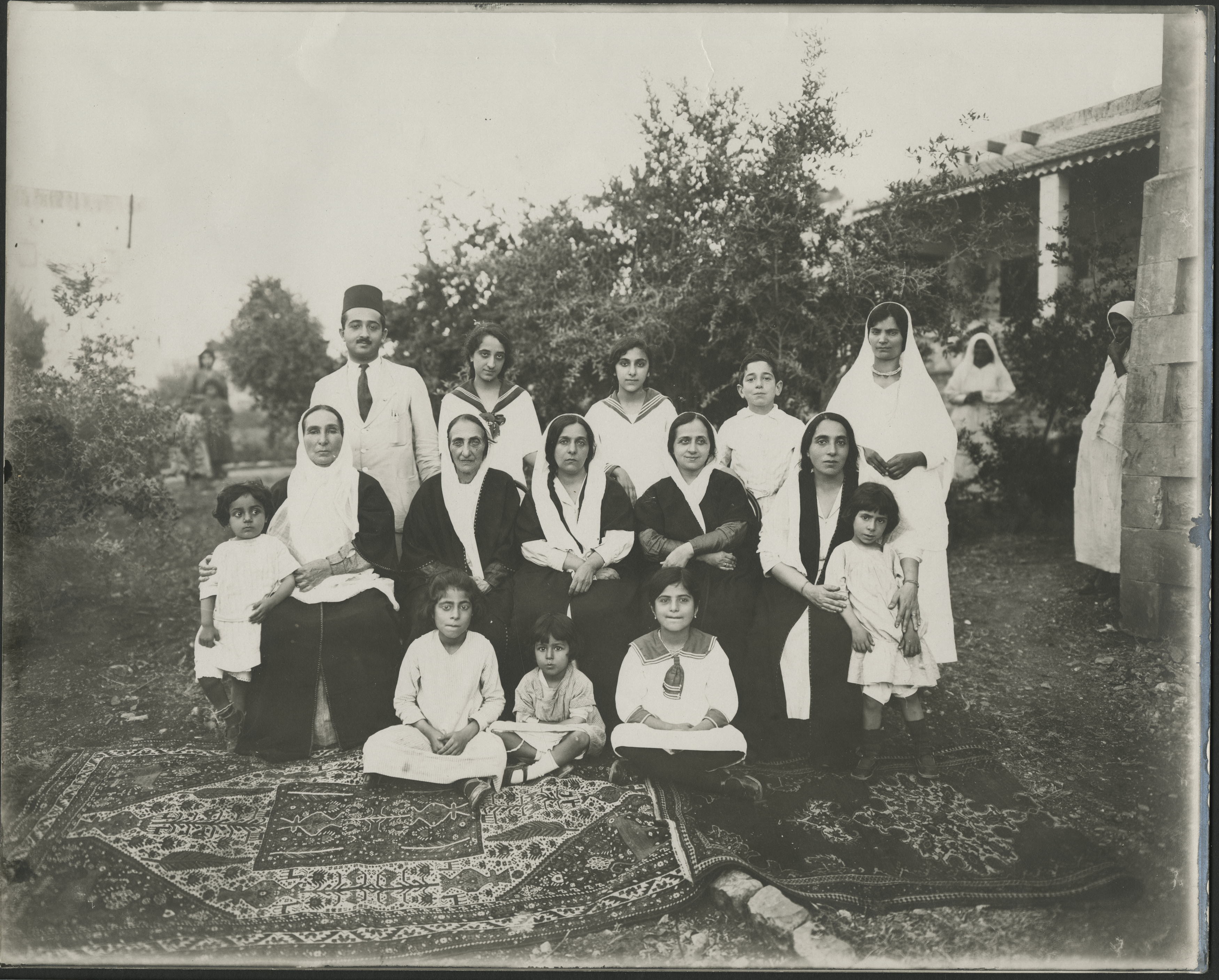
Group photograph taken in Haifa in 1920 with the Greatest Holy Leaf in the center. This photograph was taken as part of a series of photographs in the same setting with different people, but always with the ladies of the Holy Family seated in the center. A handwritten caption on the back of one of the photographs of the series reads:
“Photograph taken behind the houses of 'Abdu'l-Bahá and Rúhá Khánum in Haifa, Palestine in 1920. We understand this was the first time the ladies of 'Abdu'l-Bahá’s family had had their photographs taken or appeared unveiled and we were asked not to circulate the pictures. [caption is not signed.”
Seated, in the middle row are the women of the Holy Family. From left to right: The Greatest Holy Leaf, Munírih Khánum, Ḍíyá‘íyyih Khánum—the mother of Shoghi Effendi—Túbá Khánum, and Rúhá Khánum, three of the four daughters of 'Abdu'l-Bahá and Munírih Khánum.
© United States National Bahá'í Archives, used with permission.
Pilgrims who received the bounty of entering into the presence of the Greatest Holy Leaf, to see her, spend time with her, speak to her and learn from her were often deeply and strongly aware of not only the love that emanated from her but the strength behind it, and these experiences were often transformational for the visiting Bahá'ís.
One pilgrim wrote:
Just to sit and look into the eyes of the Greatest Holy Leaf, to feel that spiritual power which she is consciously pouring into the world today, is a bounty beyond words, and will assist a soul throughout all the worlds…If you go there with a spiritual hunger, and even a little freed from self, your heart will be filled to overflowing and you shall have tasted that water after which one will thirst no more.
Shoghi Effendi once clearly explained the bounty of being in the presence of the daughter of Bahá'u'lláh to another pilgrim, adding that the influence the person should felt should make its way back to their home in America and continue to affect people, stating that the Greatest Holy Leaf’s presence was “the remedy for all their troubles”:
You are most fortunate to be near the Greatest Holy Leaf, bodily close. I hope that you will be able to receive something of her spirit to take to the friends in America. Her spirit is the remedy for all their troubles.
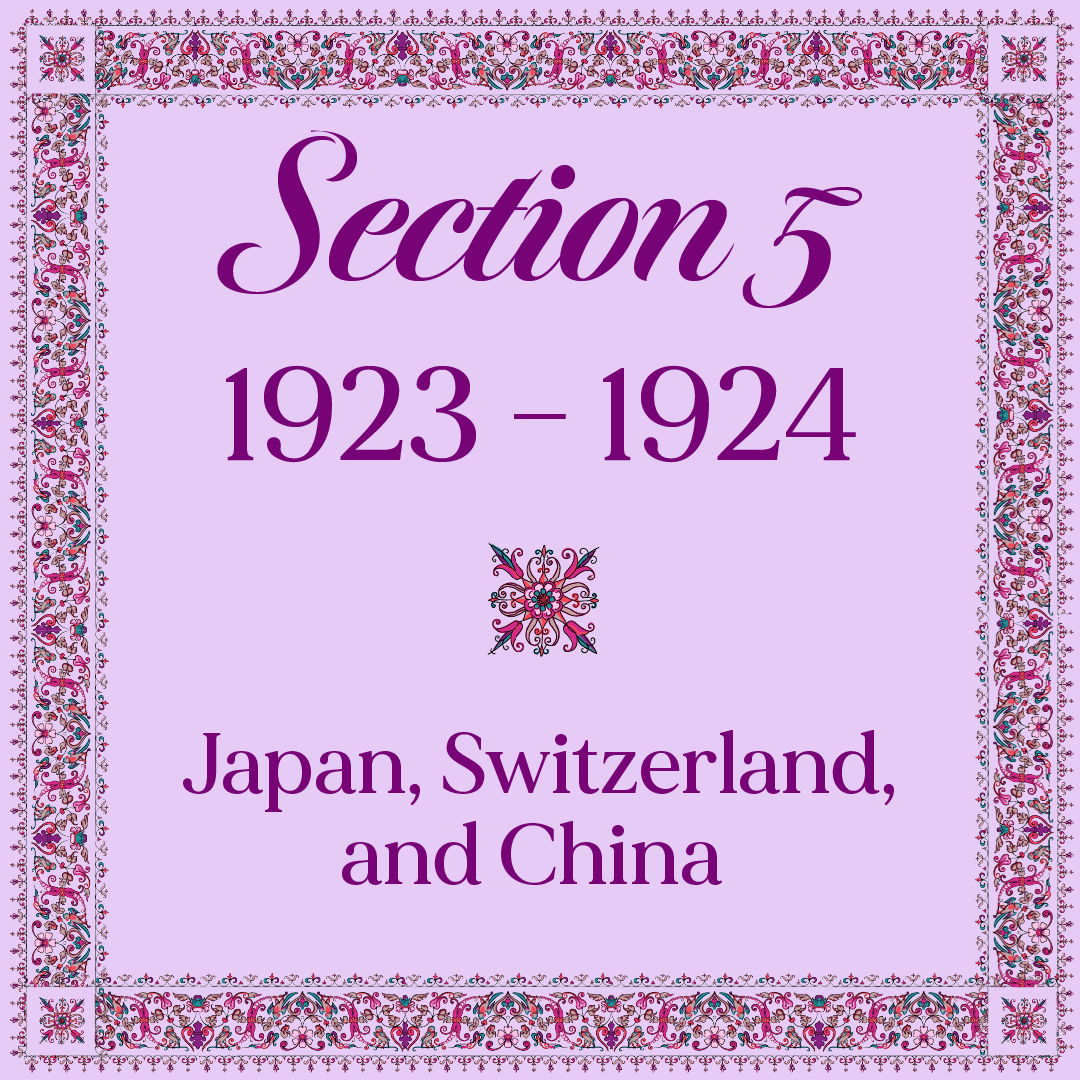
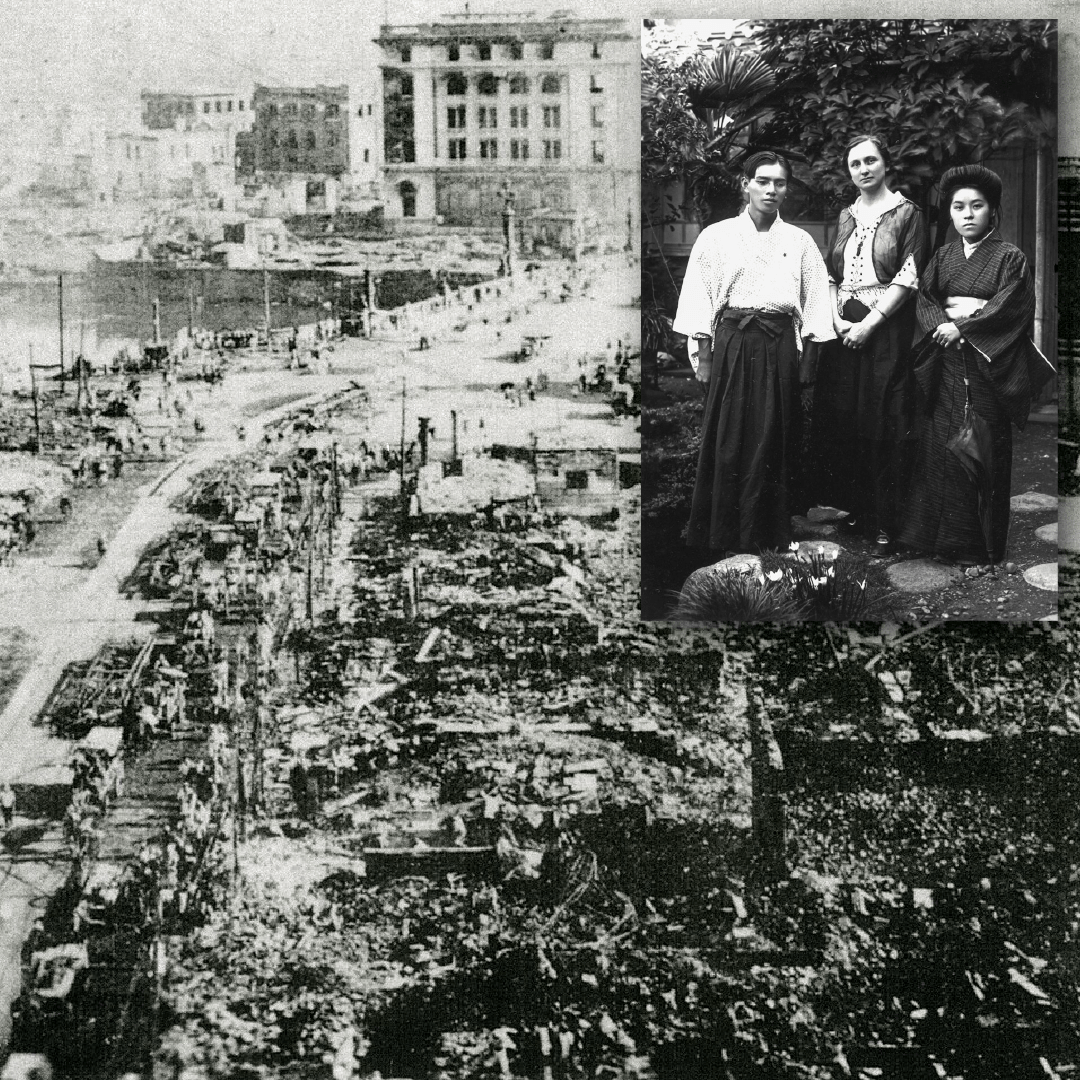
Photograph of the Great Kanto Earthquake. Source: Wikimedia Commons. Small photograph of Hand of the Cause Agnes Alexander with a group of Bahá’ís in Tokyo, Japan, November 1916. Source: Bahá'í Media Bank, © Bahá'í International Community 2024.
Agnes Alexander, the future Hand of the Cause and first Hawaiian Bahá'í, was in Tokyo, Japan, on Saturday 1 September 1923, exactly two minutes before noon, when a devastating earthquake shook the country.
She described the effect she felt in the capital city:
It shook Tokyo as a terrier does a rat, at noon when all the luncheon fires in the city were lit, and within a few seconds the city was ablaze from end to end…As soon as the first tremor subsided, I rushed into the house and procured my hand bag in which I carried the Prayer for protection revealed by 'Abdu'l-Bahá…When the earth began again to tremble, I read the Prayer aloud. Three times this occurred, and each time quiet came after the reading.
The earthquake, with a magnitude of 7.9 on the Richter scale—categorizing it as a major event—came to be known as the “Great Kanto Earthquake.” It lasted between 4 and 10 minutes, and extensive firestorms added to the death toll, which rose were estimated to be about 142,800 deaths, including about 40,000 who went missing and were presumed dead.
Agnes Alexander received letters of concern and love and consolation from Bahá'ís around the world.
But her most precious letter came from the Greatest Holy Leaf herself, and shows how closely she followed world events and where Bahá'ís were traveling at the time:
The Lord has surely kept you safe amid the crumbling walls of that great city of Japan, that you in turn might accomplish the task that lies before you and I never doubt that you are surely worthy of His Grace.
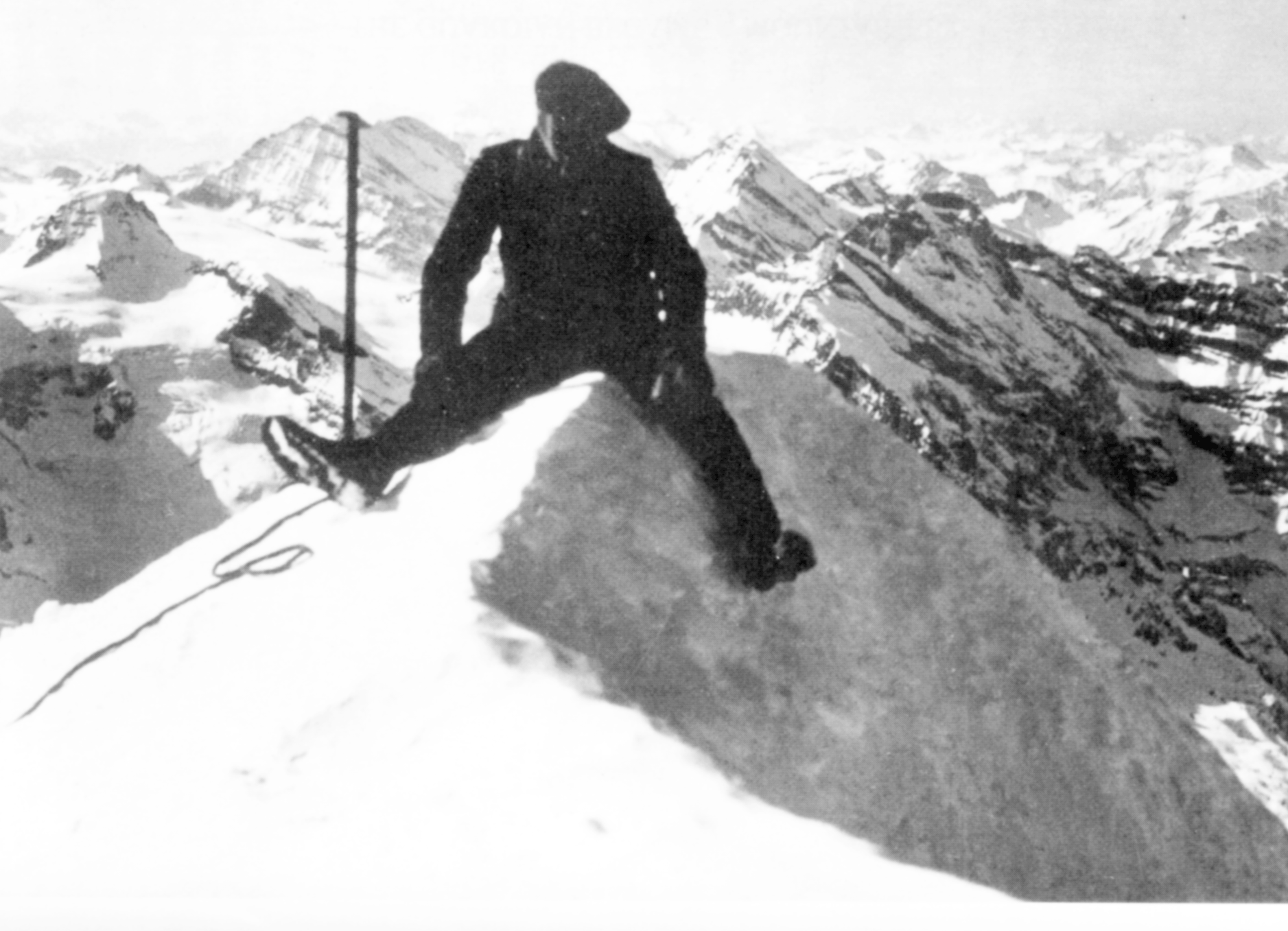
“The indomitable enthusiast”: Shoghi Effendi straddling an ice ridge on one of his climbs in the Swiss Alps. Source: The Priceless Pearl.
Shoghi Effendi was once again torn apart by the implacable demands of his station, and had been ground down, something he shared in his letters, writing "the storm and stress that have agitated my life,” “ill-health and physical exhaustion,” “bitter with feelings of anxiety and gloom.”
Bahíyyih Khánum stated that “for the second time [Shoghi Effendi’s] health failed.”
During Shoghi Effendi’s 5 month absence, Bahíyyih Khánum kept watch over the affairs of the Faith.
In a letter written a year later, on 28 March 1924, Bahíyyih Khánum spoke about Shoghi Effendi’s second absence in 1923 in the following terms:
…at the importunity of this evanescent soul and the urgent entreaties of the Holy Household and the repeated appeals of those in close association with him—he went away last summer.
From June to November 1923, Shoghi Effendi retired to Mr. Hauser’s cabin in Interlaken, and sought to rebuilt his strength and health by seeking solace in the solitude of endless mountain hikes.
Shoghi Effendi marked a complete break with his work in this retreat and cut off all communications with the Holy Land. He fled into the wilderness, soul-searching and communing with himself and his destiny, seeking to find the strength to return to what was waiting for him in the Holy Land.
These months in Switzerland were deeply meaningful to Shoghi Effendi, not just for the beauty of the scenery but because he loved Mr. Hauser deeply, and considered him a close friend.
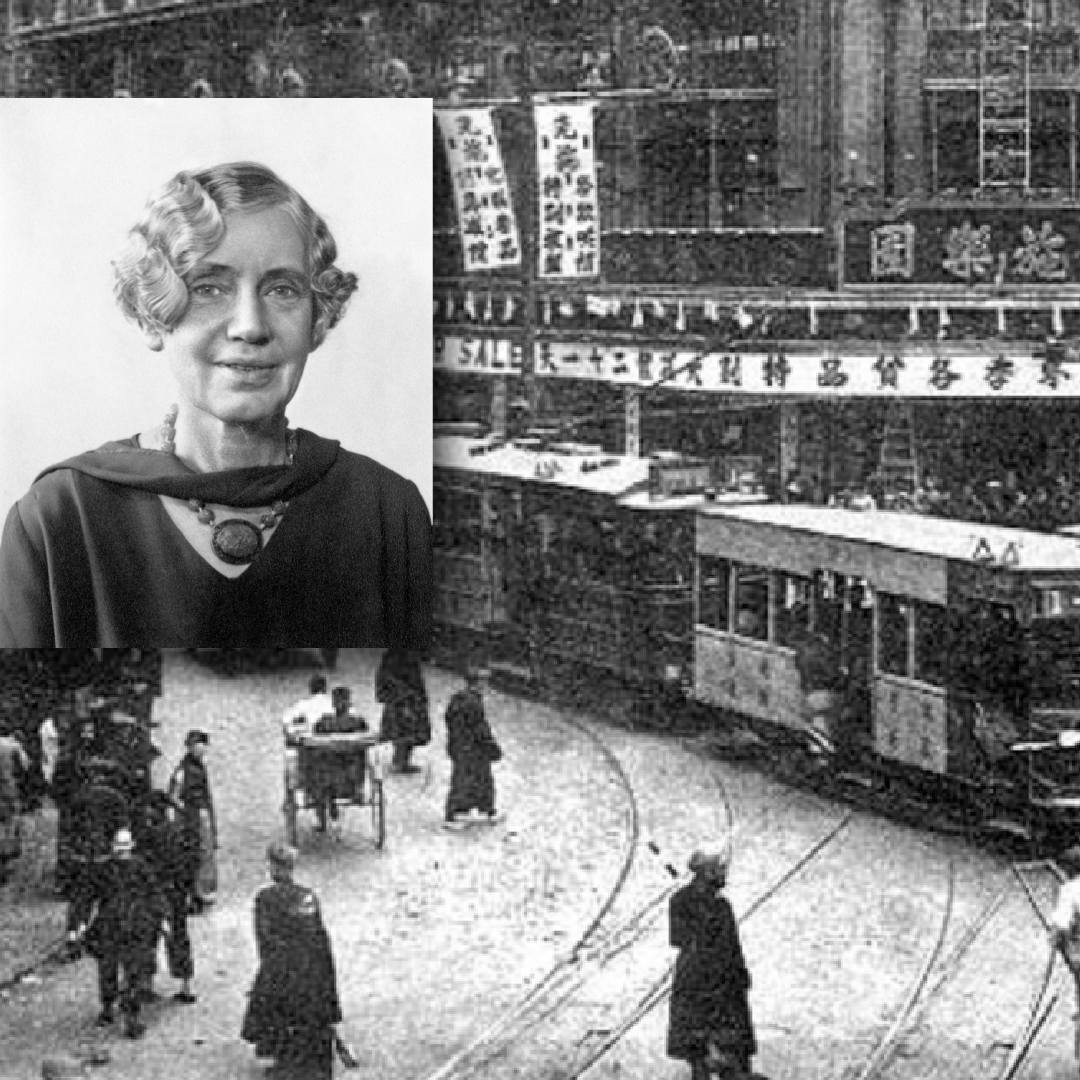
Background photograph of the Shanghai tram, British section, 1920s, John Rossman's collection. Source: Wikimedia Commons. Small photograph of Martha Root. Source: Bahá'í Media Bank, © Bahá'í International Community 2024.
Having arrived in China in June 1923, Martha Root toured the entire country giving endless talks, writing countless articles, giving interviews, teaching and proclaiming the Faith in city after city, region after region. It was an inhuman pace to keep, and Martha’s health was fragile: she had been struggling most of her life with breast cancer.
So when she was forced to pause her travels, she was devastated. Her frail body had let her down again, and she felt defensive when well-meaning Bahá'ís suggested she slow down the intensity of her activities.
Slowing down was not the way Martha Root did things.
Slowing down was not how Martha had won most of her outstanding victories in the field of teaching. She had won them by pushing through illness, pushing through pain, and overcoming impossible circumstances.
Martha Root had a 10-day lecture series lined up in schools and clubs in Shanghai before she could leave the city and she was very unhappy about being sick.
Then, she received a letter from the Greatest Holy Leaf.
It was a simple note, and the Greatest Holy Leaf had evidently asked a pilgrim to help her write it for Martha.
In the middle of this immense country, in the heart of China, the Greatest Holy Leaf sent love and encouragement to Martha Root when she needed it most. She told Martha Root that prayers were being said at the Holy Shrines for her health and for her teaching work in China.
Martha Root’s spirit soared.
She had gone from sad and despondent to beaming with joy and energy with just a few lines written by 'Abdu'l-Bahá’s wonderful, extraordinary sister.

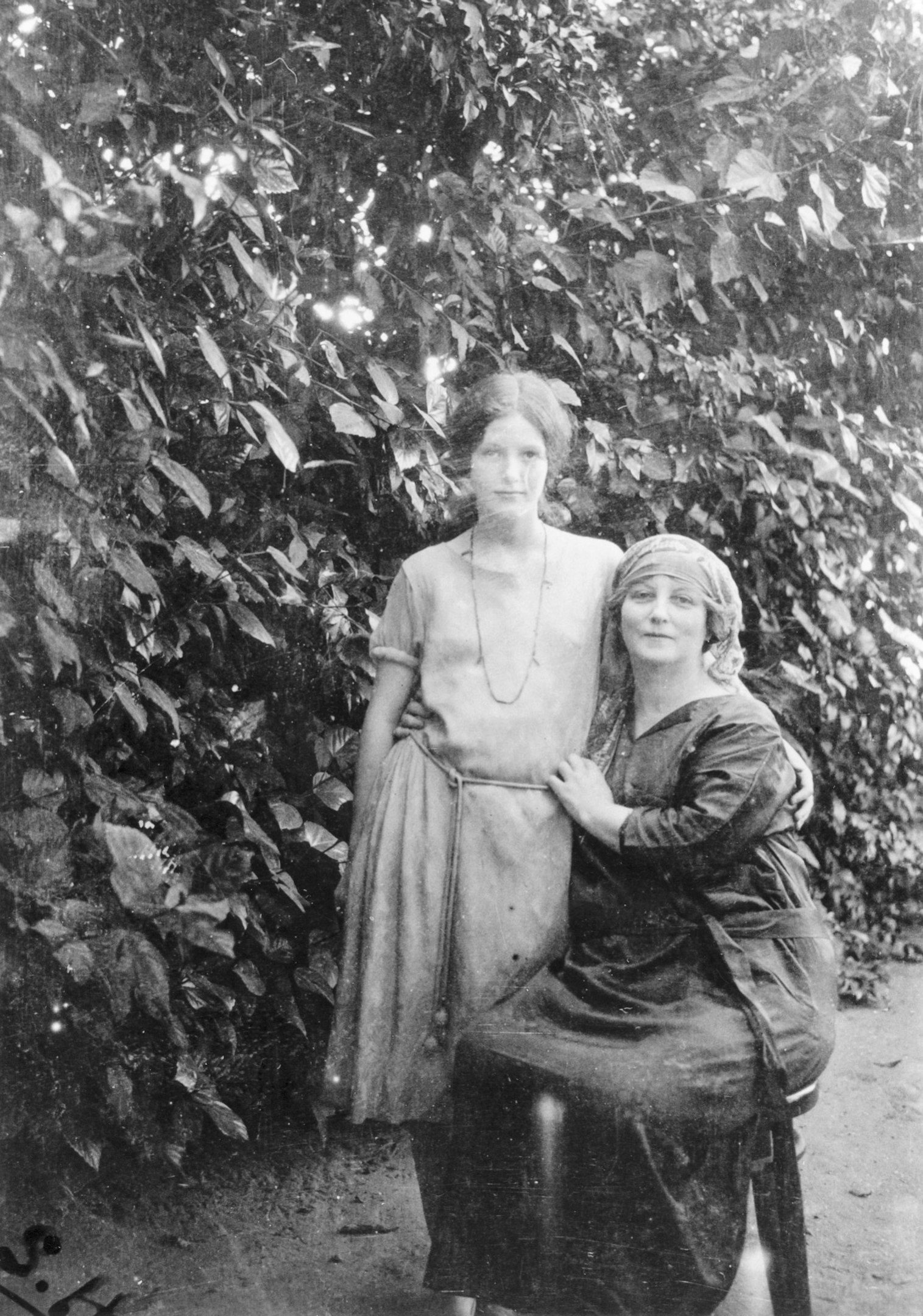
May and Mary Maxwell in Ramleh, Egypt in 1923 before returning to the Holy Land for the second part of their pilgrimage, once Shoghi Effendi had returned from his summer in Switzerland. Source: Bahá'í Media Bank, © Bahá'í International Community 2024.
Once Shoghi Effendi was back in Haifa, he summoned May and Mary from Egypt, where they had been living (and Mary had been collecting nearly almost ten pets from mammals to birds to reptiles) and they arrived in early January 1924.
Mary Maxwell was effervescent. When she returned to the Holy Land, she demonstrated a little dance called a “shimmy” which she had learned in Port Said for Bahíyyih Khánum, in full costume and makeup, wearing black kohl on her eyes.
Mary Maxwell put on such a show that she made the Greatest Holy Leaf laugh so hard tears streamed down her face.
William Sutherland Maxwell had had a stroke of divine inspiration when he insisted his wife May Maxwell travel to the Holy Land after the passing of 'Abdu'l-Bahá. The shock of the news had brought May close to death, and William Sutherland Maxwell had known only Shoghi Effendi could mend her broken heart.
Meeting Shoghi Effendi would fill May with a renewed sense of hope and energy. The Guardian brought her back to life, because May Maxwell was the definition of a faithful believer: she held fast to the Covenant, and 'Abdu'l-Bahá had given her the Guardian.
Pilgrimage in the time of Shoghi Effendi was different than in the time of 'Abdu'l-Bahá.
During the Master’s lifetime, believers came to pray at the Shrines but also basked in 'Abdu'l-Bahá’s presence. He was, after all, the Son of the Supreme Manifestation of God, as well as the Center of the Covenant and the Head of the Bahá'í Faith.
With Shoghi Effendi, everything changed.
Pilgrimage now focused on the Holy Shrines of the Three Central Figures of the Faith, and Shoghi Effendi refused attention directed to him as a person. He was the Guardian.
Shortly before her departure from the Holy Land, Shoghi Effendi told May Maxwell:
You are most fortunate to be so near the Greatest Holy Leaf, bodily close to her. I hope that you will be able to receive something of her spirit to take to the friends in America. Her spirit is the remedy for all their troubles.


Shoghi Effendi abruptly left Haifa in mid-March 1924 and went to Switzerland for 7 months, returning to the Holy Land in September 1924.
Two weeks after his departure, the Greatest Holy Leaf wrote two letters, almost identical in content, but vastly different in language, and conveying, word-for-word, a three-part message from the Guardian, which he had entrusted to her verbally two weeks before his departure from Haifa, sometime in mid-March 1924.
The first letter, written to the Bahá'ís of the east was dated 28 March 1924, and the second letter, written two days later to the Bahá'ís of the west was dated 30 March 1924.
Both letters are six pages long.
These letters are extraordinary for several reasons:
They were written by the Greatest Holy Leaf at the express request of the Guardian. In the letters, the Greatest Holy Leaf establishes her legitimate authority in addressing herself essentially to the Bahá'ís of the entire world. She introduces herself a prisoner, as a first-hand witness to both the Heroic Age and the Formative Age.
By 1924 when the Greatest Holy Leaf wrote these letter, she was by far the mots well-known Bahá'í figure in the world. She was the daughter of Bahá'u'lláh.
The Greatest Holy Leaf’s authority, her reputation, her lineage, her station and her rank give both letters an authority that acts as a message to immature Bahá'í communities who, if they were still questioning the 26-year old Guardian would never dare question the standing of the 78-year old Greatest Holy Leaf in the Bahá'í Dispensation and in the Bahá'í community.
The central message of the Guardian is of the importance of living a Bahá'í life and the crucial need of Bahá'ís to practice what the teach and live their lives as an example to those around them, watching them closely to see how they behave.
The Greatest Holy Leaf presents the Guardian in a heartbreaking light. She speaks of his deep suffering, his sensitive soul, explains his heartbreak at not being present during the Ascension of 'Abdu'l-Bahá, and they conveys how deeply hurtful and destructive to his well-being is disunity in the community, hinting at Covenant-breaking.
One fascinating aspect of the letters is that although each cover the same 8 themes, they are vastly different in tone, and content: the Greatest Holy Leaf addresses certain things in the letter to the Persian Bahá'ís that she does not cover in the letter to western Bahá'ís and vice versa. This shows not only the power of the Greatest Holy Leaf’s pen, her talent as a writer, but also her great cultural awareness.
In the letter to the east, the Greatest Holy Leaf uses more poetic terms, an almost more mystical, spiritual language. She does not need to cover in depth the history of the Faith during the Formative Age because the Bahá'ís of the east were very familiar with these events. However, in this letter, she does address Covenant-breaking at length, something she does not do in the letter to the west.
In the letter to the west, the Greatest Holy Leaf explains things in minute detail about her early life and the historical events of the Heroic Age which she witnessed. One aspect which is developed at great length in this letter is the struggles of the Bahá'ís of the west with obedience to Assemblies, and disunity in their communities, and feelings of ill-will between Bahá'ís.
The letters were both written after a crisis of Covenant-breaking in the Bahá'í world that occurred between 1922 and 1923 and involved Covenant-breakers such as Ahmad Sohrab and Ávárih. Both the American and Persian communities suffered from their attempts at sowing disunity and questioning the authority of the Guardian.

The 28 March 1924 letter to the Bahá'ís of the east can be found in Bahíyyih Khánum: The Greatest Holy Leaf by Bahá'u'lláh, Abdu'l-Bahá, Shoghi Effendi, and Bahíyyih Khánum, compiled by Research Department of the Universal House of Justice Haifa: Bahá'í World Centre Publications (1982): Excerpts from the letters of the Greatest Holy Leaf Selection Number 77, pages 200-208.
The 30 March 1924 letter to the Bahá'ís of the west can be found here at Bahá'í Library Online.

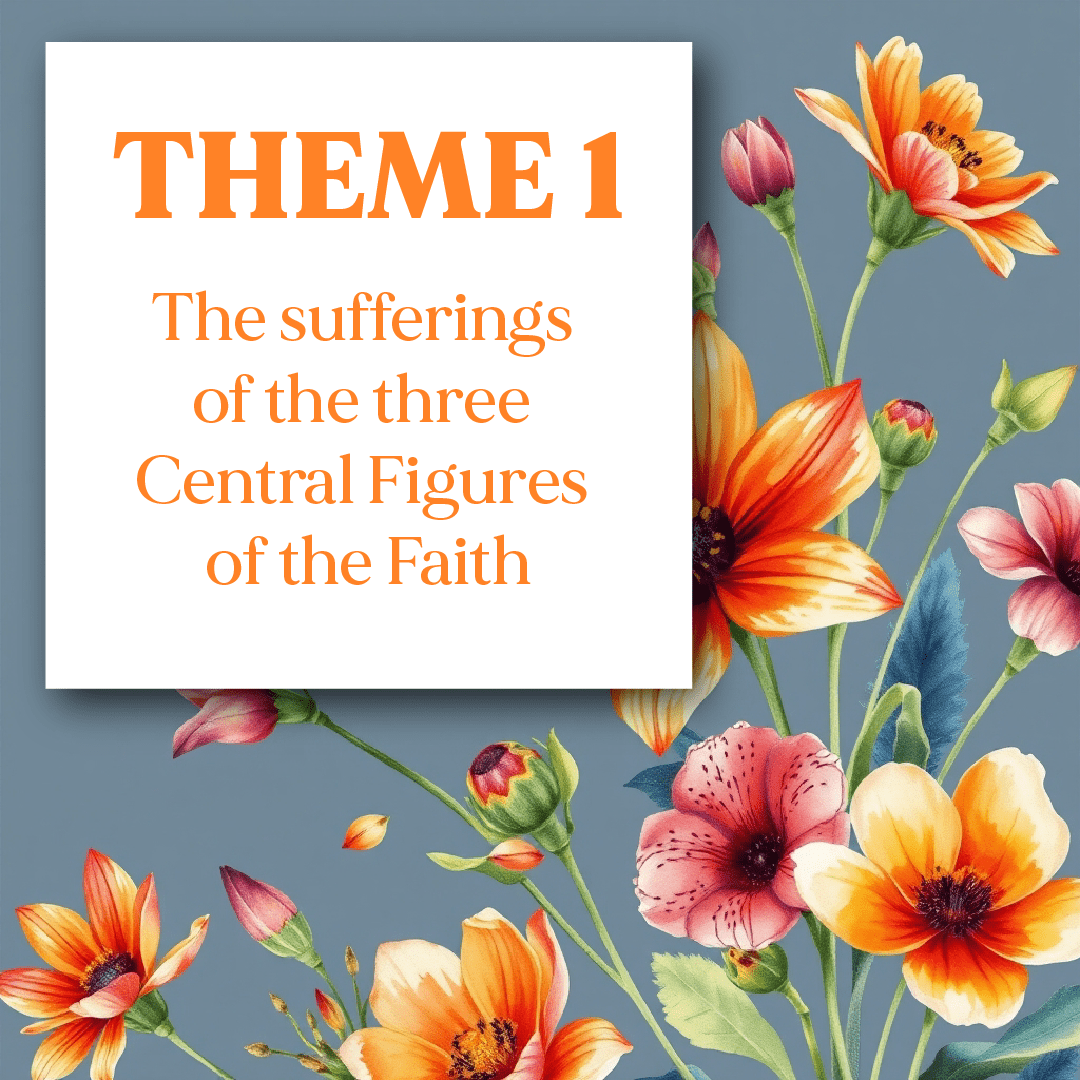
The Greatest Holy Leaf in the 30 March letter to the Bahá'ís of the west calls herself a witness to the Heroic Age.
The term is not used lightly.
In 1924, the Greatest Holy Leaf, at the age of 78, was the last direct and faithful living link to Bahá'u'lláh who had shared in all four of His exiles.
Bahíyyih Khánum opens both letters by recounting the ordeals and sufferings of the Báb, Bahá'u'lláh, 'Abdu'l-Bahá, and the martyrs of the Faith.
She itemizes their sufferings, describes them in detail, and it is impossible not to think of the current sufferings of the Guardian a she writes these heartbreaking words.
What is also evident, is that the reason the Greatest Holy Leaf places her position as witness to the events of the Heroic Age at the start of both letter is meant to serve as a reminder to Bahá'ís and Bahá'í communities reading that she is the daughter of Bahá'u'lláh, that she has not only a rank in this Faith but a station and gives the rest of her words in the letter a weight and an authority that no one on earth can claim except for the Guardian himself.
This is probably the exact reason why Shoghi Effendi asked his great-aunt to convey his messages to the east and the west. These letters are dated almost exactly two years from the day Shoghi Effendi became the Guardian of the Cause of Bahá'u'lláh.
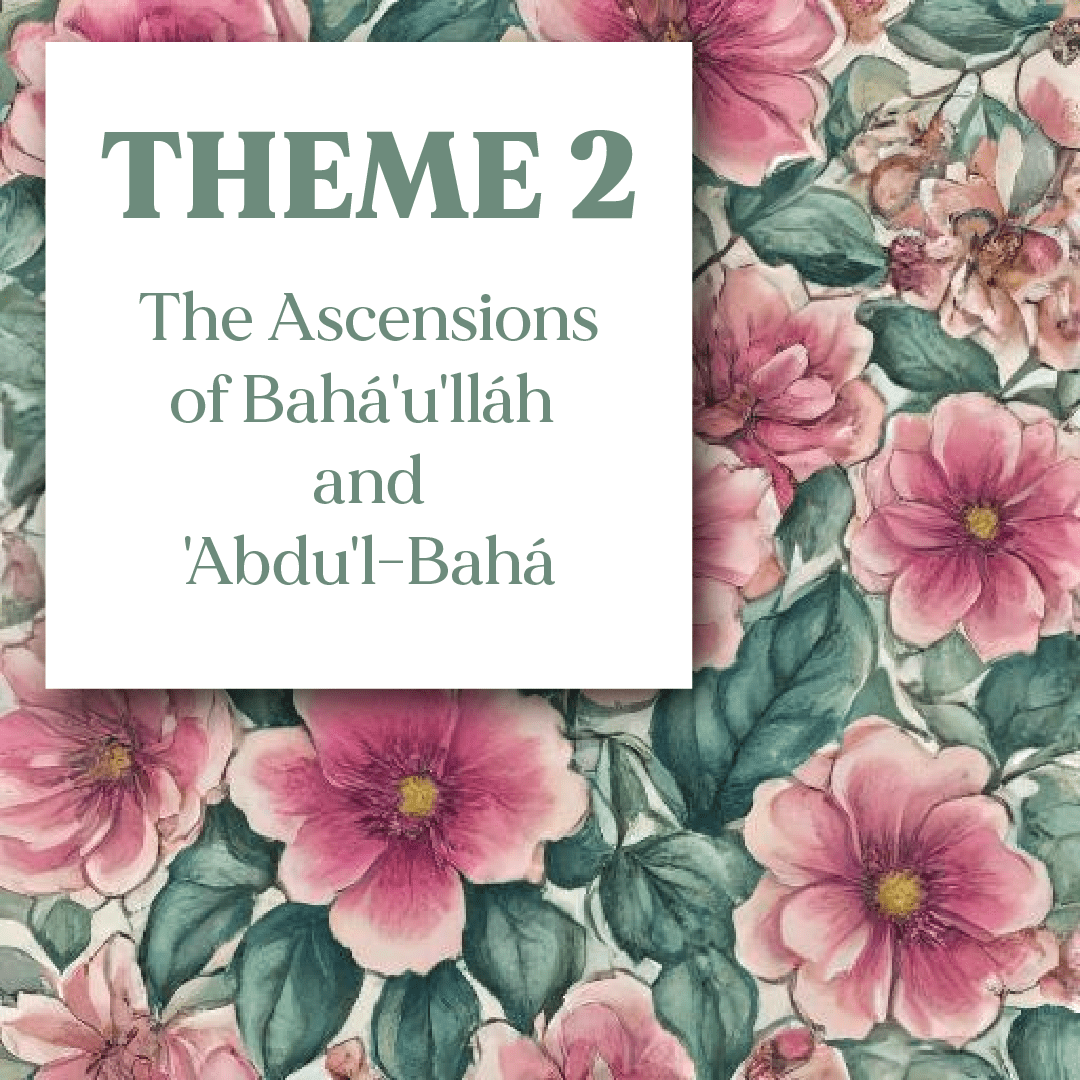
The second theme of both letters speaks about the Ascensions of Bahá'u'lláh and 'Abdu'l-Bahá as a way to introduce the main theme of the letter, further down, the disunity of the communities. She places these two events in the context of unimaginable suffering and crises.
The Greatest Holy Leaf describes in detail the impact on the Holy Family of losing both Bahá'u'lláh and 'Abdu'l-Bahá during their lifetimes, losing the Center of the Covenant when they had still not yet finished grieving the Ascension of Bahá'u'lláh.
This section is deeply touching and heart-breaking, but the Greatest Holy Leaf moves ono to her third theme as she slowly progresses towards the central subject of the letter, the three-part message from the Guardian which she is sharing with the Bahá'í world.
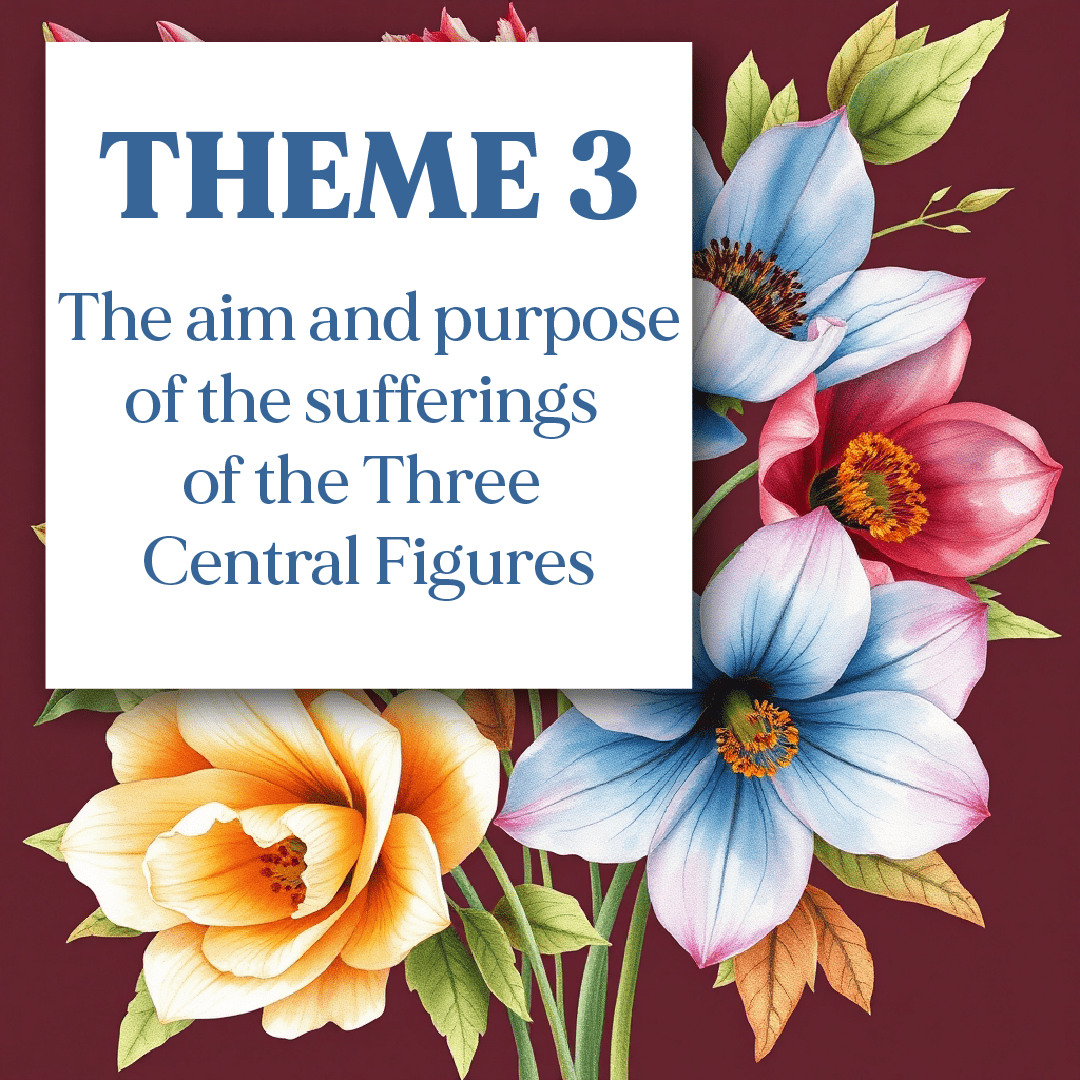
The third theme is the reason for which the Báb, Bahá'u'lláh, and 'Abdu'l-Bahá accepted lives of suffering.
The Greatest Holy Leaf makes it extremely clear that the Báb, Bahá'u'lláh, and 'Abdu'l-Bahá chose their path, and made a conscious decision to live a life of suffering, but she also explains why.
The purpose for their suffering was the betterment of humanity, the acquisition of perfect virtues, the development of a stainless character, living a Bahá'í life, rectitude of conduct, the refinement of human souls, sincere love, true friendship.
And with this reference to spiritual qualities, the main theme of the letter is unfolding, slowly approaching, and carefully constructed as the Greatest Holy Leaf moves closer to the central point of both her letters: how Bahá'ís should act and behave.
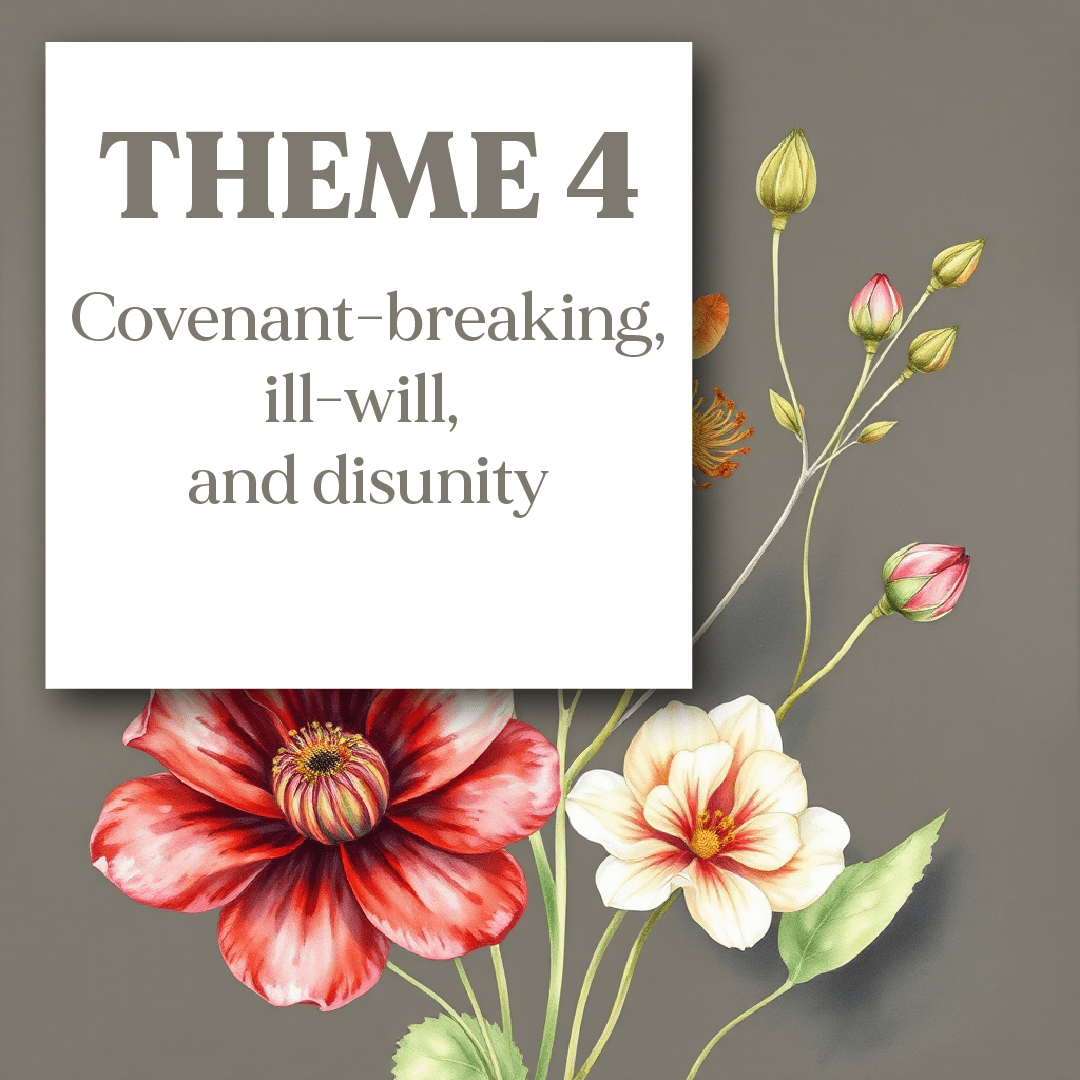
The Greatest Holy Leaf addresses head-on several issues plaguing the communities in the Persia and America.
She speaks of Covenant-breaking directly in the letter to the Bahá'ís of the east but not in the one to the Bahá'ís of the west. When speaking of Covenant-breaking, the Greatest Holy Leaf explains that the fracture took place immediately after 'Abdu'l-Bahá’s Ascension, and describes the unfaithful and their rebellion, calumnies, shameful behavior, and their ultimate failure. This was the reason that Shoghi Effendi, above and beyond his unbearable heartbreak at losing 'Abdu'l-Bahá, left the Holy Land for Switzerland the first time in the summer of 1922.
Another aspect mentioned in both letters is that Shoghi Effendi made a decision early on in his Guardianship—and given the enormous volume of mail he was receiving—to respond to individuals via their local Spiritual Assemblies. The response of some Bahá'ís to his decision was utterly shocking and they expressed their discontent in writing, and this was one of the reasons that broke Shoghi Effendi’s heart and forced him to retire to Switzerland in the summer of 1923.
A third aspect of disunity brought up by the Greatest Holy Leaf was that the Guardian was astonished to read in letters evidences of lack of love and unity among Bahá'ís, and their disregard and disrespect for their local institutions. This last crisis affected the Guardian so much that it prompted his third absence from the Holy Land for Switzerland two weeks before the Greatest Holy Leaf sent the letters, in mid-March 1924.
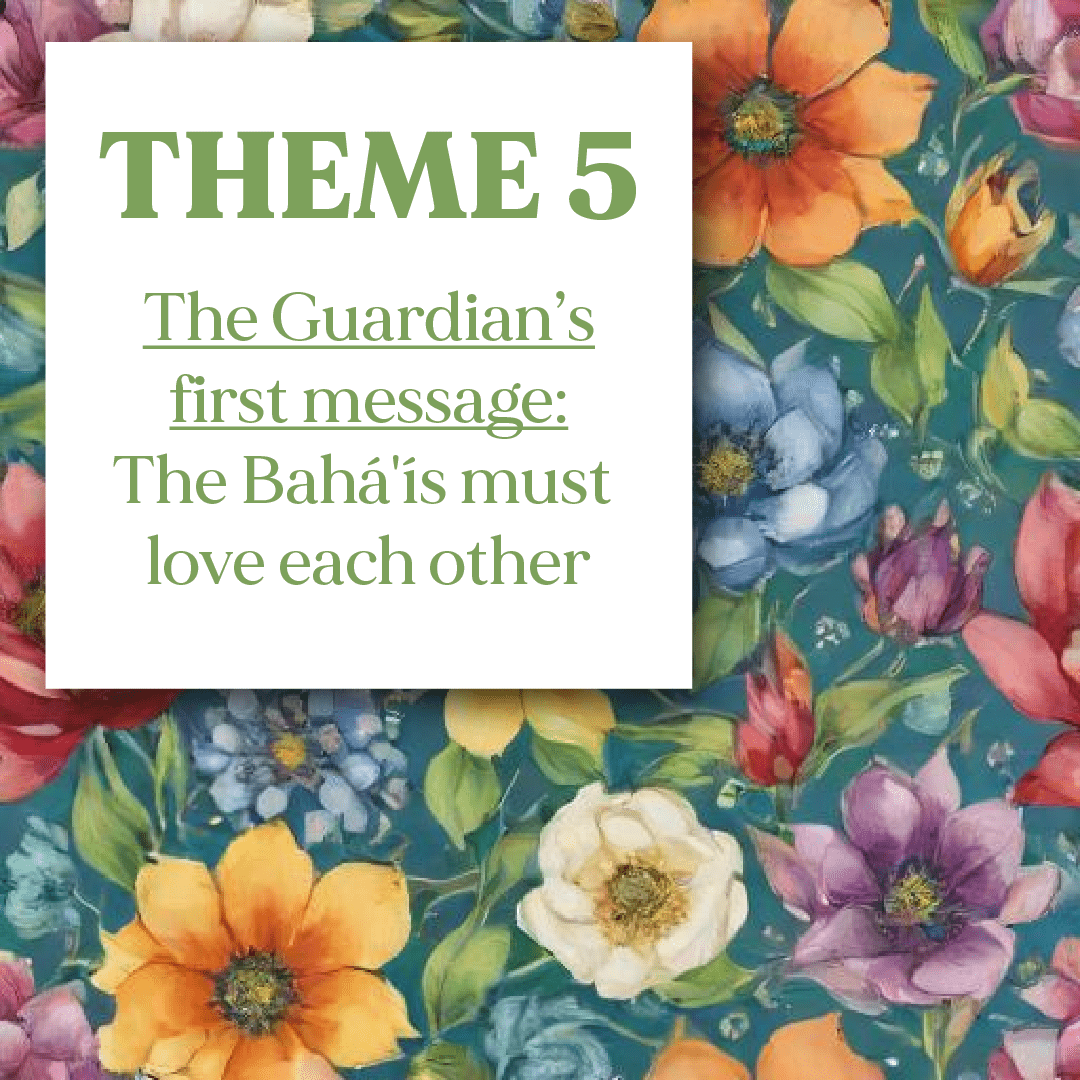
Two weeks before leaving for Switzerland in mid-May 1924, Shoghi Effendi spoke to the Greatest Holy Leaf and the members of the Holy Family at length, explaining the reason for his departure in detail.
This was not an informal conversation with the members of his family before his departure to Switzerland. The Guardian had assembled the Greatest Holy Leaf and his family because he had a three-part message to convey to the Bahá'ís of the east and the west and he wanted the Greatest Holy Leaf to be the one to bear this message.
He started speaking to his family and said four words, which go a long way in understanding the lifelong suffering of Shoghi Effendi as Guardian of the Faith:
My heart is sensitive.
The first of the three messages of the Guardian is that, although he is comforted and cheered by the love of the Bahá'ís for Bahá'u'lláh, the Báb, and 'Abdu'l-Bahá but he emphasizes that love is not enough for the Faith to truly succeed.
Simply put, for the Faith to have an impact on the world, for the claims of the Faith to be proven to the world, for the Faith to be protected, the Bahá'ís must love each other so much that they can never be disunited.
In fact, the Guardian uses a stronger word than love, he says the Bahá'ís should worship one another and shut any mutual ill-feeling out of their hearts.
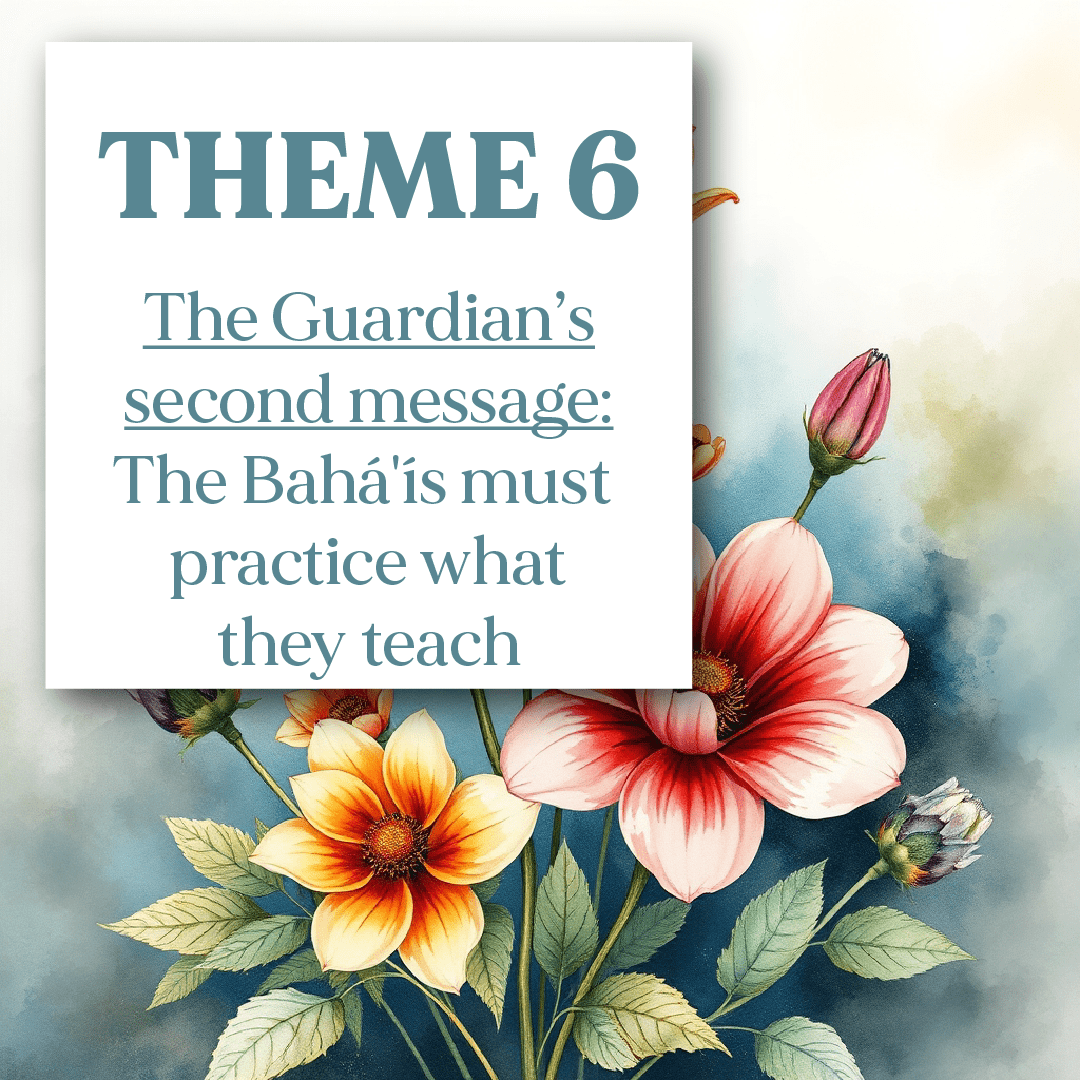
Conveying the second message of the Guardian to the Bahá'ís of the world, the Greatest Holy Leaf uses an incredibly modern and frankly astonishing technique: she recreates a back-and-forth dialogue that the Guardian spoke to the assembled members of the Holy Family.
This dialogue is between a Bahá'í and a non-Bahá'í and the non-Bahá'í begins by asking the Bahá'í what makes Bahá'ís different from everyone else.
Shoghi Effendi offers several answers, such as the Bahá'ís’ willingness to sacrifice everything for. Their cause, or the sanctified teachings and elevated principles of the Bahá'í Faith, but for every example, the Guardian plays devil’s advocate and proves that this reason is not enough to explain why Bahá'ís are different.
The only thing that can really change the world is not perfect principles and noble teachings, it is the effect these teachings and principles have on the people that follow them.
If the people are transformed, that is what has an effect on the world.
Only if Bahá'ís practice what they teach will they be effective.
Only if Bahá'ís allow the teachings to transform their everyday lives will they be examples worth following.
Only when their character is transformed can they, in turn, transform others and transform society.
As the Guardian says:
Unless this comes about, there is nothing to distinguish the Bahá'ís from the rest.
This is the central point of both letters. The transformation of character.
But the Guardian’s words are ominous:
UNLESS THIS COMES ABOUT, THERE IS NOTHING TO DISTINGUISH THE BAHÁ'ÍS FROM THE REST.
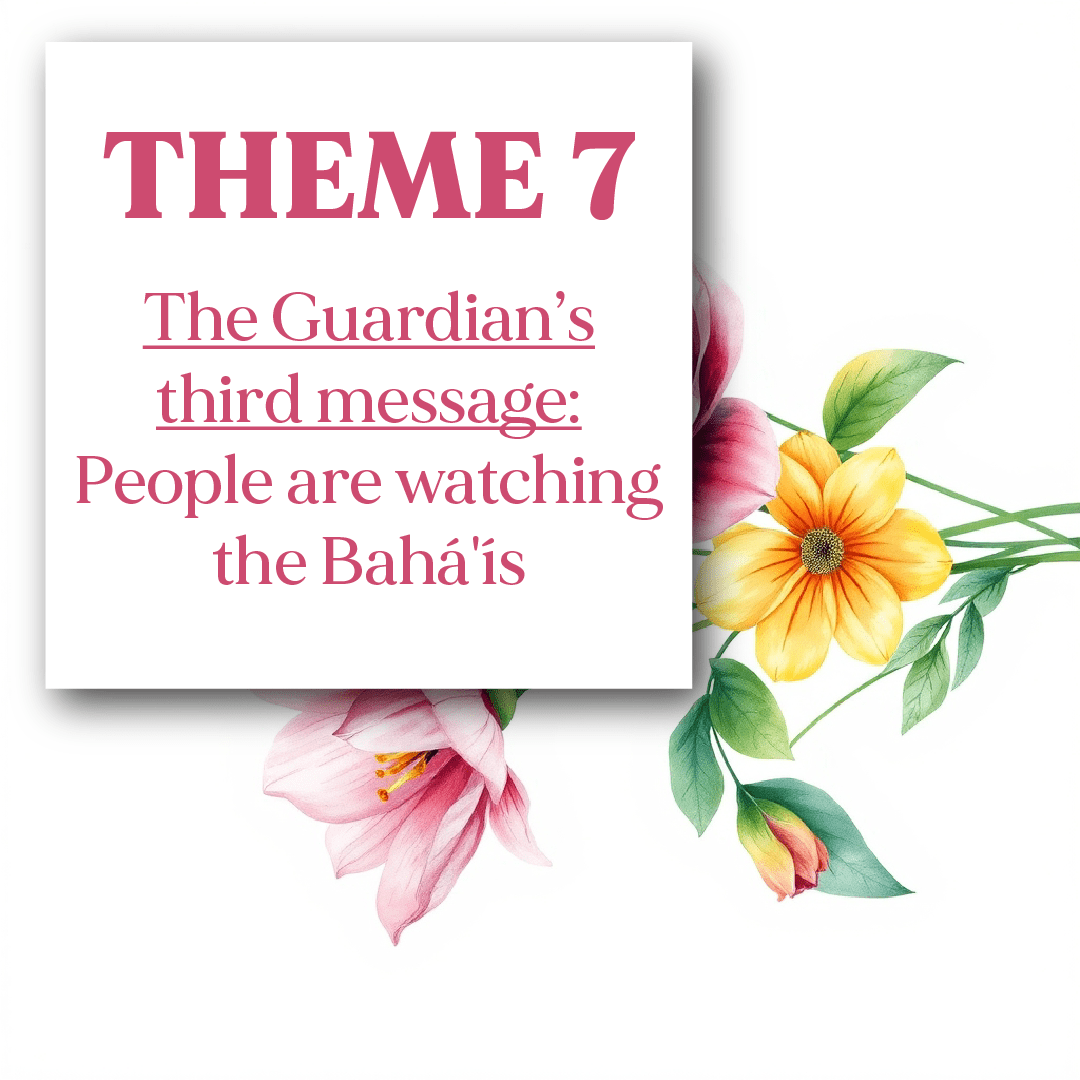
Immediately following the main theme of the letters, Shoghi Effendi raises a fascinating point, in a rather short paragraph.
In both letters, the Greatest Holy Leaf records what the Guardian said on this topic, and the difference in turns of phrase is very interesting.
In the letter to the east, the Greatest Holy Leaf quotes the Guardian as saying:
The people of the world are carefully watching the Bahá'ís today, and minutely observing them.
In the letter to the west, the Greatest Holy Leaf uses slightly different words with exactly the same meaning:
Many are carefully watching today the life and behavior of the Bahá’ís and many are trying to estimate the true value of the Bahá’í Movement and the effect that it shall have in the future through the ideas and self-sacrifice of its followers.
The Greatest Holy Leaf also shares the Guardian’s advice for Bahá'ís in this situation of constant scrutiny they find themselves in.
The Greatest Holy Leaf quotes Shoghi Effendi as telling the Bahá'ís they have to make every effort to remove any feelings they may have of estrangement towards each other and to consider themselves duty-bound to comply with the decisions of their Assemblies, and that Bahá'ís must wipe out from their hearts every trace of hatred or misunderstanding and replace it with genuine love.
In both letters, the Guardian makes his return from Switzerland depended on newly-rekindled unity and love in all the communities of the world.
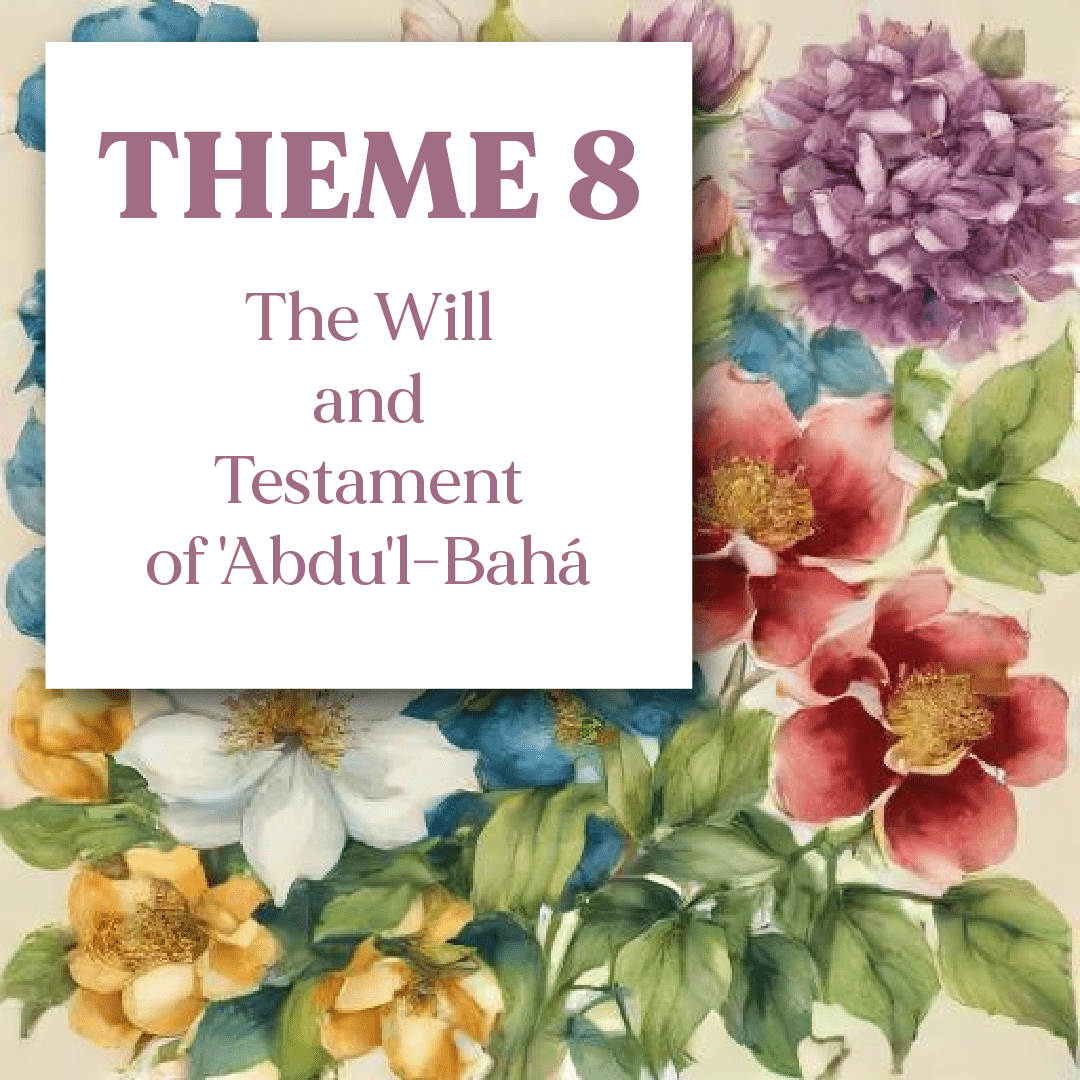
In the last section of both letters, the Greatest Holy Leaf closes powerfully with a reminder from the Will and Testament of 'Abdu'l-Bahá regarding how Bahá'ís should treat Shoghi Effendi. The passage Bahíyyih Khánum paraphrases from the Will and Testament is the following:
O ye the faithful loved ones of ‘Abdu’l‑Bahá! It is incumbent upon you to take the greatest care of Shoghi Effendi, the twig that hath branched from and the fruit given forth by the two hallowed and Divine Lote-Trees, that no dust of despondency and sorrow may stain his radiant nature, that day by day he may wax greater in happiness, in joy and spirituality, and may grow to become even as a fruitful tree.
This is typical of the Greatest Holy Leaf and her firm steadfastness, her attachment to the Covenant of Bahá'u'lláh, her faithfulness to the Writings of the Faith, her undying loyalty and support to the Guardian, her absolute obedience in all things to 'Abdu'l-Bahá.
These 28 and 30 March letters of the Greatest Holy Leaf to the Bahá'ís of the east and west are truly the words of a great, unflinching leader, putting the entire weight of her authority, her recognized station and rank behind the Guardian, and calling all Bahá'ís to abide by the Covenant and try harder to live up to Bahá'í standards, putting squabbles, bickering, opinions, divisions, and disunity behind them.
They are literary masterpieces.
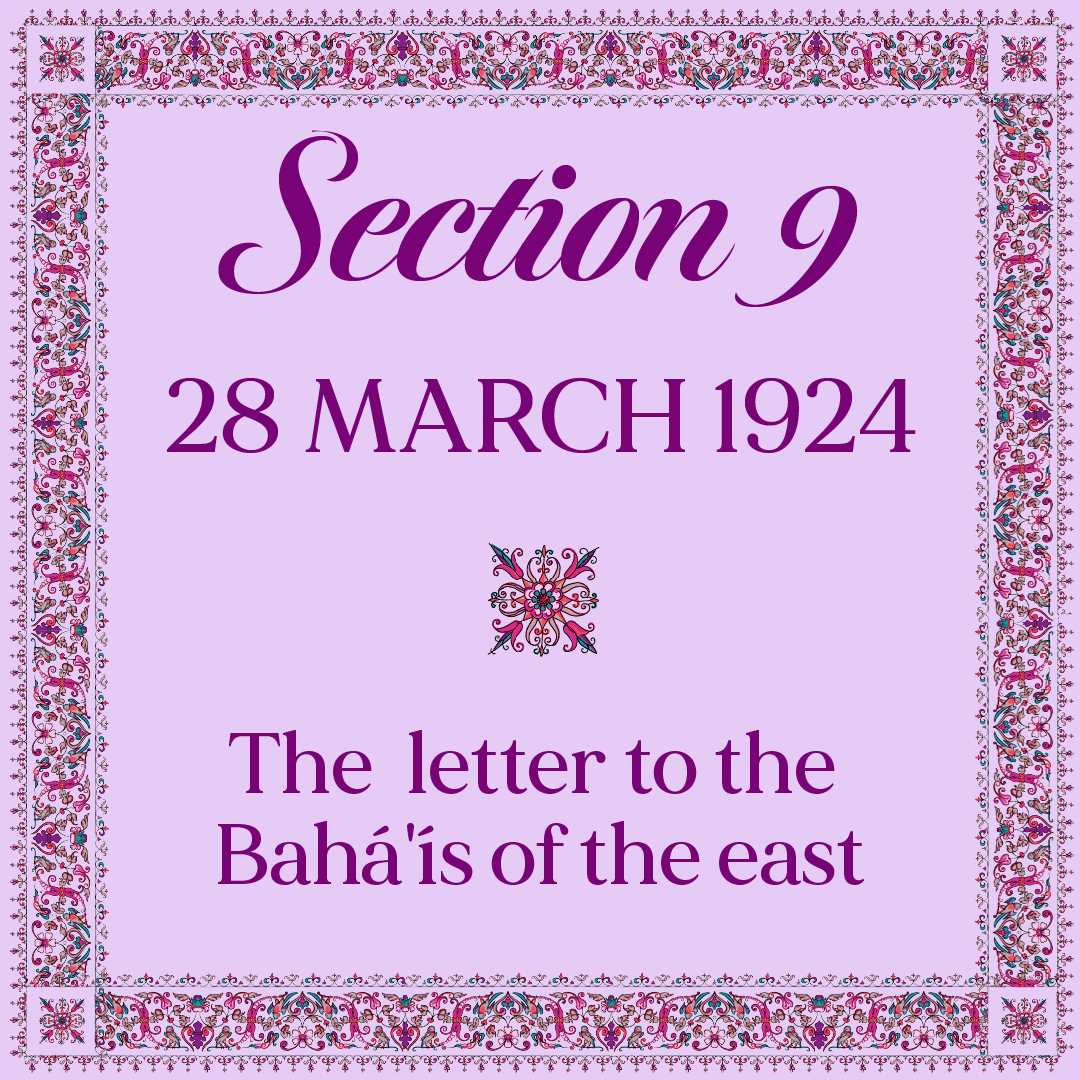
The Pen of the divine Ordainer has so decreed that this house of sorrows should be encompassed by unending calamity and pain. Even before the dark clouds of one disaster are scattered, the lowering storm of yet a new grief takes over, casting its darkness across the inner skies of the heart. Such has been the lot of this broken-hearted one and the other leaves of the Holy Tree, from earliest childhood until this hour; such has been the fruit we have plucked from the tree of our lives.
We can see before us the Holy Shrine where lies the blessed, riddled body of the Primal Point, and memory of the delicate and tender remains of other martyrs passes before our eyes. The remembrance of the Ancient Beauty's dungeon in Ṭihrán, and that most noble Being's exile from city to city, culminating in the murk of the 'Akká prison, is engraved upon our minds. The calamities, the massive afflictions, endured by ‘Abdu’l-Bahá throughout His entire life, and His wailing at the break of dawn are recorded for all time upon the tablets of the soul, and those cries that rose out of His luminous heart will linger on in the mind's ear.
It is clear, too, how the most dire of all ordeals, the Ascension of the Divine Beauty, made the structure of our existence to topple down; how being deprived of Him consumed the very limbs of our bodies. And when our fiery tears brought on by this were not yet dried, and the heart's wound had not healed over, then the bearer of God's decree called us to yet another anguish, that dire calamity, that terrible disaster, the passing of ‘Abdu’l-Bahá. Then were we, the sorrow-stricken, thrust again into the fires of separation, and the pitch darkness of deep mourning enshrouded this family.
Beloved friends of the Blessed Beauty: what could have been the purpose of those holy Beings in enduring such agonies? Why did those precious and luminous souls accept all that hardship and pain? Any just observer will acknowledge that They had no other end in view but to better the human race, and cleanse it from the imperfections of this contingent world, and see to its advancement, and endow all peoples with the wondrous virtues of humankind. Thanks be to God's bounties, the signs of such perfections, the lights of such bestowals, have become clearly manifest throughout the world. The tree of His Cause grows ever more massive, day by day, and heavier with fruit, and from moment to moment taller, and it shall cast its wondrous shade over all who seek its shelter.
The fruit of these boughs is plain to see: this Tree will bear sincere love and true friendship, traits of Heaven and qualities of God. This immortal Tree will yield kindness and humbleness, learning and wisdom, and the divine virtues.
The aim of those blessed Ones, then, those Temples of holiness, in enduring, over a whole century, all Their trials and tribulations, was to firmly establish a way of life whereby human character in general and that of God's loved ones in particular would be rectified. To such a degree must this come to pass that from their very breathing and walking, their rising up, sitting still, moving about, their every act—it can clearly be seen that they are different from those others who are neglectful of God and veiled away from Him: that they can be distinguished from the others as easily as you can tell the day-star from the dark.
Although through the mighty influence of the Word of God the inner self of each of the friends and of those who are steadfast in His perfect Covenant is held fast by the magnet of His love, and they are known in every land by this distinguishing characteristic and are everywhere illumined by this light —still the thing to remember is this: until the accidental events which arise from the world of the trivial and the personal are completely lost in the world of the universal, that is, in the bounties and attributes of the Merciful—that true and primal glory can never be revealed as it merits, nor ever show forth the beauty with which it is endowed. Let every steadfast soul ever bear in mind the anguish of those holy Beings and the trials They endured, and because of the wrongs They suffered, and the blood of the martyrs in His path, out of pity for what has befallen God's Cause and His Law, put the good of the Cause before any other good, and its honour before any other. Let him face every problem, whether minor or major, with goodwill and purity of motive. Let him not make of God's Law, created as it was to bring about unity and love, a means of discord. ‘Abdu’l-Bahá says: “If religion be the cause of disunity, then irreligion is surely to be preferred.”
Today as well, the Chosen Branch, the Guardian of the Cause of God, is at all times waiting expectantly —and indeed, it is the most cherished desire of his heart—to see this reality, this proof of serious effort, this feature that distinguishes the Bahá'ís from all others, clearly and unmistakably revealed in the life of every single Bahá'í.
As is well known, at the time when the Day-Star of the Covenant did set, the Chosen Branch was absent from this luminous Spot, and when he received the terrifying news of that direst of ordeals, he was overcome by a grief such as no words can describe. Broken in health, his heart brimful of sorrows, he returned to this blessed place. At that time the unfaithful, with extreme perversity and at a high point of rebellion, were openly and secretly spreading their calumnies, and this behaviour of theirs added still more to the Guardian's burden of grief. He left, therefore, and spent some time in seclusion, carrying on the affairs of the Faith, seeing to its interests and its institutions, communing with God, and imploring His help.
The Lord be praised, because of the divine bounties, during his absence there were such evidences of staunchness and loyalty and high resolve and unity and love and fervour among all the friends, men and women alike, both of East and West, and in the Holy Land—that on the one hand the Centre of Sedition, and the arrogant and the malevolent, found themselves utterly defeated, their hopes of making a breach in the Faith bitterly disappointed, while on the other, the exemplary quality and sound condition of the believers, as referred to, was a comfort to the Guardian's heart. Thus he was able, happy now and in perfect health, to return to this Spot, and to carry out his sacred obligations.
By this time a great many matters of the utmost importance had accumulated, and letters were coming in continuously from individuals and communities, which for lack of time could not be dealt with individually. The Guardian therefore dispensed with replies to individuals and sent out general letters to the Spiritual Assemblies, in which in the clearest terms he set forth the obligations devolving upon all, and gave the friends his instructions. These basic spiritual guidelines were received by the believers with great delight and the utmost joy; they immediately put them into practice, and thus the preliminary steps were taken, and in every area progress was being made to an ever-increasing degree.
Now, however, as the letters continually streamed in, the contents of one or two of them showed that among some of the believers a certain ill-feeling had arisen, and further, that some did not, as they should, respect and duly defer to their Spiritual Assembly. It is obvious what an effect this kind of news, whether implied or clearly stated, had on the Guardian's heart, and what an unfavourable reaction it produced. The result was that for the second time his health failed, and then, at the importunity of this evanescent soul and the urgent entreaties of the Holy Household and the repeated appeals of those in close association with him—he went away last summer.
This proved of the greatest benefit to him, and his health was completely restored. And then, one following the next, there came in good reports from Spiritual Assemblies everywhere, and other gatherings and groups, and also individuals, and this brought him great joy; so much so that following that summer's journey, out of his intense love for the believers, he began to correspond even with individuals; and continually, in the various meetings, he would express his satisfaction with and praise of all the servants of the Blessed Beauty's Threshold and the loyal friends of ‘Abdu’l-Bahá.
Alas, however, once again in some communities, he noted from certain letters an absence of spirituality and good-fellowship among some of the friends, and a lack of respect among some for their Assemblies. Once more, as a result of this, his heart was filled with sorrow and once again he decided on departure. This lowly maidservant and the other members of the Household and all the Holy Leaves did all we could to blot away this grief from his radiant spirit. When in his presence, we would bring up all the good news that by the grace of God continued to pour in, and to speak of the staunchness, the loyalty, the love, the sacrifices of the believers both of East and West. We begged him to reconsider his decision—but to no avail.
He told us:
“My heart is sensitive. Just as I feel the ill-feeling that exists between individuals, and am injured by it, so too do I treasure the excellent qualities of the believers; indeed, I hold these dearer than words can tell. After that most dread ordeal, the one and only solace of my heart was the loyalty, the staunchness, the love of the friends for the Blessed Beauty and for ‘Abdu’l-Bahá. Nothing can ever detract from the value of such excellent qualities, and I am deeply grateful to all the friends, men and women alike, for this. And yet, this love of theirs, with all its fervour, can never, by itself, bring the Ark of the Faith to the longed-for shore. It can never prove the claims of the people of Bahá to the people of the world. To safeguard the religion of God and reinforce its power, the friends must make use of effective means: their love must be so great that they worship one another, and shut any mutual ill-feeling out of their hearts.
If, for example, the non-Bahá'ís should ask the friends, ‘What differentiates you from all the rest?’, and if, to this, the friends answer, ‘In the pathway of our love for the Centre of our Faith, we would sacrifice our lives and possessions,’ those of the civilized world would never be content with such a reply. They would merely say: ‘Your love, your sacrifice for a single individual cannot possibly serve as a remedy for the chronic ills which plague society today.’
If the friends then answer: ‘Our religion provides principles and moral teachings whose value the wisest of the day cannot deny,’ this will be the response: ‘Noble principles and teachings will produce an effect on human character, and heal the mortal sicknesses which afflict society, only at such time when those who claim to believe in and support them are themselves the first to act upon them, and to demonstrate and incorporate the value and the benefits of them in their own everyday transactions and lives.’
Unless this comes about, there is nothing to distinguish the Bahá'ís from the rest.”
He also told us:
“The people of the world are carefully watching the Bahá'ís today, and minutely observing them.
The believers must make every effort, and take the utmost care to ward off and remove any feelings of estrangement, and consider themselves duty-bound to comply with the decisions of their Spiritual Assemblies. To the same degree that ill-feeling among some of the believers has cast its shadow on my heart, to that same degree will my heart reflect their mutual agreement, understanding and loving affection, and their deference to the authority of their Spiritual Assemblies. And whenever I shall feel such lights reflected, I will at once return to the Holy Land and engage in the fulfilment of my sacred obligations. Convey this message of mine to all the friends.”
It is now two weeks since he made this touching statement and left the Holy Land.
O dearly-loved ones of ‘Abdu’l-Bahá! We know from His sacred Will that we must “Take the greatest care of Shoghi Effendi ... that no dust of despondency and sorrow may stain his radiant nature” and that the tree of his spiritual being may bear fruit. We must ever keep this in mind, and from hour to hour we must develop our heedfulness, our love and affection, our sagacity and magnanimity.
It is the hope of this writer that the friends of God will put forth such efforts, and will so radiate their love for Him, as to light up the world; a love that will make the heart of the Guardian leap for joy, and then, God willing, he will soon come back again, so that before I close my eyes upon this life, the separation I endure will be over, and I can bid you all farewell with a happy heart. My only joy, in these my numbered days, and the joy of the Master's consort, rests in the hands of those well-loved friends of ‘Abdu’l-Bahá.
Upon you be the glory of the All-Glorious.

Beloved Friends:
It has been my share ever since the divine call to a better and nobler life was first sounded amid the cities of heedless and distracted Persia, to be a witness to the stirring and heart-rending events that form part of the annals of our dear Cause and that stain its pages throughout with innocent blood. The memory of that youthful and God-sent Herald, the Báb, who faced execution with nobility and heroism for the upliftment and true regeneration of mankind, lies vivid in our thoughts, and His blessed remains resting on the slope of Mount Carmel keep the recollection of His short but glorious life still more fresh.
The torture and ghastly deaths that the innumerable martyrs of the Cause so willingly chose unto themselves, and the manifestations of an unflinching faith and an undaunted fortitude that crowned the life of those blessed souls and that still lie untold to many, haunt me every day. The thought of our Lord Bahá’u’lláh brought up with the luxury known only to few, and yet choosing to spend many a month in a choking dungeon away from His kindred and loved ones, and then carried as a homeless exile until He was taken to the penal town of ‘Akká and imprisoned there as a religious criminal, fills my heart at once with a deep affliction and an overpowering veneration. And the numberless ordeals and hardships, deprivations and torments that our dear Master ‘Abdu’l-Bahá so patiently and quietly bore are vivid before my eyes.
After having witnessed all these painful events and after having passed through them all it was again my share and that of the Holy Mother and the Holy Leaves to suffer the bitter bereavement and cast all human bonds away that attached us to our Lord Bahá’u’lláh. The separation was too great for our feeble hearts and yet with His help and consolation we patiently bore it; but the effect of His last days on earth and of the bounties that He has showered on everyone of us had not yet been wiped away from our hearts when we were afflicted with another calamitous event so great for our frail and feeble frames that we thought we would surely succumb to a loss so much beyond our imagination.
The farewell days of our master ‘Abdu’l-Bahá, His touching yet, mysterious goodbye to a family that had had its little share of His brimful cup of a life-long sacrifice and that had stood by Him in the darkest hours ever known; His excessive love for His zealous fellow-workers and followers in every country, and His genuine yearning to see the Cause He adored on the highway of universal acceptance are all I think beyond human expression.
Let us then, affectionate brothers and sisters, ponder for a while upon the underlying reason that had made God’s divine Messengers prefer a life of torture to one of ease, and those blessed martyrs, so many of them cut off in the springtime and promise of their youth, choose death with faces radiant with joy. What did the Báb sacrifice His promising youth for except out of a burning desire to have mankind live in unity and peace; and what was the spirit that animated those bold and heroic martyrs but love and adoration to a Cause they wished to triumph?
What made Bahá’u’lláh born and brought up in opulence, fling away all earthly possessions and choose upon himself unspeakable hardships and deprivation, save for an earnest appeal to the world at large to turn their hatred for one another into genuine love, and to make a world seething with blood a peaceful home for God’s children; and why did ‘Abdu’l-Bahá who could have chosen a life of ease and comfort, prefer to lead a crusade against the strongholds of human hearts and make a direct appeal to individuals as well as groups that unless we love one another with all our might and with all our heart we are absolutely doomed?
Their hatred for one another into genuine love and to make a world seething with blood a peaceful home for God’s children, and why did ‘Abdu’l-Bahá, who could have chosen a life of ease and comfort, prefer to lead a crusade against the strongholds of human hearts and make a direct appeal to individuals as well as groups that unless we love one another with all our might and with all our heart we are absolutely doomed.
He carried a crusade not with a sword of steel but with a sword of love and affection. And if we dare call ourselves Bahá’ís it simply means that we have to follow in their wake. It means that we must always have the public weal in mind and not give up ourselves wholly to our inclinations and desires, and it means that we must picture before us the perseverance and self-sacrifice of those early volunteers and make a whole-hearted effort to be like unto one of them; and it shall be only in this way that we can safeguard this great Cause of God.
This in brief, is what our beloved Guardian, Shoghi Effendi, is patiently and eagerly expecting from every single one of us. This, he says, should mark us from all other men and this should differentiate us from those to whom religion is something to believe in and not to inspire to action.
Our beloved Guardian was away in England when ‘Abdu’l-Bahá’s glorious life on earth was ended. The news of His departure was deeply felt by Shoghi Effendi, and to one who was so near and dear to the Master, this separation meant more than to many [others]. Weak in health and over-powered with grief he arrived in the holy land and the home wherein his Master lived was now deep in sorrow. And in those darkest hours of bereavement the life-long enemies of our Master, stirred by their idle imaginings, started their foretold and ill-fated activities.
This saddened Shoghi Effendi’s heart very much and he decided to choose seclusion for some time. Away from his family and his friends all by himself, he thought over the problems that face the Bahá’í Movement today, through prayers he sought help from his Lord and Master and he decided upon the temporary organization that would safeguard the interests of the Cause and that would encourage the dear friends to spread this Message and to live the life it teaches. For many months he was thus away, when feeling encouraged by the firmness and perseverance of the friends throughout the world and over the happy way they proved the activities of God’s enemies to be fruitless and of no avail, he returned back to the Holy Land fresh and hopeful and started helping and guiding us with a marvellous fervour and animation.
Finding that the individual letters were too many to answer in person and not wishing the progress of the Cause to be hampered by the slightest thing, he sacrificed sending his personal messages of love and encouragement to the individual friends and he expressed his heart-felt sentiments in general letters to Assemblies and countries.
The organization of the Assemblies was thus moving rapidly forward. The Cause was being spread in every country and Shoghi Effendi’s heart the happiest for it all.
Such were the conditions when he received to his utter astonishment letters that he noted showed lack of love and unity among the loved ones of ‘Abdu’l-Bahá. It grieved him very much to see some of those whom the Master so dearly loved, bear ill-feeling towards one another and through their lack of love and unity and through denial to follow the advice of their spiritual assemblies, relegate the whole standard of the Cause to a mere philosophy of life.
Such news had [a] great effect upon his tender heart and it reflected upon his physical health. Whereupon through the wish and desire of the friends then present in Haifa and through mine and the family’s insisted appeal, he consented to take a rest during the hot summer season all the happy news that we had received from abroad and that we had forwarded to him so filled his blessed heart again with encouragement and joy that upon his return from his summer rest he resumed his work with an astonishing zeal and activity.
His heart was joyful and in his evening meetings with the friends he always shared the news he had received from abroad and through his encouraging words he instilled such a fervor in every single one present that they all felt they would fly away and share in this noble task. Indeed his love for those earnest workers had grown so great that he had decided to make an effort and append to the answer of each letter a personal message in his own handwriting.
Again the unexpected took place and the news [received] from some centers that the spirit which ‘Abdu’l-Bahá said should characterize every Bahá’í community does not prevail and that many have belittled the guidance of the different spiritual assemblies. His heart was thus sore and depressed and he again decided to seek seclusion until the friends realized their great responsibilities and [to] make an effort toward real unity. I and the members of the holy family did all in our power to give him the happy news we had received from some countries and we begged him to change his decision but he said:
“My heart is very sensitive to such things. Inasmuch as I am rejoiced when I hear of true love and fellowship among my brothers and sisters, in an equal measure if not more, I am grieved when I hear that such is not the case. It is quite true that every Bahá’í heart swells with love and adoration at the mention of the Báb, Bahá’u’lláh or the Master’s name, and stands firm and true to the last Will of ‘Abdu’l-Bahá, and for that I am very thankful to them, but you agree with me that this alone cannot be the emblem of this world Cause. There should be love and sympathy among the individuals of every group and true affection for one another should be the stamp for their hearts.
Suppose a non-Bahá’í should ask us as to what should denote a Bahá’í and to differentiate him from everybody else, and were we to answer a hero-worship and adoration to the Center of the Cause that makes a Bahá’í willing to give up his life and property, he would be sure to answer you that that alone will not bring about the regeneration of the world.
That alone will not wipe out international hatred fostered for ages past, and will not solve the economic plight before which the world stands aghast today.
And were we to tell him that our religion proclaims certain principles that no one can challenge or deny, we would be told that principles alone are no proof of its effect either, and not until the Bahá’ís first translate these principles into their own everyday life and live according to the standard of the Cause they proclaim, will they be qualified to invite the whole world to come and follow their teachings. It is when the Bahá’ís prove their religion by no greater argument but actions and deeds that we are sure to be promulgating the Cause and that men will come and willingly join our ranks.”
And [then] he said, “Many are carefully watching today the life and behavior of the Bahá’ís and many are trying to estimate the true value of the Bahá’í Movement and the effect that it shall have in the future through the ideas and self-sacrifice of its followers.
The friends must therefore be very careful to wipe out of their ranks all feeling of hatred or misunderstanding and to replace it by genuine love. Just as discord among the friends has deeply grieved me, in every manner will their unity and harmony fill my heart with joy and win over my life and strength to themselves. I shall now leave and when I see that the conditions have changed and that sincere affection is the reigning force in every Bahá’í community, I shall at once return and cooperate with them with my heart and soul. Send this message to all my friends abroad.”
After these touching remarks, two weeks ago he again left us to ourselves.
Now brothers and sisters remember what our Master ‘Abdu’l-Bahá tells us in His last Will. Let us recollect the passage where He asks us not to do anything that will depress and grieve Shoghi Effendi or mar the shining brightness and radiance of his heart, but always to try to help him in raising this lofty edifice of world-brotherhood. May we not keep that always in our memory and strive forward toward a unity that shall not only win the heart of every non-Bahá’í, but shall to a larger and larger measure gladden our own and dear Guardian.
My days are numbered and my life is flying to a close and yet I feel certain that those dear ones abroad will accept this meager and humble appeal, and will make me cherish the hope that before I am called away and ready to separate in body from you, I can see genuine love and unity prevail among those my Master so dearly loved and I can witness with human eyes my Guardian’s heart overflow with joy. This is what I beseech you and may it be fully realized.
Your sister and fellow-worker,
(sealed) Bahíyyih
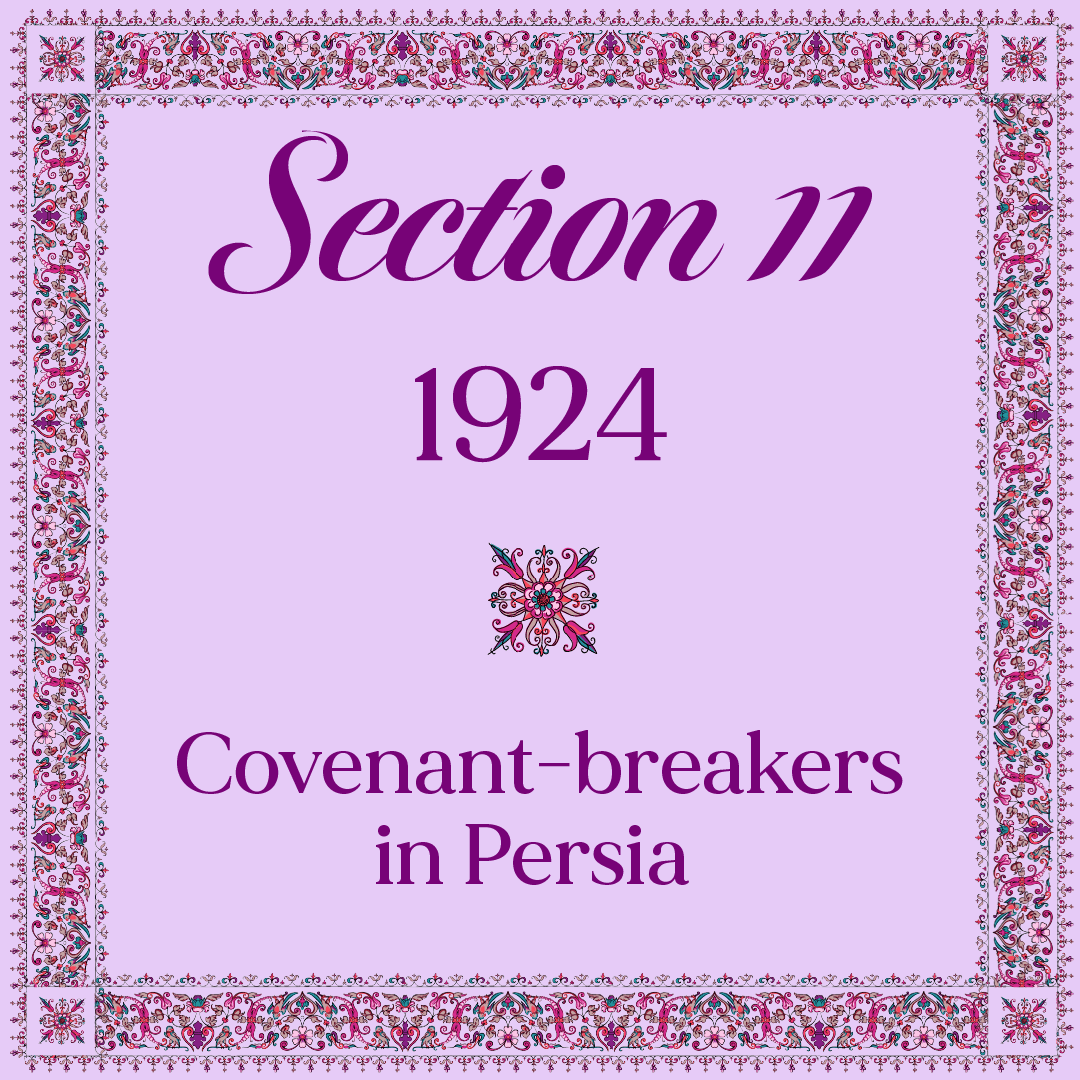
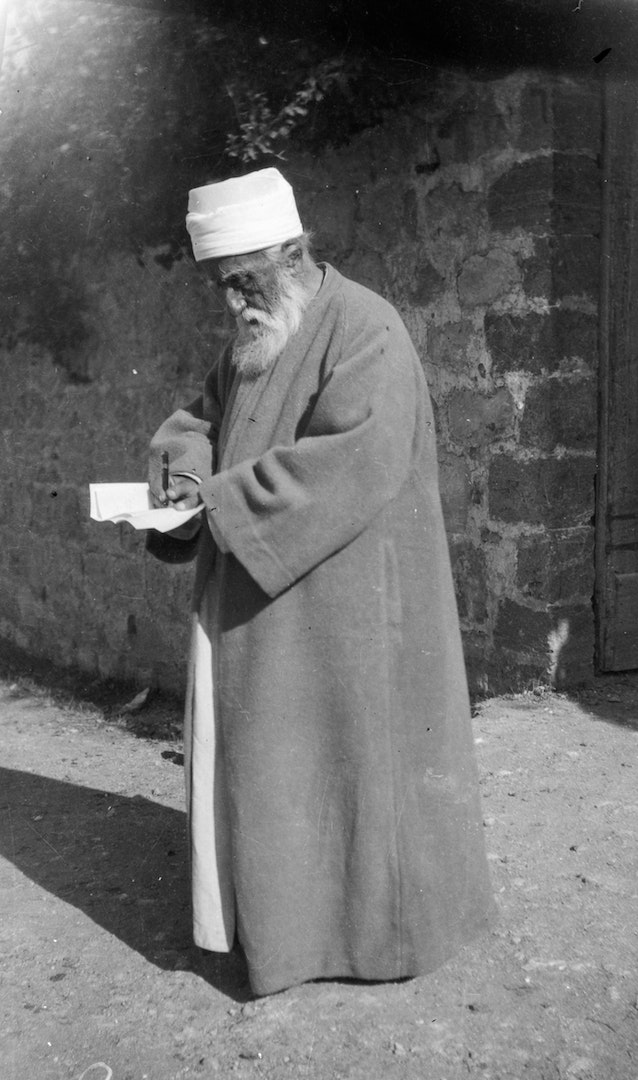
'Abdu'l-Bahá writing in Haifa around 1920. Source: Bahá'í Media Bank, © Bahá'í International Community 2024.
On 8 May 1924, the Greatest Holy Leaf wrote a letter to the Bahá'ís of the world and in one section of this lengthy letter, she speaks eloquently, passionately, with stunning poetry, love and great authority and passion on the Will and Testament of 'Abdu'l-Bahá.
This is yet another example of the Greatest Holy Leaf’s mighty pen and talent as an extraordinary writer.
Although the towering citadel of God's Cause is upraised on foundations of iron, and His Word is founded on authority and power, and the loyal and firm in His Covenant, through the blessings of the Abhá Paradise, stand immovable as the mountains, and are fast- rooted in their love—still, the hurricanes of tests are mighty as well, and from every side comes the thundering roar of violent commotions and bitter trials.
From these, at every moment each one of us should beg of God to defend and protect us.
Let us call to mind the clear statements and the warnings revealed by the Blessed Beauty, and the explanations and commentaries of 'Abdu'l-Bahá, particularly as found in His Will and Testament.
This Testament was the last song of that Dove of the Rose-garden of Eternity, and He sang it on the branch of the Tree of bestowal and grace. It was His principal gift, indeed the greatest of all splendours that radiated forth from that Day-Star of bounty, out of the firmament of His bestowals.
This Testament was the strong barricade built by the blessed hands of that wronged, that peerless One, to protect the garden of God's Faith. It was the mighty stronghold circling the edifice of the Law of God.
This was an overflowing treasure which the Beloved freely gave, a goodly and precious legacy, left by Him to the people of Bahá. In all the world, no gift could equal this; no dazzling gem could rival such a precious pearl.
With His own pen, He designated as Guardian of the Cause of God, Shoghi Effendi Rabbani, the Chosen Branch, and made him the “blest and sacred bough that hath branched out from the Twin Holy Trees,” to be the one to whom all must turn, the centre and focus of all on earth.
In unmistakable terms did He set forth the obligations and elucidated the nature of the institutions of God's Holy Faith.
He laid hold of discord's tree and brought it down. He forever shut the door on conflicting interpretations and views. With every breath ought we to offer praise and thanks to the God of Grace for this bestowal.
It is incumbent upon us to read and meditate on the contents of the Will and Testament at all times, and implore God at His Holy Threshold that He will aid us to carry out whatsoever it ordains.
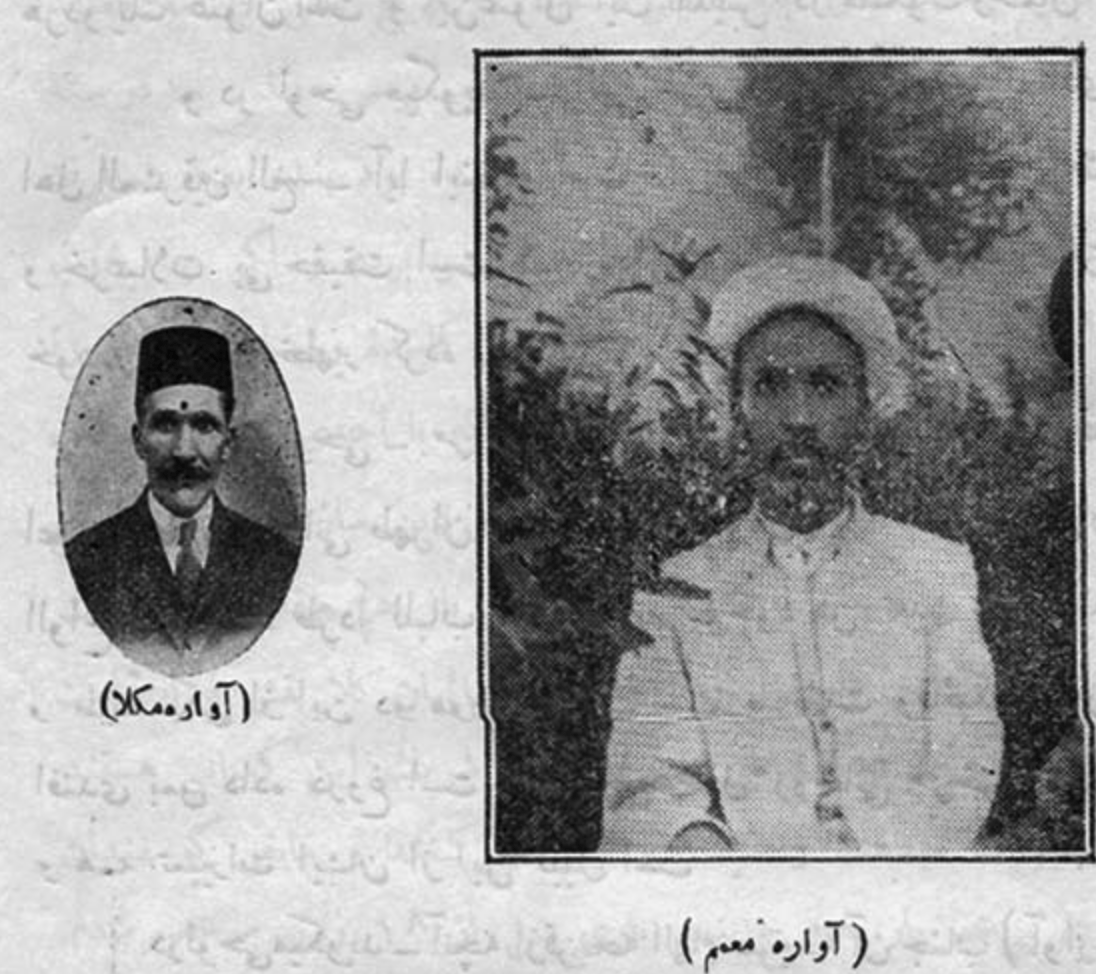
Ávárih on the left in his Covenant-breaking days and on the right as a cleric. Source: Wikimedia Commons.
‘Abdu’l-Ḥusayn Ávárih was a prominent Persian Bahá'í, well-known in the 1920s for having written and published a history of the Bahá'í Faith.
He had come to the consultative meeting in Haifa in March 1922, absolutely convinced the time had come for the election of the Universal House of Justice, and bitterly disappointed when the Guardian chose to develop the Bahá'í Administrative Order.
Shoghi Effendi had sent Ávárih to England first, to strengthen the Bahá'í community but Ávárih’s ego grew with the exceedingly kind treatment of English Bahá'ís. By January 1923 he was in Egypt and starting to sow seeds of doubt in the minds of the Bahá'í. He caused so many problems in Cairo that the Local Spiritual Assembly wrote to the Guardian who invited Ávárih to Haifa, again.
In Haifa, Ávárih, who was then 52, was completely uninterested in consulting with the 24-year-old Guardian, and decided to speak to someone of his generation. So he approached the Greatest Holy Leaf and, in essence, threatened that if his demand to call for the election of the Universal House of Justice was not taken seriously, he would foment a rebellion against Shoghi Effendi and the Guardianship.
When Ávárih arrived in Persia in 1924, he began actively opposing the Guardian.
He shared his misconstrued ideas, his obsession with electing the Universal House of Justice, and created divisions in the Bahá'í community of Persia.
In May 1924 the Local Spiritual Assemblies of Ṭihrán and Hamadán wrote to the Guardian seeking guidance on how to deal with Ávárih.
The Guardian responded that the friends must, at all costs, be protected from his devious intentions, but the Greatest Holy Leaf also wrote them long, encouraging letters that were filled with guidance, warnings about Ávárih, and encouragements to seek the protection of the Guardian, the Head of the Faith, the one legally appointed by 'Abdu'l-Bahá, the Interpreter and the Expounder of the Holy Writings, and the protection for all Bahá'ís.
The Greatest Holy Leaf wrote a letter dated 27 May 1924 to the Spiritual Assembly of the Bahá'ís of Hamadán in which she spoke about the leaflets against the Guardian that he had started distributing, leaflets she described as “teeming with falsehood, slander and calumny,” “vain and preposterous,” “impregnated with subtle machinations,” “futile, senseless and absurd,” “a loathsome odour,” and motivated by “selfish and personal interests” which, though they caused a storm in Persia, were powerless to uproot the steadfast Bahá'í communities.
She praised the Local Spiritual Assembly of Hamadán in their response to Ávárih’s plottings, calling it “highly fitting and proper.” The Greatest Holy Leaf expressed supreme confidence that the faithful Bahá'ís would be aided to distinguish Ávárih’s words, the words of “a conceited and malevolent” man, couched in “delicate terms and phrases or take the guise of fellow-feeling, sympathy and kindly wishes” from genuine truth, from sincerity and devotion, and from faithfulness and steadfastness of the divinely-appointed Guardian, Shoghi Effendi.
SOURCES FOR PART XI
Autumn– December 1922: Concern for Shoghi Effendi’s Well-being
Leaves of the Twin Divine Trees, Baharieh Rouhani Ma’ani, George Ronald, Oxford, 2013, pages 197-199.
The center of the Greatest Holy Leaf’s life
The Priceless Pearl, Rúḥíyyih Rabbání, Bahá’í Publishing Trust, London, 1969, pages 6-7, 144-146 and 430.
Leaves of the Twin Divine Trees. Baharieh Rouhani Ma’ani, George Ronald, Oxford, 2013, Kindle Edition, Chapter 7: Bahá’íyyih Khánum, the Most Outstanding Heroine of the Bahá’í Dispensation.
Prophet’s Daughter: The Life and Legacy of Bahíyyih Khánum, Outstanding Heroine of the Bahá’í Faith, Janet A. Khan, Bahá’í Publishing Trust, Wilmette, 2005, pages 191-192.
The intimate bond and close collaboration between Shoghi Effendi and the Greatest Holy Leaf
The Priceless Pearl, Rúḥíyyih Rabbání, Bahá’í Publishing Trust, London, 1969, pages 6-7, 144-146 and 430.
Unfolding Destiny, Shoghi Effendi.
Letters and Extracts of Writings from the Guardian Published in the US Bahá’í News 1924 – 1934, Shoghi Effendi.
Leaves of the Twin Divine Trees. Baharieh Rouhani Ma’ani, George Ronald, Oxford, 2013, Kindle Edition, Chapter 7: Bahá’íyyih Khánum, the Most Outstanding Heroine of the Bahá’í Dispensation.
Prophet’s Daughter: The Life and Legacy of Bahíyyih Khánum, Outstanding Heroine of the Bahá’í Faith, Janet A. Khan, Bahá’í Publishing Trust, Wilmette, 2005, pages 191-192.
A true companionship between the Greatest Holy Leaf and the Guardian
Prophet’s Daughter: The Life and Legacy of Bahíyyih Khánum, Outstanding Heroine of the Bahá’í Faith, Janet A. Khan, Bahá’í Publishing Trust, Wilmette, 2005, pages 188-190.
Bahíyyih Khánum: The Greatest Holy Leaf by Bahá’u’lláh, Abdu’l-Bahá, Shoghi Effendi, and Bahíyyih Khánum, compiled by Research Department of the Universal House of Justice Haifa: Bahá’í World Centre Publications (1982). Letters from Shoghi Effendi Numbers 5 10.
Prophet’s Daughter: The Life and Legacy of Bahíyyih Khánum, Outstanding Heroine of the Bahá’í Faith, Janet A. Khan, Bahá’í Publishing Trust, Wilmette, 2005, pages 185-87.
I call her beloved face to mind
Bahíyyih Khánum: The Greatest Holy Leaf by Bahá’u’lláh, Abdu’l-Bahá, Shoghi Effendi, and Bahíyyih Khánum, compiled by Research Department of the Universal House of Justice Haifa: Bahá’í World Centre Publications (1982). Letters from Shoghi Effendi Numbers 5 10.
Prophet’s Daughter: The Life and Legacy of Bahíyyih Khánum, Outstanding Heroine of the Bahá’í Faith, Janet A. Khan, Bahá’í Publishing Trust, Wilmette, 2005, pages 185-87.
The ineffable beauty of the Greatest Holy Leaf’s smile
Bahíyyih Khánum: The Greatest Holy Leaf by Bahá’u’lláh, Abdu’l-Bahá, Shoghi Effendi, and Bahíyyih Khánum, compiled by Research Department of the Universal House of Justice Haifa: Bahá’í World Centre Publications (1982). Letters from Shoghi Effendi Numbers 5 10.
Prophet’s Daughter: The Life and Legacy of Bahíyyih Khánum, Outstanding Heroine of the Bahá’í Faith, Janet A. Khan, Bahá’í Publishing Trust, Wilmette, 2005, pages 185-87.
The Greatest Holy Leaf’s immense love for Shoghi Effendi
The Priceless Pearl, Rúḥíyyih Rabbání, Bahá’í Publishing Trust, London, 1969, pages 6-7, 144-146 and 430.
Unfolding Destiny, Shoghi Effendi.
Letters and Extracts of Writings from the Guardian Published in the US Bahá’í News 1924 – 1934, Shoghi Effendi.
Leaves of the Twin Divine Trees, Baharieh Rouhani Ma’ani, George Ronald, Oxford, 2013, pages 199-202.
Prophet’s Daughter: The Life and Legacy of Bahíyyih Khánum, Outstanding Heroine of the Bahá’í Faith, Janet A. Khan, Bahá’í Publishing Trust, Wilmette, 2005, page 189
What a Guardian you have left behind
The Priceless Pearl, Rúḥíyyih Rabbání, Bahá’í Publishing Trust, London, 1969, pages 6-7, 144-146 and 430.
Unfolding Destiny, Shoghi Effendi.
Letters and Extracts of Writings from the Guardian Published in the US Bahá’í News 1924 – 1934, Shoghi Effendi.
Leaves of the Twin Divine Trees, Baharieh Rouhani Ma’ani, George Ronald, Oxford, 2013, pages 199-202.
Prophet’s Daughter: The Life and Legacy of Bahíyyih Khánum, Outstanding Heroine of the Bahá’í Faith, Janet A. Khan, Bahá’í Publishing Trust, Wilmette, 2005, page 189
Early 1923: The keys of the Shrine of Bahá’u’lláh are returned to the Guardian
The Priceless Pearl, Rúḥíyyih Rabbání, Bahá’í Publishing Trust, London, 1969, pages 53-54.
The Bábí and the Bahá’í Religions, 1844–1944, Some Contemporary western Accounts. Moojan Momen, George Ronald, Oxford, 1981, pages 456-457.
Wikipedia: Shrine of Bahá’u’lláh.
After April 1923: Bahíyyih Khánum’s anguish at the idea Shoghi Effendi could be hurt
The Priceless Pearl, Rúḥíyyih Rabbání, Bahá’í Publishing Trust, London, 1969, pages 145-146.
Pilgrims and the Greatest Holy Leaf
The Priceless Pearl, Rúḥíyyih Rabbání, Bahá’í Publishing Trust, London, 1969, pages 145-146.
1 September 1923: The earthquake in Tokyo
Agnes Alexander: Spiritual Victories: The second in a three-part series on the life of the Hand of the Cause of God Agnes Baldwin Alexander by Duane Troxel, Originally published in November 1983 Bahá’í News.
Wikipedia: Great Kanto Earthquake.
June to November 1923: Shoghi Effendi’s second summer retreat to Switzerland
Leaves of the Twin Divine Trees, Baharieh Rouhani Ma’ani, George Ronald, Oxford, 2013, pages 197-198.
The Priceless Pearl, Rúḥíyyih Rabbání, Bahá’í Publishing Trust, London, 1969, pages 58-59 and 72.
Bahaipedia: Shoghi Effendi.
Mid-November 1923: Bahíyyih Khánum’s letter to Martha Root In China
Martha Root: Lioness at the Threshold, M.R. Garis, Bahá’í Publishing Trust, Wilmette, Ill. 1983, pages
January – February 1924: May and Mary Maxwell’s second pilgrimage to the presence of Shoghi Effendi
Shoghi Effendi Through the Pilgrim’s Eye Volume 1 Building the Administrative Order, 1922-1952. Earl Redman, George Ronald, Oxford, 2015, Kindle Edition, Location 1693-1716.
Violette Nakhjavani, A Tribute to Amatul’Bahá Rúḥíyyih Khánum, page 14.
Maxwells of Montreal, The: Middle Years 1923-1937 Late Years 1937-1952. Violette Nakhjavani, George Ronald, Oxford (2011), Kindle Edition, Location 358.
Violetta Zein’s own analysis of the 28 and 30 March letters of the Greatest Holy Leaf.
Violetta Zein’s own analysis of the 28 and 30 March letters of the Greatest Holy Leaf.
28 March 1924 letter to the Bahá’ís of the east
28 March 1924 letter to the Bahá’ís of the east can be found in Bahíyyih Khánum: The Greatest Holy Leaf by Bahá’u’lláh, Abdu’l-Bahá, Shoghi Effendi, and Bahíyyih Khánum, compiled by Research Department of the Universal House of Justice Haifa: Bahá’í World Centre Publications (1982): Excerpts from the letters of the Greatest Holy Leaf Selection Number 77, pages 200-208.
30 March 1924 letter to the Bahá’ís of the west
The 30 March 1924 letter to the Bahá’ís of the west can be found here at Bahá’í Library Online.
8 May 1924: The Greatest Holy Leaf speaks about the Will and Testament of ‘Abdu’l-Bahá
Bahíyyih Khánum: The Greatest Holy Leaf by Bahá’u’lláh, Abdu’l-Bahá, Shoghi Effendi, and Bahíyyih Khánum, compiled by Research Department of the Universal House of Justice Haifa: Bahá’í World Centre Publications (1982), pages 209-211.
May 1924: Covenant-breakers: Ávárih in Persia
The Covenant of Bahá’u’lláh, Adib Taherzadeh, George Ronald, Oxford, 1992 Chapter 31: Rebellion in the West.
Bahíyyih Khánum: The Greatest Holy Leaf by Bahá’u’lláh, Abdu’l-Bahá, Shoghi Effendi, and Bahíyyih Khánum, compiled by Research Department of the Universal House of Justice Haifa: Bahá’í World Centre Publications (1982): 27 May 1924 letter from the Greatest Holy Leaf to the Spiritual Assembly of the Bahá’ís of Hamadan, pages 215-218.
Bahíyyih Khánum: The Greatest Holy Leaf by Bahá’u’lláh, Abdu’l-Bahá, Shoghi Effendi, and Bahíyyih Khánum, compiled by Research Department of the Universal House of Justice Haifa: Bahá’í World Centre Publications (1982): 29 May 1924 letter from the Greatest Holy Leaf to Ḥájí Amín, the Trustee of the Ḥuqúqu’lláh in Ṭihrán, pages 218-219.
Shoghi Effendi Through the Pilgrim’s Eye Volume 1 Building the Administrative Order, 1922-1952, Earl Redman, George Ronald, Oxford, 2015, page 24.
![]()
 Autumn– December 1922: Concern for Shoghi Effendi's Well-being
Autumn– December 1922: Concern for Shoghi Effendi's Well-being
